
OWEN SCHALK, LYNDA WILLIAMS, RAYYAN KAMAL
// winners of the biennial Emerging Writers Fiction Contest //
CARLEIGH BAKER // interview
ROB WINGER & VIVIAN LI // poetry
SHANE NEILSON & AGA MAKSIMOWSKA // creative nonfiction
STANLEY WANY // comic
STEVEN BECKLY // art
spring
$9.95
VOLUME 12 ISSUE 1
+ summer 2024
Where creativity meets career.

Creative Writing Online Program
Looking for personalized feedback on your manuscript? Our 28-week online studio program is customized to address the needs of your book-length project. Work from the comfort of home under the guidance of our exceptional faculty.
Program starts every September and Januaryapply now!
There is a story to be told here. humberschoolforwriters.ca

CONTENTS
FROM THE EDITORS 3
// FICTION
OWEN SCHALK 5 Speaking in Regrets
LYNDA WILLIAMS 17 Berman
RAYYAN KAMAL 29 A Son’s Confession
AMARA DHAL 32 Mark of the Soucouyant
GARRET DWYER JOYCE 44 Extra Gang
SCOTT JOHNSON 54 The Deadliners
// POETRY
ROB WINGER 9 [Three Poems]
SHAUNA ANDREWS 21 [Two Poems]
VIVIAN LI 34 [Two Poems]
AARON RABINOWITZ 48 [Three Poems]
// CREATIVE NONFICTION
AGA MAKSIMOWSKA 12 Monocultures: an Essay on Tender Is the Flesh and Single-Sex Education
SHANE NEILSON 24 Blurring the Borderline
LEA ARMATA 51 My Nonno
// COMICS
STANLEY WANY 36 excerpt from Helem
INTERVIEWS // REVIEWS
CARLEIGH BAKER 57 [Interview]
REVIEWS 64 TOWARD AN ANTI-RACIST POETICS THE KING OF TERRORS MY EFFIN’ LIFE ELEMENTARY PARTICLES
CONTRIBUTORS 70
STEVEN BECKLY 72 [Featured Artist]
VOLUME 12 ISSUE 1 spring + summer 2024
MASTHEAD
PUBLISHER
Patrice Esson
EDITORS
Eufemia Fantetti
D.D. Miller
FICTION EDITORS
Sarah Feldbloom
Kelly Harness
Matthew Harris
Alyson Renaldo
CREATIVE NONFICTION EDITOR
Leanne Milech
POETRY EDITOR
Meaghan Strimas
REVIEWS EDITOR
Angelo Muredda
ART/ILLUSTRATIONS EDITOR
Cole Swanson
COMICS EDITOR
Christian Leveille
COPY EDITORS
Eufemia Fantetti
Claire Majors
D.D. Miller
PROOFREADER
Claire Majors
DESIGNER
Kilby Smith-McGregor
ADVISORY
Vera Beletzan
Senior Dean, Faculty of Liberal Arts & Sciences and Innovative Learning, Humber College
Bronwyn Drainie
Former Editor-in-Chief of the Literary Review of Canada ; author
Alison Jones
Publisher, Quill & Quire
Joe Kertes
Dean Emeritus, Humber School of Creative and Performing Arts; author
Antanas Sileika
Former Director, Humber School for Writers; author
Nathan Whitlock
Program Coordinator, Creative Book Publishing Program; author


Humber Literary Review, Volume 12 Issue 1
Copyright © May 2024 Humber Literary Review
All rights reserved. No part of this publication may be reproduced, stored in a retrieval system, or transmitted, in any form by any means—electronic, mechanical, photocopying, recording, or otherwise—without prior written permission.
All copyright for the material included in Humber Literary Review remains with the contributors, and any requests for permission to reprint their work should be referred to them.
Humber Literary Review
c/o The Department of English Humber College Institute of Technology and Advanced Learning 205 Humber College Blvd. Toronto, ON M9W 5L7 humberliteraryreview.com
Literary Magazine. ISSN 2292-7271
Layout and Design by Kilby Smith-McGregor Cover Image and Portfolio by Steven Beckly
Humber Literary Review is a product of the Humber College Institute of Technology and Advanced Learning’s Department of English
Printed and bound in Canada by Paper Sparrow Printing on FSC-certified paper
Opinions and statements in the publication attributed to named authors do not necessarily reflect the policy of the Humber College Institute of Technology and Advanced Learning or its Department of English.

FRONT COVER | STEVEN BECKLY AMMOPHILA, 2018 Image courtesy of the artist.

FROM THE EDITORS

SOMEHOW, IT’S BEEN TEN YEARS SINCE THE RELEASE OF THE FIRST ISSUE OF THE HUMBER LITERARY REVIEW On May 14, 2014, at the Gladstone Hotel in Toronto, this literary journal came into being. In her editor’s note, then editor-in-chief Wendy Phillips wrote, “In our pages you’ll discover an eclectic array of short fiction, poetry, essays, and reviews from a broad spectrum of talent.” She spoke about the hope to feature interviews with established writers and our unique goal of showcasing an artist in each issue. All of this still holds true. In that first issue, we featured both established and emerging writers: the late Priscila Uppal shared with us a brilliant short story; Jeff Latosik, whose debut poetry collection had just won the Trillium Award, published two poems; and that issue also featured an interview with the late writer and renowned Humber professor Wayson Choy. There were also poems, fiction, and essays from emerging writers, including poetry from Amber McMillan, who has since gone on to publish two books of poetry, a collection of short stories, and a celebrated memoir.
This template of featuring established writers alongside those just emerging has been one we’ve maintained over the past decade. We’ve been pleased to publish celebrated writers like Russell Smith, Karen Solie, Douglas Coupland, and Catherine Graham alongside writers just on the verge of breaking out like Billy-Ray Belcourt, Cherie Dimaline, Naben Ruthnum, and Souvankham Thammavongsa. In our pages, you’ve read interviews with some of the great writers of our time—like Emma Donoghue, Ann-Marie MacDonald,
Eden Robinson, Waubgeshig Rice, Patrick deWitt, and Casey Plett—and had the pleasure of gazing upon the artwork of Kent Monkman, Kim Dorland, Braxton Garneau, Howie Tsui, and Joan Butterfield. And this barely scratches the surface of the excellence in art and writing we’ve had the pleasure of featuring over the years, to say nothing of the range of comics by the likes of Mark Laliberte, Cole Pauls, and Kimberly Edgar.
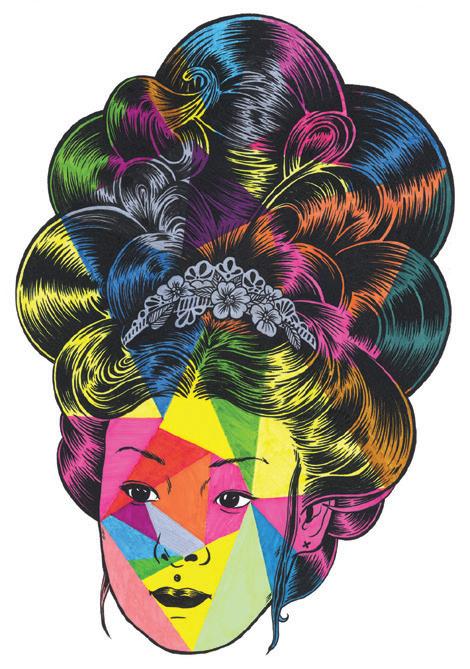
It seems fitting then, that this anniversary issue happens to contain the winners and two honourable mentions of our biennial Emerging Writers Fiction contest, judged this year by Zalika Reid-Benta, who published a story with us in the immediate wake of her debut collection back in 2020. Of this year’s contest winner, “Speaking in Regrets” by Owen Schalk, Reid-Benta said, “‘Speaking in Regrets’ paints a haunting picture of loss, grief, and heartache, written with a wistful clarity that ensures this story will stay in your mind long after you have finished the last sentence.” These emerging literary luminaries share the pages with established writers like Rob Winger, Shane Neilson, and Carleigh Baker, who is profiled in celebration of her latest collection of short stories.
Returning to the editor’s note from that first issue, Phillips wrote that “our goal is to share our enthusiasm for work that provokes, excites, and entertains—writing that makes you want to read more.” That remains our goal today, and we hope that when you put this issue down, you’ll find that you’ve been provoked, excited, and most important of all, entertained. Thank you for ten years of reading and here’s to ten more.
Best wishes, The HLR Collective
issue 1 volume 1 spring + summer 2014 $6.95 Priscila uPPal // fiction // poetry Wayson c hoy k r sten m c rea // art

 FLICKER, 2020 | STEVEN BECKLY
Image courtesy of the artist.
FLICKER, 2020 | STEVEN BECKLY
Image courtesy of the artist.

OWEN SCHALK
SPEAKING IN REGRETS
The first ghost came the night Dad burned the horses.
“They have to die,” he said, steam pushing through his cloth mask. “It’s the mammoth plague.”
The fire’s heat wormed through icy air. In the barn, the horses beat their hooves, squealed with terror. I pictured their eyes wide and shivering, flames tadpoling through the brown water of their irises. My gut churned. I could have saved them, I thought.
Mom had left a week earlier, but given Dad’s state of mind, you’d think she’d been gone for years. He gave up shaving. He stood at the window for hours holding a loaded shotgun. As soon as the radio spoke of a “zombie virus” released from a mammoth’s carcass in the thawing permafrost, he snapped. News reports said the virus wouldn’t reach Manitoba for months, but he was convinced it was already here, creeping through our horses and pigs and chickens, and that it would soon transfer to me or Grandma. “If one of you died,” he said, “I couldn’t live with myself.”
We were used to struggle by now. Soil erosion had ripped away our fields’ topsoil so nothing had grown for years. Annual droughts had depleted the aquifer under our house. We were forced to ration well water, every cup handled with the reverence of Christ’s blood. And the wildfires. When we stepped outside, we became scuba divers, geared up with goggles and cloth masks and toques to keep the ash out of our hair.
It was too much for Mom. “I have to go to Winnipeg,” she said. “My parents are scared. My sisters don’t know what to do. I need to be there for them.” Dad tried to talk her out of it. The situation in Winnipeg was terrible. We still had electricity in those days, so we had seen the news of ransacked storefronts and mile-long lines for gas. “I’m sorry, Mark,” she said, “but you’re lucky. Your mom’s here. My family’s two hours away.”
I had to make a choice: brave Winnipeg with Mom or stay on the farm with Dad. Even though I loved
Mom more, I picked Dad. It was safer here—predictable, at least. Who knew what Winnipeg had in store?
By then, Dad was close to breaking point. When she left, he shattered like a clay pigeon.
I had to make a choice: brave Winnipeg with Mom or stay on the farm with Dad.
I tried to talk him out of killing the horses. “We don’t have any bullets left,” I said. We’d used them up shooting the hundreds of bears who had migrated south fleeing the bush fires.
“Don’t need bullets,” he said, eyelids heavy, hair a rat’s nest. “Still have some gas left.”
On the night of the burning, Grandma was fast asleep. She’d been bedridden for two years. Dementia had eaten her brain, so she did nothing but speak to visions of Grandpa, dead a decade, and her little sister Doris, killed in a car crash at seventeen. The only time Grandma smiled was when Dad carried her to the barn to see the horses, to stroke their downy snouts and inhale the rooty aroma of their coats. Had she been awake to see the barn burning, she’d have lost whatever scrap of sense she had left.
The horses filled the night with snorts and squeals. I looked at Dad. In the darkness behind him, a sliver of blue light wriggled up from the ground. It opened into a glittering rectangle. I squinted. What the hell? The
OWEN SCHALK // 5

rectangle morphed into an oval. It grew appendages: two arms, two legs. Features surfaced: eyes, a nose, a mouth. Gleaming and blue, the ghost shone like water pierced by sunlight.
“Dad,” I said, disbelieving. “Grandpa’s back.”
Dad almost had a heart attack. He dropped to his knees and called, “Is that you?”
The spirit approached. His blue glow kissed our hands and faces, turning the smoke-choked farmyard into an aquarium tunnel. I had been a kid when lung cancer took Grandpa to his grave, but the old man looked just like I remembered him, apart from his aquatic shine: small eyes, wide ears, stubby nose nestled in a fat grey moustache.
Grandpa smiled lovingly. Then he spoke. His voice was as warm and sweet as it had been in life, but distorted, like he was talking into a tin can.
“I regret that I didn’t ask Suzie Hallward to dance in eighth grade,” he said.
We didn’t know what to say.
The old man looked at me, still grinning. “I regret that I didn’t buy Jack Hagen’s combine.”
Dad frowned. “Are you trying to tell us something?” He went to hold his father’s hand, but Grandpa was blue mist, ungraspable. “What do you want?”
Grandpa walked toward the house. As we watched him pass, he said, “I regret that I smoked a pack a day.”
We followed the ghost to the house, down the hall, into Grandma’s bedroom. She had little reaction to the sight of her dead husband. Just a nod and a smirk.
To say every country was wrestling with the fallout of environmental, economic, and social collapse would be understatement.
The last thing the world needed was ghosts. To say every country was wrestling with the fallout of environmental, economic, and social collapse would be understatement. They weren’t wrestling. They were fighting over a knife in the mud. In Canada, a mixture of wildfires and drought had put the country on the edge of famine—which, when paired with the toxic brew of viruses emanating from the melting Arctic, was driving the nation mad. City governments closed their borders to wildfire refugees, declaring they barely had enough resources to keep their current populations alive. Meanwhile, pipelines drained the last of the tar sands, while the RCMP arrested whoever still had the clarity of mind to protest.
Then, all at once, ghosts rose from the earth. Despite the constant stream of baffled scientists and paranormal experts on our TV screen, nobody could offer a rational explanation for why billions of spirits had arisen overnight, what they wanted, or why they thought the end of the world would be an appropriate time to make themselves known.
Likewise, there was no answer for why the ghosts spoke only of their regrets, from the most trivial (dropping a loonie down a manhole cover) to the most life-destroying (accidentally shooting their son with a crossbow). Regret was all the ghosts cared about. They had no questions for the living.
Social media still existed in those days. My feed consisted entirely of watery-blue ghosts saying “I regret this” and “I regret that” against backdrops of charred soil and smoky skylines. Part of me knew Facebook and Instagram wouldn’t last much longer, so I savoured those final days of mindless scrolling, the inexplicable warmth of cross-world connection. I learned the words for “I regret” in Spanish, French, German, Italian, Vietnamese, and more. I repeated them to myself as I lay in bed.
“Lamento.”
“Je regrette.”
“Ich bedauere.”
“Mi rincresce.”
“Toi hoi han.”
“I regret that I never renovated the kitchen,” Grandpa said.
Dad and I looked at each other. His jaw hung open. I’m sure mine did, too.
When my great-aunt Doris trickled up from the soil later that night, I was the first person she saw. She smiled at me and said, “I regret that I stole my sister’s sunglasses in tenth grade.” Then she looked at Dad. “I regret that I drove drunk.”
The night the ghosts appeared, Dad called Mom. In Winnipeg, the same thing had happened: ghosts rising through asphalt, sidewalks, bricks, linoleum tiles. Mom had already met both her deceased grandparents and her dead cousin. But the spirits were the least of her worries.
When I talked to her, she said, “It’s bad here. The looters, the gangs. We’re scared to leave the apartment. The ghosts are more annoying than anything else.”
OWEN SCHALK // 6

I grunted. I was distracted. “Listen, Dad’s losing it. He burned the horses. He wants you back here so bad.”
“I know, honey. Take care of him, okay?”
Take care of him? I thought. He’s supposed to take care of us
Days passed. A week. The ghosts didn’t leave. Grandpa and Doris strolled from room to room, stood over the burnt remains of the barn, intoning their regrets. When I wasn’t feeding Grandma, I hung out with the spirits. I had not yet lost my fascination. I listened to their tinny voices, studied the liquid ripple of their arms in motion, stood in their light to feel if it was hot or cold (it was neither). I wondered, why now? Why didn’t the spirits appear to us when we had the time and resources to analyze them? Perhaps the ghosts were like zombie viruses in the guts of mammoths, I thought, and as the global temperature climbed, pockets of frozen guilt melted and rose through the earth like steam. To tell us—what? How they wished they’d lived? Everyone wishes they’d lived differently. To use this moment to tell us that, when we living had much bigger concerns, struck me as somewhat selfish.
“Where did we go wrong?” I asked them. Doris said, “I regret that I didn’t curl my hair.”
“No, as a species. How could we let our civilization collapse like this?”
Grandpa smiled. “I regret that I didn’t ride horses with Hannah Graham.”
Dad lost interest in the ghosts. At first he was thrilled to see his dead father, but when he realized Grandpa wasn’t going to answer any of his questions about the afterlife, he went back to cleaning his shotgun or patrolling the barbed-wire fence.
I sat with Grandma, or the ghosts, or I looked at the family photos framed around the house. Mom and Dad’s wedding: Mom in a regal white dress with perfectly sculpted hair, Dad disheveled, a farm boy stuffed into an ill-fitting tuxedo. My first-grade picture, sandyhaired, missing teeth. My graduation photo, taken just five years ago, when we all pretended a solution was coming, a one-shot vaccine that would inoculate us against the end of the world.
Looking at the pictures, I wondered about my own regrets. I regretted that I didn’t spring for the limited-edition Cyberpunk 2077 Xbox. That I didn’t ask Sydney Fable out in high school. That I didn’t get to spend more time with Grandpa. Unexciting, I know, but when the ghosts came, I was twenty-four. I didn’t have a lifetime of mistakes to look back on.
On the twelfth day, we were used to ignoring the ghosts. Even I was sick of their self-absorbed ramblings, the endless stream of social media posts, the breathless news reports. It was driving us crazy. The next day, however, we received a distraction that made us forget all about the ghosts and the TV—though it was not a welcome one.
Mom died.
Dad had tried calling her all day. Since she left, they had talked three times each day, in the morning, noon, and evening. When she didn’t pick up, he assumed the worst. He paced the house, pulled at the tumbleweed of his hair. I heard Mom’s voice: look after him. I did my best to reassure him, but when her ghost dribbled up from the living room floor that night, dousing the walls with marine-blue light, there was nothing more to say.
“Linda,” Dad croaked. “No.” He covered his eyes. His lower lip convulsed. “W-What happened?”
When she didn’t pick up, he assumed the worst. He paced the house, pulled at the tumbleweed of his hair.
“I regret that I didn’t see Bowie in 1983.”
“Please,” Dad cried. “Not you, too.”
Mom looked at me, sweet brown eyes and a caramel smile. “I regret leaving.”
After two weeks, the ghosts disappeared. I saw it happen. In unison, Grandpa, Doris, and Mom looked at the floor, as though a bell had chimed, and drizzled between the grains of the carpet, sucking away the blue glow that had coated the walls for fourteen days. It happened everywhere on Earth at once.
I wondered, why two weeks? How had all the ghosts known to disappear after fourteen days? I didn’t know, and I never will. All I knew was that we were alone again—Me, Dad, and Grandma—and the world felt a little quieter. A little darker.
Dad was inconsolable over Mom’s death. He sat down in his chair in the living room and only rose to use the bathroom. I had to bring him food and water. After a few days, he began to speak in regrets.
“I regret that I didn’t go with her.”
OWEN SCHALK // 7

Creative Writing–Fiction, Creative Non-fiction, Poetry Correspondence Program
Looking for personalized feedback on your manuscript? Our 28-week online studio program is customized to address the needs of your booklength project. Work from the comfort of home under guidance of our exceptional faculty.
Program starts every September and Januaryapply now!
There is a story to be told here. humberschool

“I regret that I didn’t kiss her goodbye.”
“I regret that I didn’t die with her.”
The media was perplexed, but quickly moved on to the latest catastrophe, from the collapse of the Lockport Dam to the worst cyclone in Sri Lankan history, until the day the lights went out.
Inever thought I’d long for the days when Dad was burning horses, but I did. It was preferable to his sitting in his chair, watching TV news for the three hours per day we had electricity, the rest of the time staring at the black screen. When I asked him if he was hungry or thirsty, he answered with a regret.
I wondered how long I could endure being the only sane one in the house.
The responsibilities fell to me, of course. I had to prepare meals, I had to patrol and repair the fence, all while Dad sat in his chair, beard snaking down his chest. I was nervous about taking over his tasks, but I channelled my father on his best days, the stalwart man who kept the farm running as the earth boiled, as the land dried out, as the loan vultures circled our land. If he had found a way to carry on, so could I.
One afternoon, I noticed a section of wire fence trampled to the ground. Raiders? No, I decided. The fence hadn’t been cut. A branch had fallen over the barbs and an animal of some kind had climbed over. A bear? Maybe. I cocked the shotgun and went searching. There was a horse in the yard. Tall and black, a stallion by the looks of it. The animal was gorgeous. Its eyes shone like dark pearls. Even its hair found a way to glow through the smoke.
I went inside and told Dad. His eyes flashed, and for a second I thought he was about to share in my amazement. Then his face changed, and I figured he would reveal another regret. He didn’t. His expression fell and he turned to the empty TV screen.
I put a mask and goggles on Grandma and carried her outside. When she saw the horse, her body rumbled with laughter. “Oh, handsome,” she said. I carried her closer. Her pale, veiny hand trembled across its coat.
“On our first date,” she recounted, a glint of nostalgia in her voice, “Harold took us horse-riding.”
The stallion huffed, whirled its tail, and ran toward the trampled fence. As it sank into the smoke, I added a regret my list: I didn’t ride our horses one last time.
///
OWEN SCHALK // 8
forwriters.ca
ROB WINGER

THE LONG AND THE SHORT
The long and the short of it is that I don’t believe in the dusty space gods you’ve invented with outdated ex libris geography-book neckties, and I don’t believe in any neck-tied geographer who says they know for sure whatever they know for sure. I don’t believe in childhood teacups or grown-up tax breaks, in white teenaged punk, old-age bingo, or the kind of mid-life crisis that always ends up driving low-end automatic-only sports cars.
The long and the short of it is, in fact, that I most believe in this single kindergarten kid being scolded for going bonkers in gym class, who says he’s sorry but he just didn’t bring his walking legs today, or in the grinning dog chowing down her hundred discs of backyard rabbit poop, rolling greasy into marsh mud, then waiting with such utter admiration for me to bring secured within its plastic scoop these dried-out squares of kibble moulded by a factory in France.
Halfway across a main span, I can’t think too hard about dead or live loads or where the cantilever might have ended, about the plastic deformation possible in each latticed steel truss, how each suspender rope is only strong enough to hold us up when it ties itself to the main cables set atop each far-flung tower.
THREE POEMS
So the long and the short of the long and the short of it must be, then, that space-god neckties and running-legs retrievers won’t stop me from dreaming I’m teaching a class for which I’m unprepared, again, or you from thinking you’re naked in a wooden high school calculus exam, that my long-dead grandma or your long-gone father or another long-lost brother’s sister might return to us on the far subway platform or inside a pastel ICU room or maybe within the glinting heat of a winter greenhouse thick with germinating seeds; in those dreams, we know their messages will
absolutely solve, ad infinitum, every last necktie library geography, so we remember what they say with desperate urgent care, but just until the red alarm clocks we’ve prepared upon our white bedside tables announce, again, another morning’s finally made it.
ROB WINGER // 9
POLAR BEAR
If you should come face-to-face with one, back away (slowly at first), while peeling off your clothes one item at a time. The bears are very curious and they should stop, sniff, and perhaps play with each item as they come across it, leaving you free to run across the Arctic buck naked. Until they catch up with you, of course. Or you die of exposure. Either way—what an experience!
—“GET
NAKED, AND OTHER ADVICE TO FEND OFF A POLAR
BY PAULA FROELICH, NEW YORK POST, AUGUST 29, 2020

It wasn’t really a polar bear’s fur glistening through the gap in the dream’s staircase hammered closed as though it were a ladder leading to a still-sealed attic hatch. So this wasn’t the first episode of Lost. I got to the top of the wooden stairs, sleeping, saw its fur was dark, then carefully descended.
If approaching dawn or harnessing a dog, it’s a good idea, I’m told, to write what you know. But don’t harnesses signal that I pretty much know nothing? The trees, I might declare, are glorious. But each birch is rotting, too. We all need, um. Split your heart in two, et cetera, and, well. I’ve been married twenty years already and have never met a staircase polar bear for real. All the unsealed pine-high attic hatches are waterproofed with caulking.
Put a bell on your bike, they tell me, if you’re riding through these foothills; three cubs were spotted here just yesterday. And three blocks over, cherry-picker electricians have closed down the street to get an urban black bear down from some old Victorian’s weeping willow. So, I might as well forget that attic hatch. Step this way, the signs say, to find the zoo’s concrete underwater viewing station; down there, each huge drifting polar paw will press its claws, for us, right flat, full, against the porthole’s gleaming blue.
ROB WINGER // 10
BEAR ATTACK”

CONCRETE CREEP
I.
Not creep as in that old, eerie Radiohead hit, but concrete creep: the gradual, undetected ways our spines compress or discs slip while we hurtle rocks en route to the forest’s widest redwoods.
And not creep as in crêpe, as in pancakes or bright bunting, as in stopping short the office mail to stand atop its silver cart, declaring, just this once, the birthday cake might be for everyone.
Creep as in how the dirt keeps on getting under my fingernails, as in the forces slow-recorded in the sculpting of a river gorge, as in the wind’s play around cliffsides that turn each stone to the smoothest-ever suicide.
II.
In a prestressed concrete arch, concrete creep is “the continual contraction of the compressed material even when the compression load does not change.” So what we carry, we carry against our lungs, held within a locked-tight rib cage.
Out in the schoolyard, we remember, we parents, how our kids would climb the highest structures, if they could, steel and plastic, clouds and oak, then trust gravity to carry them all the way through an orange tube’s swoosh.
They’re right there, our kids, we might remember, decades gone, still emerging from the plastic chutes. Their mouths turn up the blueness of the air, the rustle of each blossom in the canopy above us, watching. This is their scent, back then. Their voices. And they’re gone, of course. Long gone.
We carry that compression, our children, still just kids, running from slide to stairs to start again, filled with grinning light, so possible, up as high as they can go.
Every single kid, the way they were, will disappear, creeping up our door frame pencil marks to pack away their Lego bricks. But they remain certain, too, those kids, for us, right here, against our lungs, compressed, still letting go the bar atop the plastic slide, still drifting down to earth as if their only future were the ground’s secure abutment.
ROB WINGER // 11
///

AGA MAKSIMOWSKA MONOCULTURES: AN ESSAY ON TENDER IS THE FLESH AND SINGLE-SEX EDUCATION
Walking home one late August afternoon from a new job, I cried so hard a young man offered help. I wasn’t mourning the loss of the old job, nor was I unhappy about the new one. Tender is how I felt when I left the institution where I started my teaching career, an all-boys private school that shaped much of what I thought and how I behaved, which is to say not tenderly at all.
And yet, even though I was a woman, I fancied myself one of the boys. A respected colleague told me early in my career, “You’re an alpha without being a bitch.” I was flattered, albeit uncomfortable. Here was approval from one of the big dogs, a well-liked veteran. Bitches taught at the school, but left prematurely, tails between their legs. I was an alpha: tall, deep-voiced, decisive, and sarcastic. I succeeded at teaching boys.
In the summer of 2022, when I left after eighteen years, something cracked. I felt wild and disoriented, exhausted and used up, like I had escaped captivity. Sure, I had also escaped the pandemic, but there was more to it. I was free. The boys’ school had consumed me and left me bare. I developed debilitating vertigo, which, after some investigation, turned out not to be a brain tumor or Ménière’s disease, but my body’s stress response to the change. A dam had cracked. It had been a stable, well-paying job with attractive perks: great benefits, small classes, generous colleagues, and international travel opportunities, yet it was toxic, taxing, and terrible for me.
At the new, gender-inclusive school to which I walked or commuted via subway—not by car, which I permanently parked—I suddenly had time to read. I was teary and brittle, unsure of how to behave in a more nurturing environment. I no longer had to be
loud and brash; in fact, I couldn’t be. People’s feelings got hurt. Personality traits that lay dormant for years were now in demand: patience, gentleness, kindness. It was then that I read Agustina Bazterrica’s novel Tender Is the Flesh and my healing began.
“This is your self-help book,” my partner marvelled. “A dystopia about cannibalism?”
“Isn’t single-sex private education a cannibalistic dystopia?” I joked.
No book in recent years moved me like Tender Is the Flesh did. In Spanish, the original language of the book’s 2017 publication, the title is Cadáver Exquisito, or Exquisite Corpse, a reference to the surrealist parlour game made famous by André Breton and Frida Kahlo. Translated by Canadian Sarah Moses in 2020 and released into the English-speaking world during the pandemic, Tender Is the Flesh, which won Argentina’s 2017 Premio Clarin de Novela prize, is about access and excess, about language and how it’s manipulated, which is perhaps why it spoke so powerfully to me, an immigrant ESL kid who taught wealthy boys English. “You’re the English teacher,” said one parent incredulously. “Those poor boys,” she said, exhaling dramatically as she looked me up and down. “Having to suffer through class with you around.”
Tender Is the Flesh is the story of Marcos, a slaughterhouse manager who recently lost a child and whose marriage broke up as a result. He is estranged from his sister and cares for a father with dementia. Marcos is an automaton, a skilled “stunner” responsible for the first strike in the killing of humans, or head, as they’re referred to in cattle terms. Marcos is also a teacher, instructing new recruits on how to initiate killing
AGA MAKSIMOWSKA // 12

so that the head don’t become spooked or nervous, thereby ruining the meat by making it tougher, less tender. Marcos observes that “teaching to kill is worse than killing.”
Marcos perpetuates the very system he criticizes, a system of state-sanctioned cannibalism, a population control mechanism that’s a response to a mysterious virus that wipes out all animals in this near future, a future that’s entirely plausible and possible. He observes that the slaughter of humans for consumption can be normalized only with automation, a process which is concealed with euphemisms. “There are words that cover up the world,” Marcos says. “Synonyms … the choice of one over the other speaks to a distinct view of the world.”
I spent my career teaching in a school that claimed to be a boys’ school “by intention.” I marvelled at that statement. As times began changing, some of the faculty advocated for referring to our charges as “students” instead of “boys,” but various stakeholders protested: they were ardent about “boys.” Much time, energy, and resources were spent studying, talking about, and disseminating information about how boys learn, what they need, how they develop character. Little was spent scrutinizing the fact that the whole exercise was antithetical to how education actually works or to the violence that’s intrinsic to the creation of a “boy.”
We do violence to ourselves to maintain power, to stay alpha, to be as male as possible. A former student who’s now in university recently emailed me and wrote, “I’ve noticed the horrified expressions on my friends’ faces when I tell them I went to a private boys’ school.” He’s having to do a lot of unlearning now. Those outside the system think it’s unbelievable, yet those invested in it hang on to it because humans love to be special, need to have something exquisite, different, rare. What’s stranger is that this archaic system with deep roots in religion shows no signs of going away. No matter how many gender task forces single-sex schools establish, it won’t change the fact there is a surge in interest in singlesex education. Why? Bazterrica has an answer: fear. Tender Is the Flesh is not a manifesto to convert readers to vegetarianism. In a country where, in Bazterrica’s words, “meat is religion,” special meat replaces animal flesh and is reserved for those wealthy enough to procure it. The rest of the dwindling population scavenges or feeds on flesh of prisoners or the very sick and old, certainly not special meat. Bazterrica’s message in her novel is that capitalism is cannibalism, and the fear of not getting enough, of missing out, of being left out, is what motivates humans to behave more and more despicably.
Bazterrica, who is a fixture in the Buenos Aires literary community, was a poet and short story writer first. In university, she studied art history. In high school, she and the other girls in her classes were taught exclusively by nuns, who ensured compliance in their pupils through control and terror. “Education is inherently violent,” Bazterrica wrote. “And plenty of women perpetuate patriarchy. You don’t have to be a woman to be a feminist.”
Bazterrica researched factory farming in great detail for nearly a year in preparation for Tender Is the Flesh. Monoculture may not work in the long run, but it’s terribly efficient and productive in the short term. It yields maximization, eases management, provides opportunity to exploit technologies and specialization, and produces higher revenues. It is a system that’s in complete service to capitalism, where profit is king and everything else is secondary. This brutal, violent novel could be an instruction manual for monoculture factory farming. “Nothing in the book is made up,” Bazterrica told me. “We already do all those horrible things to animals. I just made them happen to humans.”
In the ’90s, I attended and graduated from a large, public high school with a functioning auto body shop, an arts program, a smoking section out front, and murals everywhere. In the early 2000s, I was hired by a private school for boys where the annual tuition was more than my mother’s salary as an ESL teacher at one of the city’s several immigrant education cen-
A respected colleague told me early in my career, “You’re an alpha without being a bitch.” I was flattered, albeit uncomfortable.
tres. Students drove to school while I took transit, and instead of giving me feedback on my teaching, posted comments about the size of my ass on a website. In no time, sexual comments about me appeared with such frequency that my partner took to moderating the site and flagging them before I could read them. When I complained to a school administrator about being sexualized in that way, he shrugged, and later published an op-ed in a trade magazine about online platforms
AGA MAKSIMOWSKA // 13

giving students agency and expanding their voice. The insinuation was that I was complaining about compliments. Boys will be boys; they were off-gassing. I was popular, after all, and I enjoyed the popularity. Most kids liked my classes. I received nice Christmas gifts. But the male gaze at work made me feel captive. I felt like I provided an illusion of social change while, in actuality, changing nothing except parts of myself to fit in, becoming colder, more aloof, more violent.
I became estranged from my sister during my tenure at the school, a relationship that ended in part due to my overdeveloped aggression, a way of being I attribute to the climate of toxic masculinity I experienced at work. I was very good at classroom management and used my size and sarcasm to dominate. I was unapologetic for having zero patience and plenty of bravado. I was the same with my family. Other female teachers were made to complete classroom management workshops, while I attended a Master Teacher conference in year ten.
“You condone what you tolerate,” said a wise friend to me once.
I felt like I provided an illusion of social change while, in actuality, changing nothing except parts of myself to fit in, becoming colder ... more violent.
I could condone a lot, but not the near constant homophobia that a boys’ school breeds. The jokes, putdowns, and slurs were too much. I live a privileged, heteronormative life of a cis-woman who’s married to a cis-man, but there’s more dimension to my sexuality than I’ve discussed at work or in my writing. At school, I was known as a fervent supporter of gay rights, so when yet another student privately came out to me, a colleague and I decided to put rainbow stickers on classroom doors. We saw no harm, only an opening for discussion. We organized youth-led workshops on inclusive neutral language and educated on creating safe spaces. In no time, I was hauled into an administrator’s office. I was twenty-nine then. I was reprimanded until I sobbed, asking profusely for forgiveness. “Next time,” the administrator warned, “ask for permission. That is not how things are done here.”
Those words struck me. That is not how things are done here. I had to submit to the system, all of its rules—spoken and unspoken—norms, traditions, and expectations. A system works hard to protect itself, like any organism, adaptable yet resistant to change.
Tender Is the Flesh is a nose-to-tail narrative that creates a framework to justify a moral pass. The mysterious virus-infected animals and birds are a threat to humanity. The only way to ensure humans get enough protein in their diets is to eat special meat. Slavery is illegal and punishable by death; slaves provide labour, not food, whereas cannibalism is not only legal but encouraged. No vegetarians or vegans in this world. Some families even keep head in their homes, carving out pieces for dinner while the head is still alive, the meat freshest and most tender. The contradictions and paradoxes, which are the building blocks of dystopia (“Freedom is Slavery,” etc.), are what make Tender Is the Flesh entirely engrossing and infuriating.
At the boys’ school, we talked of diversity and inclusion while excluding much of the population. We focused on character education while ignoring reprehensible behaviour and condoning violence. We celebrated leadership and innovation while making very little structural change. Every few years, a scandal made the news about some boys’ school, something terrible and depraved. We held staff meetings. We were outraged. There was commentary and calls for change, but the news cycle marched on and the pillars of tradition and excellence remained firmly in place. The locker room sexual assault at St. Michael’s College in Toronto or Supreme Court Justice Brett Kavanaugh’s yearbook comment at Georgetown Prep are not altogether different from what happens at all boys’ schools, but boys’ schools haven’t been cancelled.
When I turned thirty, an administrator suggested I get married and have kids so as to be less restless, less flaky, more tethered. My low-grade activism was getting annoying to those tasked with managing me. Parents grumbled about the feminist agenda in my classes. As women age, the childless ones become dangerous, deviant, distracting. It’s time for our makeover from sex object to mom. This is when the bitches quit, but since I was an alpha, I got married, had kids, and stayed for another decade.
Bazterrica plays a lot with sex and sexuality in Tender Is the Flesh. She wrote the novel as commentary on the insatiable nature of capitalism, to make a statement about how we’re essentially devouring each
AGA MAKSIMOWSKA // 14

other in this exhausting race for more and more and more. But unlike me, Bazterrica is not apologetic about her feminist agenda. Women figure prominently in the novel as heroes, villains, victims, and everything in between. One is Marcos’s social-climbing abhorrent sister; another is a cold, unfeeling butcher. A Mengelelike aging scientist experiments on the silent head whose vocal cords have been removed so they can’t protest. The last, and probably most important to the narrative, is a female head that’s gifted to Marcos by a wealthy breeder.
Marcos calls the gift Jasmine because of her strong, intoxicating smell, which reminds him of the flowering plant. From that moment on, she’s no longer cattle, but a kept woman. Marcos observes that “her beauty is useless. She won’t taste any better because she’s beautiful.” Her wildness and naturalness are a contrast to the sterile and clean slaughterhouse, and in the strange relationship between keeper and the kept, Bazterrica creates a great deal of tension that propels the action of the novel forward. A profound sense of discomfort follows the reader whenever we encounter Jasmine and Marcos; questions swirl in our heads. We walk a fine line between rape, captivity, slavery. Marcos pushes the boundaries of what’s permitted in the system he inhabits. He has sex with Jasmine, yet the only real affection and intimacy in the novel happens between Marcos and a pack of wild puppies in an abandoned zoo. Bazterrica is clear here that the loss of animal life has profound implications to human life, and tenderness is not only defined by sex. In the end, Marcos uses Jasmine to heal himself of his grief, and in the process, betrays the reader. We follow him through the narrative as an antihero critical of everyone and everything, but he profoundly disappoints us at the end. All he cares about is his grief, the wounds he wears. He’s as selfish as we all are, a product of our capitalist values.
The most striking character in the novel is the butcher, Spanel. A real alpha. Bazterrica based Spanel on a 2005 photograph called “Carnicera” by Argentinian photographer Marcos López. A dominatrix type whose “intensity makes [Marcos] uneasy,” Spanel is Marcos’s lightning rod. Without her, he would lose his mind, like his father lost his when the animals died. Spanel has an assistant whose gaze is that of a dog, one of unconditional loyalty. She keeps men in her shop like she keeps the meat. She dislikes smiles because they show a person’s skeleton. She smokes and drinks so she will taste bitter when her turn comes to be sold for meat. She threatens to try one of Marcos’s ribs. The
two of them have conversations that are prohibited, which makes them deviants. Marcos needs Spanel to stay sane in an insane world, yet “there is something about her he’d like to break.”
Jasmine and Spanel are foils for each other. Marcos is turned on by Jasmine, only to lock her in his barn, drive to Spanel’s shop, and have ravenous, violent sex with the butcher, intercourse so full of rage that he finally breaks Spanel and makes her scream. She produces a single brutal, dark cry. The reader wonders whether Marcos rapes Spanel. Her assistant wants to save her, but the door is locked, so he can’t. The climax of the novel is literally a climax; Spanel orgasms amid a blood-spattered cold room, her consent delayed for the reader’s discomfort, mingling with questions about our own purpose, desires, and plan.
Aprivate school, like every other capitalist enterprise, is violent, insatiable, always adding new initiatives, increasing competition, elevating the stakes, improving the marketing, adding accolades: on and on it goes. It’s utterly exhausting. After reading Bazterrica’s novel and transitioning into a less segregated work environment, I wondered: “When do we ever apply our creativity to accomplishing less, to doing less, to reducing, paring down, as opposed to always striving for more? Where do we employ our
When do we ever apply our creativity to accomplishing less, to doing less, to reducing, paring down, as opposed to always striving for more?
best and brightest, use our talent, innovation, and education in the name of restraint, constraint, moderation, lack? How can we do less harm?” I am not sure. I have no answers, only questions. I suppose that’s what the next eighteen years in education will be about: unlearning, undoing, recalibrating, rebuilding my lost relationship with my sister, and teaching my own children in a more tender way.
///
AGA MAKSIMOWSKA // 15
HEADS UP (INSTALLATION VIEW), VINYL PRINTS AND GLAZED CERAMICS, 2023 | STEVEN BECKLY Image courtesy of the artist.



LYNDA WILLIAMS BERMAN
To be clear, I don’t understand what Heraclitus meant about opposites. I still need to read that shit.
—ERIN
That summer I read Natasha twenty times trying to figure out how it worked so I could evoke a similar response through a narrative told from her perspective. The problem was that I had both more and less power than she did. Basically, I had more in common with Berman and I was too stupid to know it. At least that’s how I read it now, when I look back on those pages, brimming with feminist defiance and misunderstanding of the agency Natasha actually had.
I was living on the top floor of a four-storey walk-up in a bedroom that was technically a closet. A walk-in just large enough to accommodate a twin bed and the three cardboard boxes that contained all my personal effects. My roommate, Amber, had a lot of sex and I didn’t have a door to shut, so I spent every spare minute at the library, quietly defacing a hardcover edition of Natasha with copious marginalia, a dull HB2 pencil my weapon of choice.
At the time my friends were decorating their walls with Nickelback posters, meanwhile I had a massive cork board with annotated index cards of the story’s arc.
“Isn’t this what serial killers do?” Amber said, squinting at the inverted question mark.
“I’m writing about one of those, too.”
“No shit. It’s $27.38 for the phone bill.”
“Didn’t we just pay it?”
“It comes every month.”
I was pretty sure the utilities came every time she needed extra cash for E, but I was only paying $150 for the closet, so I had no complaints.
Unlike Amber, I didn’t have a lot of boyfriends. J.Lo and Beyoncé had confidently led us out of heroin chic, but taking up space was the least of my problems.
It was my mouth that got me into trouble. My uncle had nicknamed me Bumble Bee for the invective I’d been spouting since I could speak. I’d made up my mind in middle school that if having a boyfriend meant pretending to know less than I did, then I’d rather listen to my whole class call me a lesbian at recess. I could ring my own bell, even with guys that’s mostly how I finished, and really, if Betty Friedan had devoted more time to masturbation, it would be an entirely different feminist landscape. Can you imagine what the world would be like if men hadn’t benefited so directly from the sexual revolution?
Right there. That’s the kind of question that caused problems. You’re not supposed to ask that when a man is undressing you. But seriously, this dude tried to impress me by unhooking my bra with one hand. Make me come before you do. Maybe do it twice. That ’s impressive.
So I was single and having all the orgasms my partnered friends whined they weren’t getting, and I was utterly immersed in my schoolwork. I wanted to pursue graduate studies, and I was using the summer to get a head start on my capstone project. Beyond an MFA, I had a five-year plan. I was going to give Alice Munro a run for her money, and I was going to do it before I turned thirty.
“Y
ou can’t do that.”
The voice startled me. It was Saturday, the library had barely opened and I was sure I was alone, leaning against the pillar, marking up the dialogue between Berman and Rufus. I looked up at the speaker. He was about my age, tall and good looking, despite the bleached hair and dark goatee. He was wearing a white-and-blue pearl-snap shirt that I instantly wanted to borrow—I knew it would look better on me since I had tits to fill out the pockets—and by the colour of his
LYNDA WILLIAMS // 17

face, I could tell he’d clocked that I was wearing my Spray Lake Sawmills T-shirt without a bra. I tucked my pencil into the book to mark the page.
“You work here or something?”
“No, but—”
“Then you can’t tell me what to do.”
He folded his arms over his chest. “What if everyone did that?”
He understood the categorical imperative. Good for him.
“How would you like to read a book covered in someone else’s crap?”
“It’s not crap.”
“You didn’t answer the question.”
“Not everyone is so poor they can’t afford their own copy of Natasha.”
“So you think you’re special?”
“I know it.” I gave him a little shove to signal the end of our conversation, but he didn’t leave. “Have you even read it?”
“Of course. Would I care this much if I hadn’t?”
“I don’t know. You seem pretty intense.”
A librarian finally poked her head through the stacks to shush us.
“Come on.” He took the book from my hands and tossed it on a shelf.
I’m not sure why I followed him. Some combination of pheromones and a desire to steal the shirt? Probably because I thought it would make a good story. While Amber collected notches on her bed post, I was busy collecting strange experiences I hoped to weave into fiction. My young life had been uneventful in a way that troubled me as an aspiring troubled artist. How would I write without memories that tortured me? I wasn’t the first young woman to underestimate her imagination.
He took me to a diner on Spadina. He must have been a regular because nobody came to take our order, but someone showed up with two plates of scrambled eggs minutes after we sat down.
He told me that he’d seen me marking up the book before and that he’d read my notes. He knew I miss-shelved it on purpose so others wouldn’t find it.
“Why are you so obsessed with Bezmozgis? Are you Jewish?” He tightened the cap on the salt shaker and sprinkled a little into his palm.
“No, and not Bezmozgis. Just the story.”
“Why?”
“It’s a fucked-up piece.”
“If you think the story is effed up, what does that say about the person who can’t stop reading it?”
I drove my fork into the eggs. “Doesn’t it make you angry?”
“No. It’s moving.”
“Have you ever considered that we’re empathizing with the wrong person? Berman almost makes you forget she’s being exploited.”
“She initiates everything.”
“She’s fourteen. She was groomed.”
“Don’t you think she knew her currency?”
“Is the power even hers if it’s contingent upon the desire of men?”
He shrugged. “Too bad you weren’t in my English class last semester. The discussion would have been a lot more interesting.”
I pushed away my plate and reached for some crumpled bills in the pocket of my cut-offs. Whatever story I thought I was chasing wasn’t unfolding at this two-top.
He waved me off. “It’s on me.”
“I’m not in the habit of letting men pay for my food.”
“Then you’ll be happy to know it was on the house. I work in the kitchen.”
The next time I saw him at the library he gifted me his copy of Natasha
“Don’t read into it. I usually sell my textbooks, but the novels don’t bring much.”
I quit going to the library and took my work to a coffee shop because I thought it would be weird to see him again. A week into my new routine I was rereading “Tapka,” the first story in the collection, when I discovered a passage underlined in blue ink. In the margin it read: “I stopped here, when I understood what would happen to the dog.” I flipped through the rest of the book searching for more blue ink. There wasn’t much. In the white space on the final page of “An Animal to the Memory,” he had scrawled: “Write the story only you can tell.”
I shoved the book in my bag and walked to the diner where I took a seat on a vinyl stool at the counter and drank three cups of coffee while I waited for him to come out of the kitchen.
“I missed you at the library.”
I held up the book. “Some asshole gave me his copy.”
“Some asshole?”
“You never said your name.”
“Brandon.”
I tried it out. It had a boy band vibe I didn’t like. “Nah. You’re a Berman.”
“What does that make you? Natasha?”
“Christ, I hope not. Pretty sure she’s my roommate. You should meet her. We’re having a party for her birthday.”
LYNDA WILLIAMS // 18

The party was being held at a loft in Yorkville. It was hosted by one of Amber’s wealthier conquests, so there was champagne and the coke was inhaled off marble countertops. I was pretty sure it was going to end in some type of orgy. Berman was the only thing that made attending this type of event tolerable. If nothing else, he made intelligent conversation.
Amber was bounced from knee to knee like a baby, flaunting her red dress without underwear with a carelessness that made me question whether I was actually a sex-positive feminist.
I caught him staring. “You want to fuck her?”
He didn’t answer.
“It’s okay. Most men do.”
He frowned. “Want to?”
“No, fuck her. You can say the word.”
“I don’t have to. You say it enough for both of us.”
For a second, I thought he was going to kiss me. Instead, someone backed into him and he spilled his Grasshopper on my shirt.
“Jesus, Erin. Do you ever wear a bra?”
“In service of the patriarchy?”
“No, like a public service.”
He set his empty glass on the ledge and surprised me by handing over the pearl snap he wore over his T-shirt.
“You know you’re never getting this back.”
He draped an arm over my shoulders. “We’ll see about that.”
Not unless you take it off me
A few shots and a few hours later, he did.
I brought him back to the closet and when he turned on the light, he discovered how I slept. The bed was unmade and at the bottom there was an arrangement of books, legal pads, index cards, highlighters, and pens. He cleared the mattress by giving the sheet one swift yank.
In the morning, I resumed my work while he slept. When I looked up from my legal pad, he was watching me.
“So why do you keep reading this story?”
“It’s for my senior thesis. It’s creative. I’m rewriting the narrative from her perspective.”
He reached for the pad, but I swatted his hand away.
“How far along are you?”
“So far it’s mostly research. I’m trying to emulate the voice and form—the opening paragraph with the short declarative sentences, the deadpan dialogue, and that final arresting image.”
“But if it’s her story, shouldn’t the voice be different?”
“Sure. That will come through in the content. I’m just talking about the form.”
He nodded but didn’t seem convinced. I half expected him to say that form is content when he asked, “What’s it called?”
I sighed. “Berman.”
“Yeah?”
“Berman. That’s the title.”
His face broke into a grin. “So it’s about me?”
“Fuck off. It’s a coincidence. I promise.”
“Sure, sure,” he said, sliding off my underwear.
I’d spent the previous summer planting trees and fending off mosquitoes in Northern BC, so my primary goal that year was air-conditioning, and I found it as a file clerk for Kirkpatrick and Associates. It meant wearing a bra and stockings under my professional garb, and next to having sex, Berman liked nothing better than watching me get dressed as I complained about the oppressive significance of each item before putting it on. It was backwards porn and no sooner than I zipped my skirt he’d be driving me into the wall and pushing the fabric over my hips. Nothing says professional like showing up for work with tousled hair and toting your underwear in your purse.
There wasn’t much. In the white space on the final page of “An Animal to the Memory,” he had scrawled: “Write the story only you can tell.”
We fell into a routine. I brought my work to the diner and he brought his books to my bed. The only source of contention in our relationship was a spiral bound notebook devoted to my thesis. I wouldn’t let him read it. I’d copied the full story twice to pick up its rhythm and cadence. One day I left the closet to grab orange juice and returned to find he’d helped himself.
“That’s mine,” I said snatching it.
“Is it?”
Was Judas so casual?
“You can only go so far imitating another writer’s work. At some point you have to find your own voice.”
“I’m learning.”
“Learning or hiding?” He took the book from my hands, speaking more softly. “It’s not a prayer. You don’t have to recite it.”
LYNDA WILLIAMS // 19

I reached for the notebook, but he held it above my head.
“So that’s it. You’re jealous. You think I should be giving you head instead of practicing my craft?”
“Your craft? Pickling your brains in the holy water of David Bezmozgis isn’t practice. It’s procrastination. You could have written an entire book in the time you’ve spent on some dumb story about another writer’s character. You think you’re such a feminist, but all you’ve done since I met you is try to replicate some famous dude’s work.”
I almost interrupted to remind him Bezmozgis is Jewish, so the holy water wasn’t apt, but I didn’t get the chance. He shoved the notebook into my hands and left. But not without telling me I was a dick envier and the absolute worst.
He called twice afterward to apologize. I deleted the messages, and I was more annoyed than surprised when I ran into him a week later, leaving our apartment with his jeans half-zipped.
“How was it?”
He winced, as if I was the one hurting him. “Fuck off, Erin.”
It impressed me a little how he said the actual word. And when I think of Berman now, I like to believe I changed something in him, even if it was just a tiny aspect of his vocabulary. So what if I wasn’t his Natasha with my fingerprints on everything he went on to achieve? Berman didn’t alter the course of my life either. There was no murder. No new identity. I didn’t change schools, or clothes, or cities. I did change my sheets and my thesis—it became a critique of the portrayal of women in Bezmozgis’s work—and I graduated with honours. So maybe I do owe Berman something, but one final blow job behind the stacks at the library and a pitcher of draft would cover it. I have my own body of work now, full of Natashas and Bermans sparking off each other and living inside the minds of people I’ve never met. The characters you’re reading about don’t exist. Or maybe one summer they fucked a lot inside a closet to give you this.

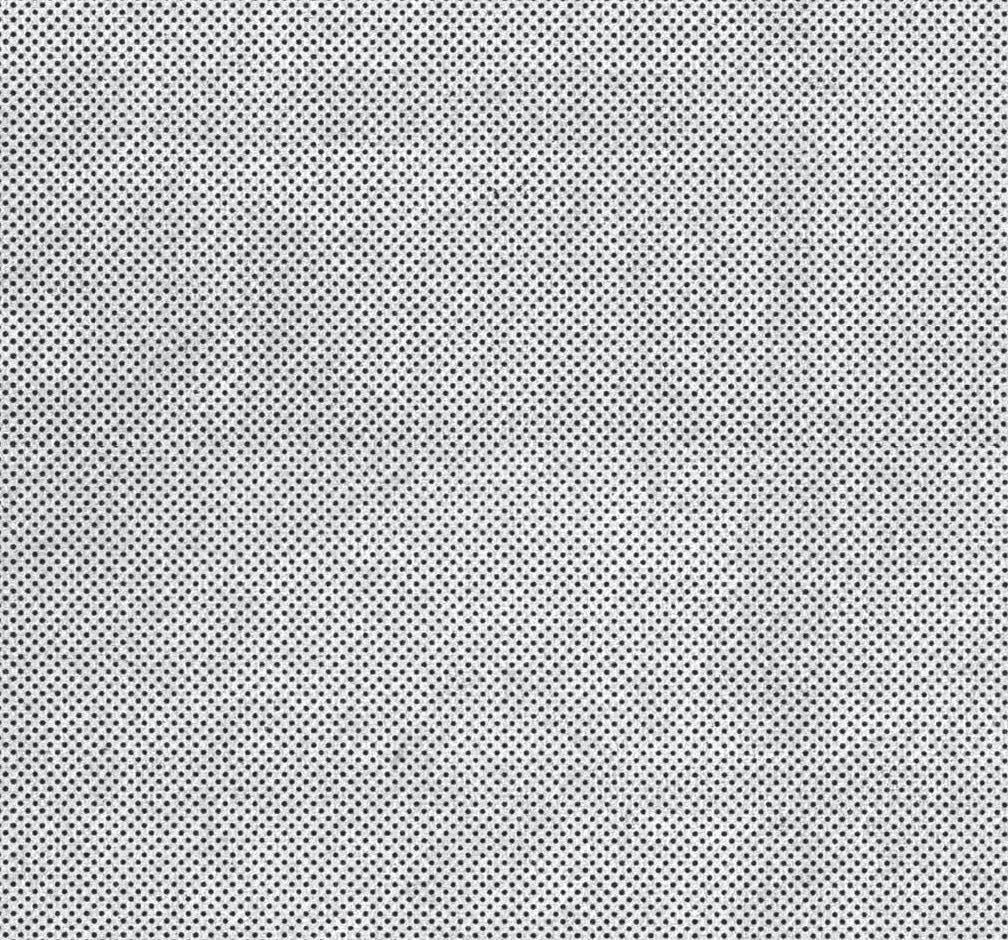

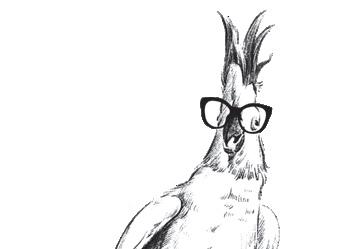
SHANE NEILSON // 20
TheAmpersandReview.ca Reading for pleasure. Writing for everyone. ISSUE NO .6 OUT NOW! SUBSCRIPTIONS & BUNDLES AVAILABLE ONLINE INSIDE ANNICK MACASKILL • MEGHAN KEMP-GEE • LISA WHITTINGTON-HILL • MICHELLE BERRY MIEKE DE VRIES WHITNEY FRENCH SHANE NEILSON ADAM WILSON MATTHEW GWATHMEY SOPHIE JIN MARK TRUSCOTT CATHERINE OWEN KELSEY GILCHRIST SENKA STANKOVIC No. 6 Ampersand Review THE OF WRITING & PUBLISHING a conversation with CANISIA LUBRIN GETTING TO THE HEART OF THE THING
///
SHAUNA ANDREWS

TWO POEMS
THESE THINGS THAT HAPPEN NEVER HAPPENED AT ALL
tough bones, translucent teeth, pale with thin hair, greasy slight skin, just like me
when she was thirteen she thinks she maybe kissed a boy and when she did he held onto her face firm but soft and it thrilled her she could taste the pot smoke in his mouth and smell the urine rising from the back alley stoop they stood on she felt so small as he backed her into the corner he eclipsed her she could no longer see the light of the fairground when he pressed into her she felt his cold fingertips graze her bare abdomen as he slipped the hole of her jeans loose from its button it was then she broke away from his lips looked down gently took hold of his wrists and pushed him back it was then he began to laugh first softly then madly called her a slut and walked off shaking his head and she was left alone in the dark
in my dreams he was tall, and moved his arms wide skinny but strong clothes baggy and hanging from his wiry frame
he had experience a crackling voice *whiny, but not high pitched
|assertive, maybe to me anyways I believed him, believed in him|
we would traipse down the street and I’d feel safe, even at night only because he let me
and even though his fingers were long his body was warm, still a boy, crooked lips cloud-like complexion
and even now he exists somewhere in limbo waterbed waving leaving cricks in the necks oh yes, of even us young ones
SHAUNA ANDREWS // 21

TO KNOW THEM
I.
In high school my best friend had an older brother.
His name was_____and he died after she and I stopped being friends (we drifted apart. You know how it is).
When I heard_____passed away, on his couch at 31 lips blue, gauzy white foam escaping his mouth (I know this because they said in the newspaper) I felt sick.
I pictured_____back then head shaved eyelashes long under a hooded gaze teenage body tall and soft and draped in oversized cotton kind to me, but sad, always sad. Eyes sad. Shoulders sad.
When I saw my old friend at a bar a few months later I told her over the blaring music that I was sorry to hear about_____. She said, it’s okay (but I don’t believe her).
II.
My co-worker’s boyfriend died this year.
He’d been laying there for hours when she found him (it happened sometime in the night).
I’d served_____a burger and a beer once or twice but I didn’t know him. I knew her.
She didn’t know he was using. He was 32.
III.
_____was my mom’s cousin I liked him even though his presence was alarming. Not because he was loud or unusual or bold (although he was all of those things) but because he always needed a wash. And a haircut.
Wore torn shoes. Was missing a finger.
_____died alone in a motel room in another province a couple years ago. He was old but not old enough to die. 56 isn’t old enough to die.
_____left behind our family and a son with FAS whose mom is also dead, but when we talk about we try to laugh because _____has a legacy so full of good stories because he was funny. And dodgy. And fearless. And loved.
SHAUNA ANDREWS // 22

This week my partner’s nephew,_____ died. The two of them were close in age and grew up like brothers.
The drugs stopped his heart at 33 (he would have been 34 at the end of the month).
Everyone thought_____was getting better— his whole family (it’s a big family) and his friends.
My partner is angry and sad and I am sad for everyone.
When my niece’s mother died her mom was 35. My niece was 16. It was 2018.
_____had a tall frame that was found early in the morning on the kitchen floor. She spent four days in a coma before they said, “you have to let her go.”
_____loved art and her daughter but didn’t know how to do it anymore.
The machines made her look like she was breathing even though she had left a long time ago. No matter
that we expected death to arrive in this form to take her.
Real life is different.
Seeing_____laying still you could finally grasp her youth her olive skin her open sores her chipped nail paint.
SHAUNA ANDREWS // 23
IV.
V.
SHANE NEILSON

 ROADSIDE ATTRACTION, 2020 | STEVEN BECKLY
Image courtesy of the artist.
ROADSIDE ATTRACTION, 2020 | STEVEN BECKLY
Image courtesy of the artist.
In the Nova Scotia Hospital, I am named bad
even though I want to die, want to jump from a height, and, just a week later, will do exactly that. The psychiatric staff consider me merely parasuicidal and write in the chart zestfully of my charged interactions with staff, my disdainful attitude and small resistances, concluding in each of their notes:
Cluster B.

This lyric essay is not a critique of the professional opinions diagnosing a personality disorder, nor is it a celebration of the supposed disorder itself as it was/is applied to me, for I have a number of concerns about its name, history, and the reception of that diagnosis in medical culture, not to mention its applicability in my own case—a physician. Instead, this essay is an attempt to understand how we describe people who are suffering and how we might care for them better.
I have no memory of being on the ground. I am told later by my wife that circumstances would have been slightly different, say, having hit the pavement a little to the left, where a pole of metal rose. But my wife pulled me back by my belt, and then my arms. Had she not, perhaps I would have gotten my wish.
Do I sound like an embittered member of the psychiatric survivor movement? I hope not, because the overlap between borderline personality disorder (or BPD, existing in the proverbial Cluster B of the DSMV, short form for Diagnostic and Statistical Manual of Mental Disorders, Fifth Edition) and bipolar disorder is significant, making accurate diagnosis very difficult. Not only do 15 percent of borderline personality disorder patients get rediagnosed later as having bipolar disorder, but the expression of symptoms when unwell can be remarkably similar. Think of the staff at the Nova Scotia Hospital encountering two fractionally different shades of red. Say, candy and rose. Some take one look at rose, and, based on their own sweet tooth, they write down
candy
in the chart. Then they see candy all day, every day, because they have decided:
candy.
I try to throw myself through the glass of the eighth floor of a different hospital.
The key component of bipolar disorder is periods of highs and lows of affect that are outside the norms of variability. The key component of borderline personality disorder is an unstable mood. They share mood instability as their pathognomonic symptom. A patient can have both. I have routinely encountered patients whom I have suspected had borderline personality disorder, yet there was a tinge, a nag, that there was another underlying factor for their presentation. I have also frequently seen patients with bipolar disorder who do less well on medication, whom I suspect (based on taking a careful history of their childhood) of having concurrent borderline personality disorder.
An orderly from the emergency department pulls me back from a concrete rampart where I would have fallen over forty feet.
The problem at the bottom is twofold. First, the similarities and borderblurs between these two diagnoses; second, the fact that both diagnoses are more likely to occur if a child has a traumatic upbringing. Children who face adverse events develop a certain stance to the world, an oppositional and reactive one, often because they were never heard or soothed during their development. What normies might call
drama
in the dysregulated acquaintance is not the acquaintance’s perpetual dress rehearsal for life, a simulated scene the sufferer casts themselves (and everyone around them) in.
Drama is, for some severely traumatized people, the only way to get through the day because the minor excitements of the present, no matter how self-created, pull the self away from the real pain of the past.
SHANE NEILSON // 25

From 2004–2006, I unmake the makings of my Cluster B status, the judgement of self, I agree, is bad—
because I am bad,
I am repulsive, no one can love me—by meeting with Dr. J once a week for an hour or two, depending on his availability and the progress made in the moment. Rumpled, with tousled hair and a huge paunch, always wearing a blue dress shirt that could use one more button done up on the neck, the doctor provides simple medicine: he listens. I talk. Like most bad
people, I have few others in my life who will listen, and those who do quickly become overwhelmed. Negativity builds into a whirlwind, throwing everyone out of proximity. When I complete a sentence or two in his office in the Homewood, he laughs and says, Really? He means, Why are you looking upon this so negatively? Why are you being so hard on yourself? Maybe what happened was just a step along the way, a lesson. Of course, I resist, thinking, No way. I’m bad.
You’re wrong. What’s true is that I am bad.
To the layperson, the term “borderline” connotes a tendency to tip into psychosis, given the right conditions. Just push a borderline a bit too hard, and they’ll behave crazy.
As it happens, this impression has both a substantiating historical basis as well as contemporary, real-world validation. In terms of history, the name was coined by Adolph Stern, an American psychoanalyst, who in 1938 built on Freud’s conception of both “neurosis” and “psychosis” to synthesize a condition felt to be on the border between both. From the beginning, the diagnosis—quite different than the one that evolved to the present day—was felt to be rooted in a traumatic childhood. Stern hypothesized that “it is not that these patients are exposed to specific
experiences, sexual or otherwise, which are in themselves of a necessarily traumatic nature, but that their environment is […] so traumatic that when they are exposed to such experiences they react to them as if they were traumatic.” In a very perceptive moment, Stern identified poor parental attachment and modelling in both mothers and fathers as a contributor to the development of BPD. In a very real way, the disorder is characterized by neglect, intermittent to absent attention, a severely critical and shaming parenting style, and serial rejections of the child. Today, a more complex formulation reigns: a genetic predisposition (in twin studies, BPD is highly heritable) in conjunction with a traumatic environment (including the aforementioned parenting deficiencies) is thought to create the condition. Since Stern, the diagnosis has undergone many reconceptions. Initially, these revisions concerned the element of psychosis, and the thinking was that BPD was somehow a relative of schizophrenia. As more time passed, the diagnosis was refined in terms of behavioural description, and the core traits of what we know as the diagnosis today were described. Of particular interest is the fact that the most significant recent change to the diagnosis in the DSM-IV in 1994 involved the addition of the following criteria: the presence of transient, stressrelated paranoid ideation or severe dissociative symptoms In this way, history closes a loop and the border blurs once again between neurosis and psychosis. The preservation of the name to the present day is an accident of history, a name echoing forward to the present even though it contains little (but not quite zero) descriptive usage. A better name is “emotion regulation disorder” because it accurately conveys the central symptom of the condition and is less pathologizing. Surely everyone can be a little emotional; what is unusual about going to the bar and getting hammered after being informed one’s wife wants a divorce? That one’s partner has just died in a car crash? Everyone seems susceptible under that kind of signalling rhetoric. Whereas people on the
borderline are scary, just a hairsbreadth away from pulling a trigger.
Dr. J doesn’t adopt a posture of certainty. Rather, he models openness. I start to question not only how I am bad, but if I am bad
SHANE NEILSON // 26
at all. If I utter such doubts aloud—like, I wonder if I just did the best I could, under the circumstances?—he smiles and says, It’s possible, isn’t it?
The story of Dr. Marsha Linehan, the creator of Dialectical Behaviour Therapy (DBT), is quite well known in psychiatric circles. The short version is this: Linehan often received acute psychiatric care when in distress with BPD, including electroconvulsive therapy and carceral care. Her many negative encounters with physicians—invalidating, pathologizing, and harmful—spurred her to become a clinical psychologist to study the condition and develop a therapy for what was felt, at that point, to be an untreatable condition.

Once, when an exchange is particularly charged, when his gently arch and skeptical attitude isn’t enough to dampen my affect, Dr. J says, Imagine you have a friend who is going through the same thing as you—exactly the same. He had the same childhood. He has the same mental illness. He’s on the same kind of medication. He has a wife and a child, and he’s not working either, because he’s so unwell. What would you say to him if he were in your situation? Me: I don’t know. I never know what to do. Dr. J: Okay. Let’s start at the beginning. What’s his name? Me: I don’t know. I don’t have any good friends. Dr. J: Make one up. You choose. Feeling disdainful of the idea of imagining a friend who never was, and who would never be, I say, Ernesto! Laughing, he says, Okay. What do you say to Ernesto? He’s really hurting. Words come to me because for some reason I naturally care for this imaginary being, just like I care for all beings other than myself. Why should they suffer? Why should anyone suffer? Why must it be that they are in pain? Surely something could help them, a word, an action? I say, Ernesto, I know that it’s hard now but it … will get better? I speak uncertainly, speculatively. That’s not bad, he says.
My most symptomatic BPD patients despise emergency departments. The reason is simple. Healthcare workers in such places are negatively predisposed to chronic mental problems that require intensive, long-term assistance. They tend to be disgusted by self-harm burns and lacerations. They feel like the parasuicidal waste their time, or worse: one study found that 89 percent of psychiatric nurses described BPD patients as manipulative.
Perhaps the most dear injury comes not with outrageous disdain or criticism, but with the all-toocommon endemic invalidation: BPD patients do not feel they are being heard or believed when they seek care. Once again, reenacting the processes of childhood, authority figures neglect, ignore, and minimize those who appear before them. History is always closing its own loop on the person with BPD, the past and present as one.
Each week, Dr. J parents me. How many bad
people are lucky enough to get this kind of care?Essentialized, Dialectical Behaviour Therapy is a kind of self-parenting program. Consider, if you will, the signal moment Linehan personally identifies as the genesis of her idea for DBT. She is in a small Catholic church in Chicago, kneeling on a tussock, and these are her words: “looking up at the cross … the whole place became gold—and suddenly I felt something coming toward me … It was this shimmering experience, and I just ran back to my room and said, ‘I love myself.’ It was the first time I remembered talking to myself in the first person. I felt transformed.” I hasten to add that Linehan didn’t come to God here; instead, the church enabled her to conceive of herself as worthy of love. At long last, Linehan realized she needed to approach herself with compassion.
Similar kinds of childhoods create similar kinds of futures. What we needed, way back when, was parenting. And truth be told, what we need now is the same.
Until relatively recently, Linehan attended psychiatric conferences as speaker and workshop leader, where—and I love this—she would be quite testy with psychiatrists.
Am I truly bad?
Or do I get mixed manic, the kind of high that wants to destroy everything in its path: relationships, a career, finances—all love. I try to respond to myself like a parent would, since I have to parent myself now—in a
SHANE NEILSON // 27
way, I’ve always had to. I say, “Things were really difficult, but you did a lot of work and now you know to be kind to yourself. What would you say to Ernesto?” I respond to myself, “There, there, Ernesto. Everything will be okay.”
The risk of suicidality in borderline personality disorder is 43.7 percent. The risk of suicidality in bipolar disorder is 30 percent. Suicidality risk in comorbid borderline personality disorder and bipolar disorder is 44.7 percent. Seventy-five percent of BPD patients attempt suicide in their life. Ten percent actually complete the act. Almost 20 percent of bipolar patients die by suicide.

Everything will be okay.
Appearing regularly in the psych-nurse notes is an expressed worry about the possibility of violence. Several caregivers speculate whether I have ever struck my wife or daughter. I express no willingness to harm anyone. I am merely sad, but the esteemed caregivers feel a need to confirm that I am not harming my family. A record of an interview with my wife verifies that I am not harming her.
1:1 with writer and indicated his anger and frustration at the meeting this morning, feels that his caregivers do not understand his marriage—was unhappy at how his interviewers cut him off—analyzing each sentence—Shane indicated that his manner of speech—normally—is circumvoluting— cutting him off after initial statement meant that he was not able to fully express himself—Suggested that he needed to be more direct and Shane was unhappy with this— indicated that he had been this way all his life and wasn’t about to change—particularly about the “fucking” eye contact—requests for eye contact really, really annoyed him. Like his manner of speech, Shane feels that he has always declined to meet anyone’s eyes “except for my patients” and while it might seem aloof to others—this was his normal demeanor.
Reviewing the multiple iterations of Cluster B
years later, I begin to feel as if the words are somehow righteous, a mark of real distinction, representing all of one man’s understandable reaction to carceral care, disinterested licensed practical nurses, observed medication compliance, and lack of grounds privileges that, of course, was alchemized into blame. The phrase signifies an inverted criticism of the institution, but as a criticism of the patient:
badness.
Anything I would say in protest of the judgment of my character got recorded in the chart, accompanied by a description of tone (angry) (aggressive).
Daily, this: everything will be okay. Don’t think everything will be bad, that you are bad.
You’re doing your best, and when you aren’t, you know. At those times, you choose not to try, and you rarely so choose. Instead, you almost always tell yourself you aren’t good, that you are bad.
But that’s not true. The tragedy is that you are good, but you cannot see the fact, even you cannot let yourself see it. Long ago, the people who should have cared for you constructed a version of you—let’s call him
bad—
that organized the rest of your life. What can you be without that false identity? You will be as you always were, someone who just needed a little soothing, way back when. And you can soothe yourself now. You can tell yourself that everything will be okay. ///
SHANE NEILSON // 28

RAYYAN KAMAL
A SON’S CONFESSION
His mother has sent him to the school swimming pool on a mission. As he walks from the changing room to the water, he thinks back fondly on his countless playdates here in elementary school. He misses how it was before the gym was built over it, when, on sunny days like this, the water shimmered immodestly. Nowadays, even when it’s bright outside, the pool doesn’t get much light. And ever since he started middle school almost a year ago and joined the swim team, he has started to associate the pool more with duty than fun.
But not everything has changed. The field on one side of the pool is still there, he reminds himself. So are the palm trees that line three sides of the rectangular field’s perimeter, and the fence made of magpie-shaped grills separating the pool from the field. It’s the same fence he got in trouble for trying to scale as a third grader.
The clock outside the changing room is so large that he could tell the time—3:02 p.m.—even if he were on the far side of the 25-metre pool. Usually it grounds him; not today. The pool is teeming with other students and their parents. He spots the pool attendant, Ripon, who patiently taught him how to swim here when he was in first grade. Ripon is giving a lesson to a terrified kindergartner and doesn’t notice him.
It’s one of those summer days that Dhaka is notorious for, where the humidity overpowers the sun, causing people to begin sweating even before they walk out of air-conditioned buildings into the heat. The water is a balm on his body as he enters one of the lanes designated for lap swimmers. He begins doing front crawl, his fingers piercing the water as if they could hurt it.
When he entered her room at home less than an hour ago, his mother had been engrossed in a collection of Kazi Nazrul Islam’s poems that he had seen her with for the past few days. He could tell she had been eager to resume reading since, upon returning
home from a brunch party at her cousin’s house, she hadn’t bothered to change out of her Jamdani sari or remove her make-up. She was sitting up on her bed, the book on her lap. The curtains were drawn open to let in the sun, which made parallelograms of light on the floor.
The night before, he had read a poem by one of her other favourite poets, and it had ended with these lines:
Tell me, what is it you plan to do with your one wild and precious life?
These words had fallen on him like an incantation, spurring him to action. Though he wasn’t yet sure of the answer to the poem’s question, he knew where to begin. On the spot he had decided it was time to tell his mother the secret that had been festering in him for a year.
“Amma, I need to talk to you.”
Without taking her eyes off the book, she replied, “Come back in half an hour.”
“No, I need to talk to you now.” He was worried his courage would dissipate by then.
She looked up from her book, clearly annoyed. “What is it?”
He couldn’t bring himself to meet her eyes so instead he focused on the two swans carved on the bed’s wooden headboard behind her. They were symmetrical, their chests and bills touching to close the heart made by their arched necks. “Shumon is right about me.”
“What do you mean?” Now she looked more worried than irritated.
He wasn’t sure how to respond at first. Just yesterday afternoon she had scolded his older brother for saying he walked like a fag, so he had assumed she would immediately understand what he meant.
“Remember what you told him to stop calling me yesterday? Well, it’s true.”
RAYYAN KAMAL // 29

In one swift motion she lays the poetry collection face-down on its spine. It was a worn book, and seeing it forced to rest in this contorted position pained him. “You’re too young to know something like that.”
He considered this possibility for a second. Was there hope for him? Might this be a phase he would look back on with amusement as a straight man years later? He knew this was wishful thinking.
Amma was looking at him, expecting a response, but he remained silent.
“I had crushes on girls when I was young, but I didn’t end up a lesbian.” Her voice was calm, but she had gotten out of the bed and was pacing around the room. She kept talking and walking, her voice never losing its hushed tone. He couldn’t let his brother define him. He needed to stop hanging around girls and spend more time with boys. He was too soft. If he didn’t toughen up, maybe he really would end up gay. It was all the American school’s fault. It was putting these absurd ideas into his head. She should have sent him to a local school instead.
Finally, she seemed to have found a solution. “Ever since summer vacation started, you haven’t been going swimming that much. When was the last time you went?”
“I’m not sure. Maybe a couple of weeks ago.” There was no reason to go. It wasn’t swim season, of course, and these days his friends preferred to meet at each other’s places and watch TV or movies together.
She stopped pacing and looked at him, triumphant. “Go swimming. You’ll feel better. Maybe it will knock some sense into you.” Then she returned to the bed and retrieved her book.
Because he has trained himself to avoid looking at the clock or counting laps, he has lost all sense of time. He keeps reminding himself to focus on his form. The arc his arms make. The point where his hands are striking the water. The way his torso turns in time with the motion of his arms. The flutter of his feet kicking. He wills his mind to be a vault, access to which he controls, but unwelcome thoughts break in.
What a stupid decision it had been to tell her. When rehearsing for the conversation with Amma last night, he had first made her promise that she wouldn’t love him any less. During the actual exchange he had forgotten to secure this assurance. This means there is no limit to the downside now.
“Go swimming. You’ll feel better.” What did she mean by that? Did she actually think it could undo his homosexuality? That the water could succeed where hours of straight porn and pleading with the universe had failed? Or maybe she had told him to go so she could process the information. She sometimes did this. At the
end of spring term, when Shumon had shown her his abysmal report card, her immediate reaction had been to shoo him away to the Gulshan Club to play tennis while she deliberated over his punishment.
A beach ball lands directly in front of him, splashing him with water. “So sorry about that! Could you throw the ball back to us?” He recognizes the girl, Samreen. She is a classmate of Shumon’s and is playing catch with her younger sister. He returns the ball and continues swimming.
He remembers that Samreen’s younger brother, Kashif, abruptly stopped coming to school a few months ago. No one knows why, though the rumor is that his parents had caught him in bed with another boy and shipped him off to military boarding school. When his own parents had discussed this explanation and Amma had expressed sympathy for the boy, his father had vehemently disagreed, saying that military boarding school was too light a punishment. He knows he must do damage control to avoid a fate like Kashif’s, but his mind has gone mute, unable to offer up any ideas.
The sun is setting. Samreen and her sister are gone, as are the Korean family that had been boisterously playing together in the shallow end. He is alone in the pool now. His limbs are beginning to protest, but he persists.
During strokes he wonders if this is what the rest of his life will look like. Constantly suppressing and hiding a desire he had never asked for. Incessantly policing his manner of speaking and moving to make sure they don’t present as effeminate. Never looking at a man long enough to draw attention or raise suspicion. Periodically pretending to have a crush on a girl, never someone who might like him back.
While swimming towards the changing rooms he notices a figure standing behind the pool, waiting for him to finish his length. As he gets closer, he recognizes Ripon.
“Long time, no see! It’s 7:00, so we’re closing now. I’m going to have to kick you out. Sorry. But wow, you were here for such a long time, longer than swim practice. How many laps did you do?” Ripon smiles at him proudly.
He takes off his goggles before speaking. “Ripon bhai, it’s nice to see you. Sorry. I totally lost track of time. Also, I completely lost count of the laps! It’s too bad. I’m sure it’s a record for me.”
Even though it’s just as humid as it was in the afternoon, the air feels like ice against his skin as he climbs out of the pool. He looks at the clock because he does not want to look at Ripon, who is only wearing his swim trunks. As a teenager, Ripon had been a champion swimmer, and his body is still sinewy in his thirties.
He keeps conversation to a minimum and rushes to the changing room, but it’s too late. There is already
RAYYAN KAMAL // 30

a flutter in his stomach, the seeds of an erection further down, and everything is heightened because he is shivering. It wasn’t poetry or courage that had brought about his confession to Amma, he concludes; the burden of hiding had simply surpassed the fear of disclosure. He cries silently as he masturbates to Ripon in the shower. Everything he tried to drown in the past few hours, the man’s presence has yanked to the surface in an instant.
Amma’s voice pierces through the Diana King song he is listening to in his room. She is summoning him. She got home after he did, and he has been dreading this moment since he heard the clack of her high heels making their way to her room. In the hallway he lingers by each framed photo on the wall. The one in black-and-white of her in her twenties sitting on the floor, her head on her knee, looking away from the camera. A candid photo of his parents at their wedding, laughing together at an inside joke, unaware that the photographer is watching. Where is the confidence of the afternoon, he wonders, when he practically bounded into her room?
He eventually musters the courage to open the door and is struck by how uncharacteristically subdued it is inside. She has turned off all the ceiling lights. Only her bedside lamp is on, and she has dimmed it. She is wearing her green nightie. He knows that she has taken off her make-up only because he can smell the lavender and lemon of her face cream. She is sitting on her bed smoking, something she rarely does. She turns to him.
“So?” she asks. “How did the swimming go? Are you feeling better?” Her expression is unreadable.
“It was fine.” He focuses his gaze on the cigarette.
She takes a puff and blows the smoke away from him. He has seen enough movies to know that smoking is an art, that people spend hours in front of the mirror to get their technique right. It comes to Amma effortlessly. And because she only smokes in front of him, Shumon, and their father, he sometimes laments the fact that she must hide this talent from the rest of the world.
“I was home for a little bit, from 5:30 to 6:30. You weren’t here. You must have been swimming for a long time.”
“I was. Almost four hours. What did you do all afternoon?” He takes a seat on the sofa near the foot of the bed. With his hand he squeezes his shoulder, which is already starting to get sore.
She eyes him, amused all of a sudden. “I went to Bookworm. Do you want to see what I bought?” She stubs out her cigarette on the ashtray, grabs the Bookworm shopping bag from the other side of the king bed and beckons to him to join her on the bed and brightens the lamp.
One-by-one she takes out three books and talks about each one. He nods politely, but he is not paying attention. He wishes desperately that he could erase their conversation from the afternoon. Even if they pretend it never happened, she will always know that her son is defective.
Once she finishes talking, he says he is tired from all the swimming and will go to sleep. He gets up from her bed and begins walking to the door.
“But it’s only 8:30!” she exclaims. “Besides, I still have to show you the book I got for you.” He turns. She slowly draws one more book from the shopping bag and hands it to him.
The title is Funny Boy. He turns it over to read the blurb on the back and understands that the novel is about a gay South Asian boy. Something flickers in him and he looks at her, puzzled.
“Well?” Her face is still impassive.
“Thank you.” He turns to go.
“Wait.” She picks up the book she was reading in the afternoon and removes the Nazrul Islam dust jacket. He can tell she was actually reading an erotic book because the unmasked cover features a naked man and woman kissing. “I don’t mean any disrespect to Nazrul Shahib.” She hides the book in her nightstand drawer.
She winks at him and gestures to him to hand her Funny Boy. She slides the Nazrul Islam dust jacket on to it. “There you go,” she says, handing it back to him.
“I won’t tell anyone if you don’t.” Now she is grinning.
He returns her smile and makes to leave again.
“You never answered, my question.”
He turns around.
“Are you feeling better?”
He studies the swans on the headboard. The future is uncertain, but now he knows he has an ally in Amma. The secret is no longer just his; it’s theirs. Relief washes over him, but he realizes he is dangerously close to tears. She can’t see him cry. He steadies himself and looks her in the eyes when he answers, making sure his voice doesn’t quiver.
“Yes, Amma.”
/// STAY IN TOUCH:
@Humber LitR eview
Humber LiteraryR eview com
RAYYAN KAMAL // 31

AMARA DHAL
MARK OF THE SOUCOUYANT
Aunty Maple scares me.
Even though she brings us soursop and tamarind candies in her checked luggage, all the treats in the world could never prepare me for her stories.
Mom said I shouldn’t be so scared of her. It’s not her fault she’s so old and spooky.
Dad lit a fire in the backyard last night—Aunty Maple always wants a fire. She told us fires have been banned all summer in Trinidad because of the drought. I’ve never been to Trinidad, but Aunty always tells me it is much brighter and hotter than anything I’ve seen here. The fire is like an extension of Aunty Maple—I

AMARA DHAL // 32
POOL OF ANDROMEDA (DETAIL), 2017 | STEVEN BECKLY Image courtesy of the artist.

can’t imagine her without the glow of the flames illuminating her long henna-dyed perm, her green eyes almost translucent next to her dark skin.
Lizzy and I sat side by side around the fire, the smell of the burning pine sticking to our anoraks. We always hold hands when Aunty Maple starts her stories.
The last time she visited, she told us about the Ladjablès, La Diablesse—a beautiful woman who made a deal with the devil and now spends her evenings luring men into the forest where she feeds them to wolves and coyotes.
Tonight, her bangles jingled as she told us the tale of the Soucouyant, her voice moving like smoke around the yard.
Soucouyant was an evil witch who would wear the skin and clothes of an old woman, sneaking into homes at night and stealing people’s life force through blood. Aunty Maple said she didn’t choose just anyone. She would find people who owed debts to the devil, choosing only those who had crimes that went unpunished. Some even said she would turn to fire, riding through the sky like a comet, sitting in branches of the silk cotton tree, casting light through the bedroom window of her next victim. A warning. You would know the Soucouyant visited because her bite would leave a dark black bruise on your body. A dark mark. The dark mark.
All night I looked out the window, watching the flickering lamp post and the dancing birch tree. I kept my eyes open until they were dry and crusted. I imagined pulling back the white lace curtains to see a red-eyed woman ripping through the mesh screen with long yellow fingernails, prying open my window and lunging at me teeth first.
I told Mom I couldn’t sleep last night. I didn’t feel ready for school. I had to go to class anyway because “getting an education is the most important thing a girl can do,” as she always told me and Lizzy. Aunty Maple asked if I wanted some of her coffee but Mom said no before I could answer.
I fell asleep during social studies and when I woke up, Sean Macdonald’s pimply face was staring at me, laughing. He told the teacher I was sleeping during class. What a tattletale. The teacher said it was okay. Sean Macdonald thought I should have been given detention, so he lied and said I punched him before school started. I told the teacher he was lying, but we both still had to go to the principal’s office.
Mr. Newmann asked what happened and Sean began to tell a lie so detailed I almost believed him. He described where everyone was standing, the temperature of the air, the sounds from the playground—really setting the scene—and then, without missing a beat, how I cornered him when no one was looking and punched him behind the playground. I didn’t have an
alibi because I was too busy inspecting my body for dark marks from a possible Soucouyant visit. I started to cry. Mr. Newmann told me I would have detention for the next three days. I wanted to go home, so he sent me to call Mom.
After what felt like endless waiting, Mom and Aunty Maple walked through the office door. Mom escorted me outside, and I sat in the car with her and Aunty Maple, loitering in the school parking lot. I told them the whole story while we waited. Autumn leaves slowly gathered on the windshield, a light drizzle making them stick and flip against the glass. Mom said she wanted to hear the story from Sean before we could go home.
When the school bell finally rang, everyone ran out of the blue double-doors. Mom got out of the car and looked through the crowd for Sean. I’ve known Sean since kindergarten, which means Mom has known Sean since kindergarten. When she spotted him, she called his name and looked to Aunty Maple who flashed the headlights.
Sean walked up to the car, recognizing Mom immediately. It’s hard to forget the only Caribbean mom at school. She used her not-in-my-house-you-don’t voice and asked if he lied about being punched. She said she wouldn’t be mad at him. He was quiet for a minute before whispering a tiny, sullen yes.
Aunty Maple looked back at me with a stern stare and told me to get out of the car.
I followed her instructions and found myself standing next to Mom and Aunty, Sean’s wide eyes looking back at us.
“Punch him,” Aunty Maple said.
“What?” I looked to my mom for a reaction.
“The principal and the teacher think you punched him, so punch him,” she responded.
“I’m sorry, Miss, I didn’t mean to get her in trouble.”
He seemed sincere, but I thought about his smirk from earlier and the way he weaved the lie to sound real. I could feel my heart beating against my chest, harder and faster. I wasn’t very strong, but I balled my fist, wound up my arm, and tried my best to plant one on his jaw. He let out a quiet scream. The parking lot was just far enough that no one could hear him. He wouldn’t want anyone knowing he screamed after getting hit by a girl.
I heard Aunty Maple turn on the car. Mom and I got back in and drove away, the leaves from the windshield flying past us in a flurry of red and gold.
I looked out the back window and saw Sean standing alone in the parking lot, crying as he held his face. No blood was drawn, but I had no doubt it would leave a dark mark.
AMARA DHAL // 33
///

TWO POEMS
WANDERING THROUGH CHINATOWN, I REALIZED HOW BEAUTIFUL IT WAS. Sometimes we pick up pieces we didn’t know we had/ entering the décor China arts store, we were welcomed in with clanging bells and a red-robed curtain/ that when I told the owner this is a wonderful store, the man frowned and his eyes were full of grief, of a world that could’ve been; that I saw the love in all the silk fans, ceramics, boudoirs and mirrors, watercolour and porcelain, the hanging paintings; in the mirrors that reflected his eyes that reflected his; that when he said, thank you, his voice was gentle but resigned, his eyes twisted downwards, he stared at the cardboard and signatures and red markers around him as though they didn’t belong here, in his old world where the desks and drawers were rearranged, where every trembling core of dust had been scraped clean, where people marvelled and chatted about life on tea desks around the corner/ where soup was piping hot in a round bowl/ reminding me that events spiral as consequences of living/ where mood is all that connects us from space to space/ that when I asked him, after seeing the 30–70% off mark outside the store, if they were moving somewhere, he shook his head, and said, no, we’re closing/ beyond him, a yis were haggling the best prices, patting this and that and saying, wouldn’t this look good at the front of the bed?/ that we didn’t see the struggle of how far he came to reach this space, to reach this closing of all the beautiful porcelain and mirrors and slipped evening doors he knew they loved/ the shadows they slipped off as they entered/ that they might’ve touched each creation and whispered, home, history, hearth, years before the dust settled and bronze became rust/ that when I turned away and paid for the scrolls of a dragon and autumn painting, said, thank you, take care, he peered past me with bright trembling eyes, that must’ve seen beyond my years, might’ve been the way my grandfather gazed at me if I had visited him before his passing, with a pale face, spindly frame, and a chin slightly too weak to hold his gentleness: we connected and bridged, and felt something like hope/ he held my eyes/
he held my eyes
and with the dropping of the curtain, he let go so softly
VIVIAN LI // 34
VIVIAN LI

GOODBYE, GOODBYE ….
An owl asks who of no other time. Time seeps in, a tragic dimension. Crying to be touched, we cry to be touched. Who am I in this pink dress that dances in the morning mist? Who are you in that shadow that mists from my dream? Do you still ask time how far we will last. Do you still ask time how much we can spare. Be the moon in my love. Be the moon framed between my fingers. The circle of my thumb, my fingers, lost against your cheek. Softness was gold, then; ready to be marked. How young we were. How young we were.

VIVIAN LI // 35
///
LIKE OLD FRIENDS, 2023 | STEVEN BECKLY Image courtesy of the artist.
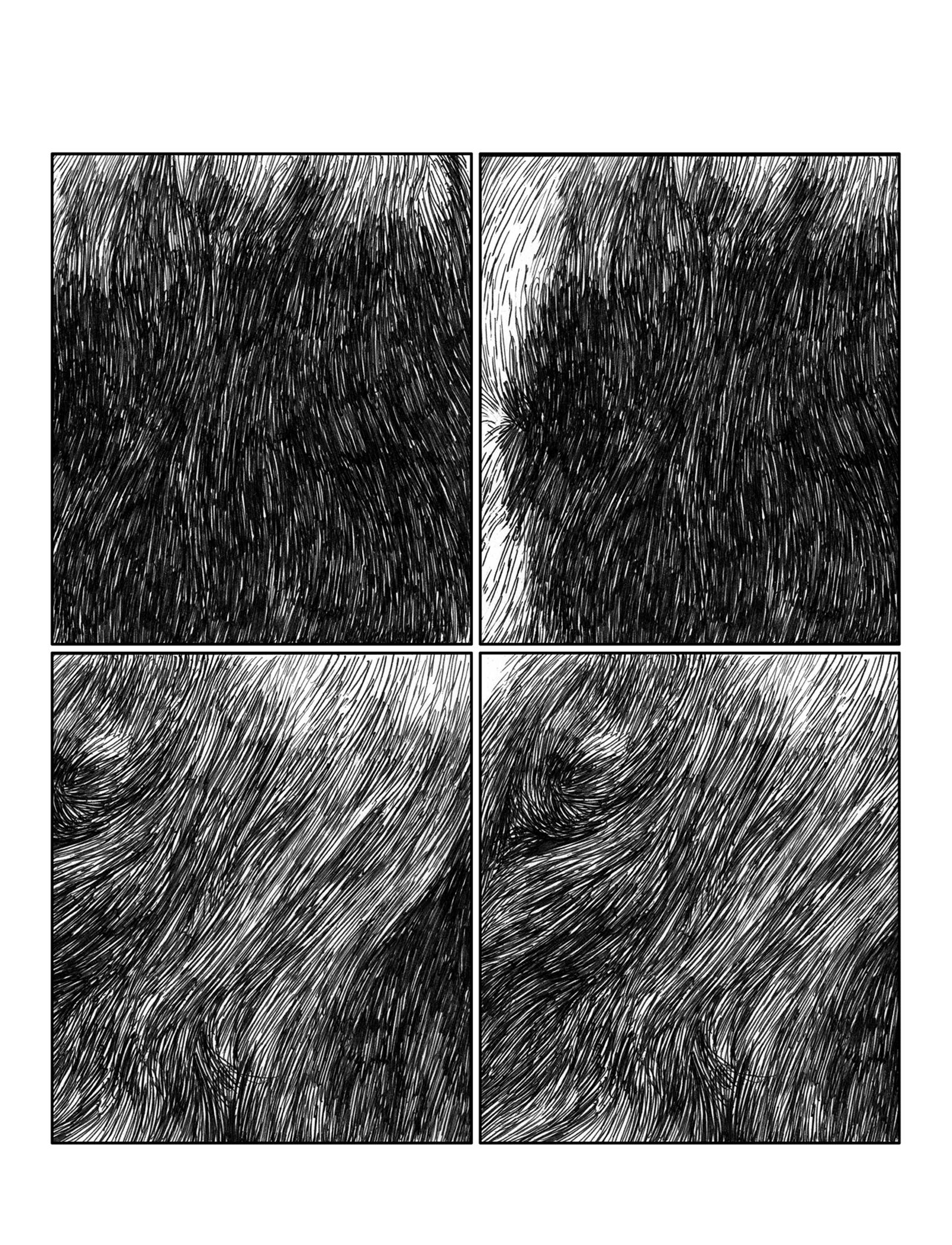
STANLEY WANY // 36 COMICS
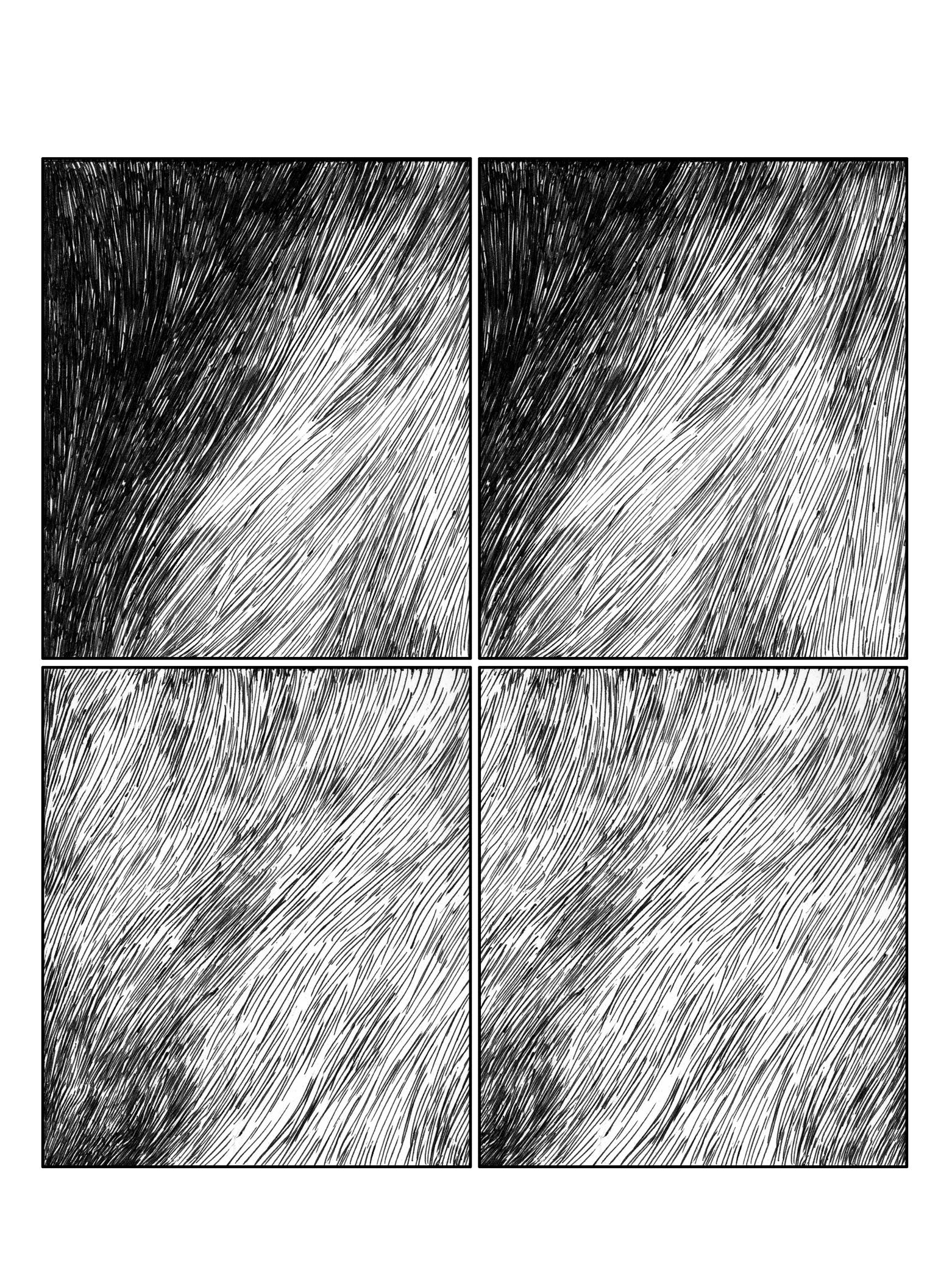
STANLEY WANY // 37 HELEM // STANLEY WANY // AN EXCERPT FROM THE GRAPHIC NOVEL (2021, CONUNDRUM PRESS)
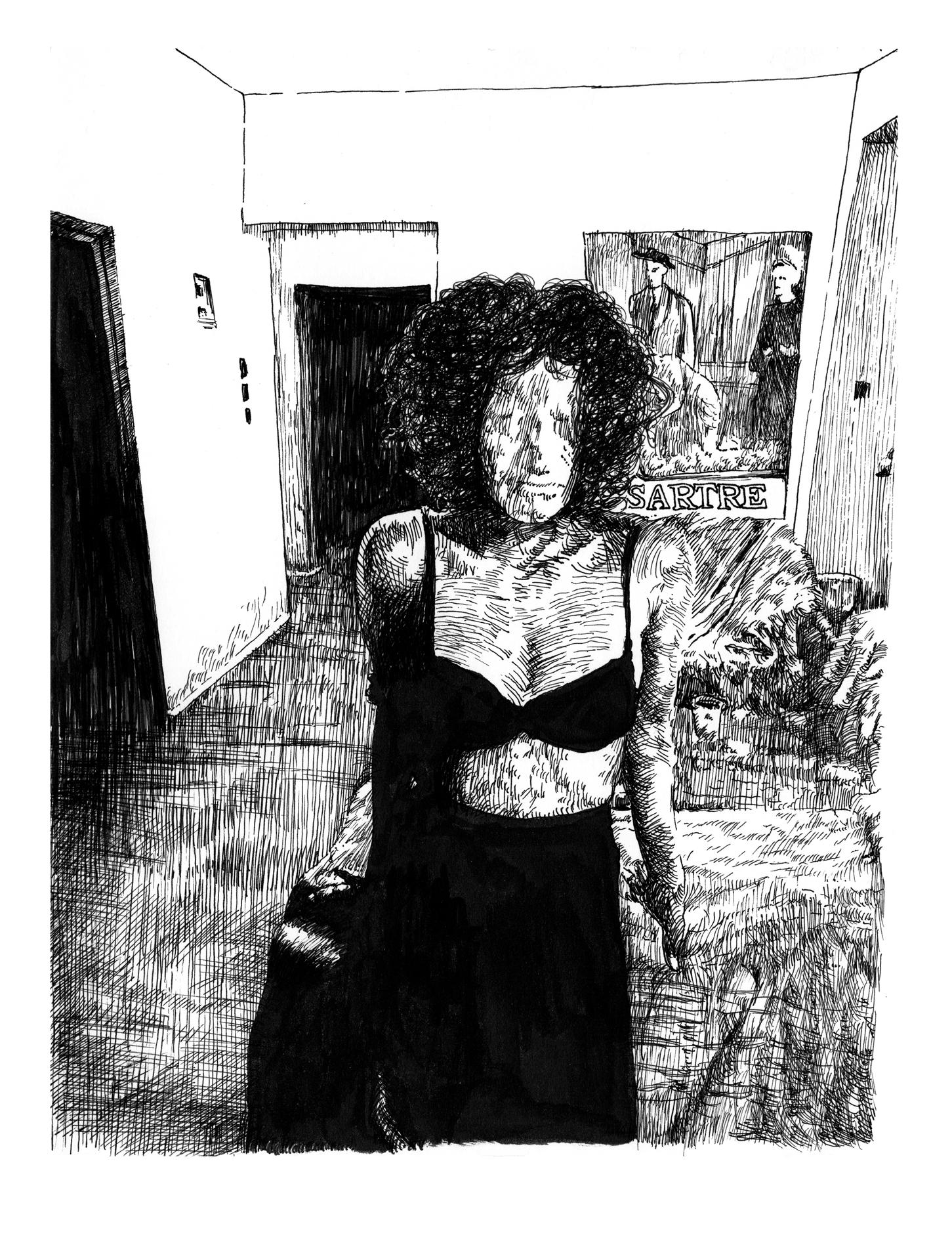
STANLEY WANY // 38
COMICS
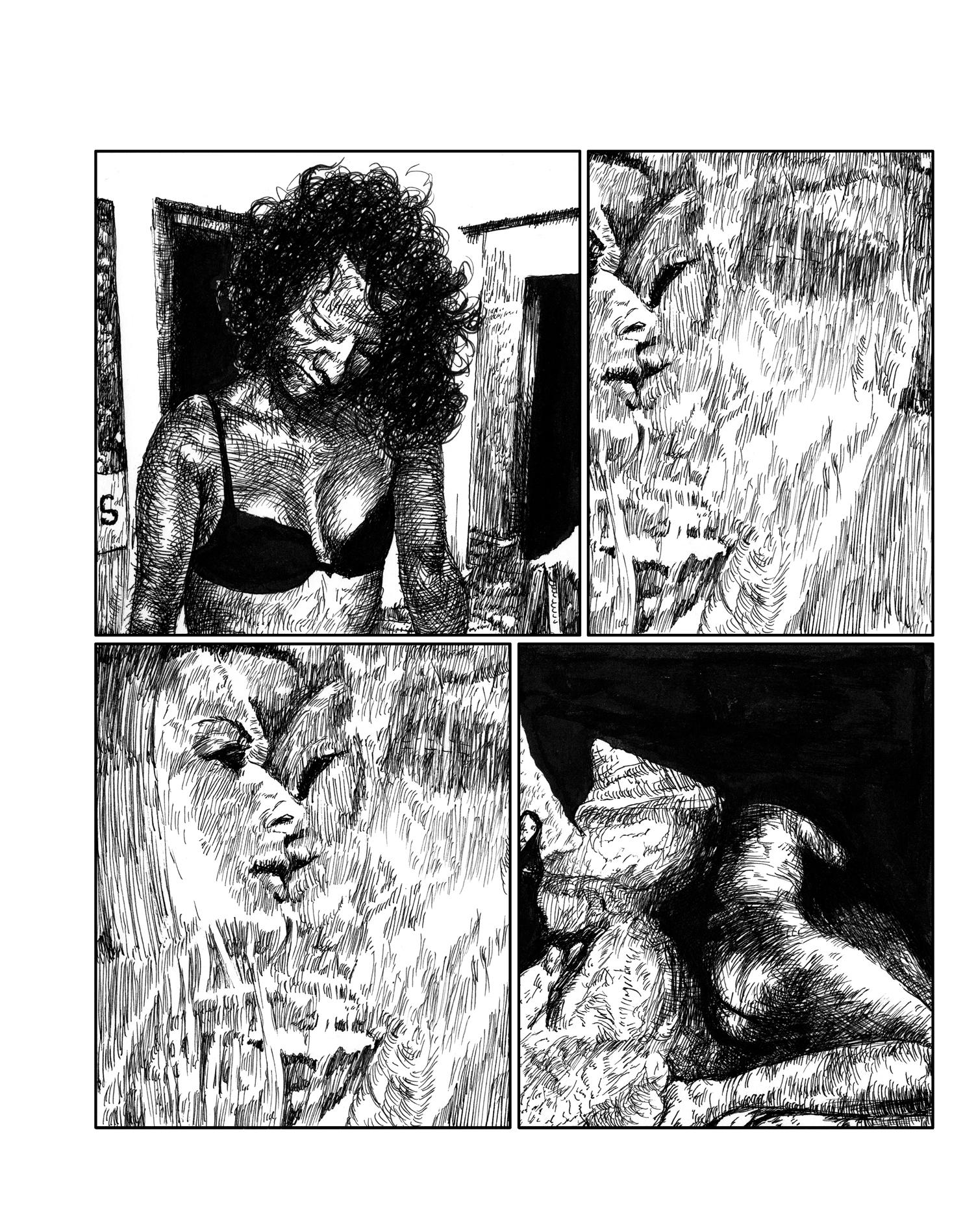
STANLEY WANY // 39 HELEM // STANLEY WANY
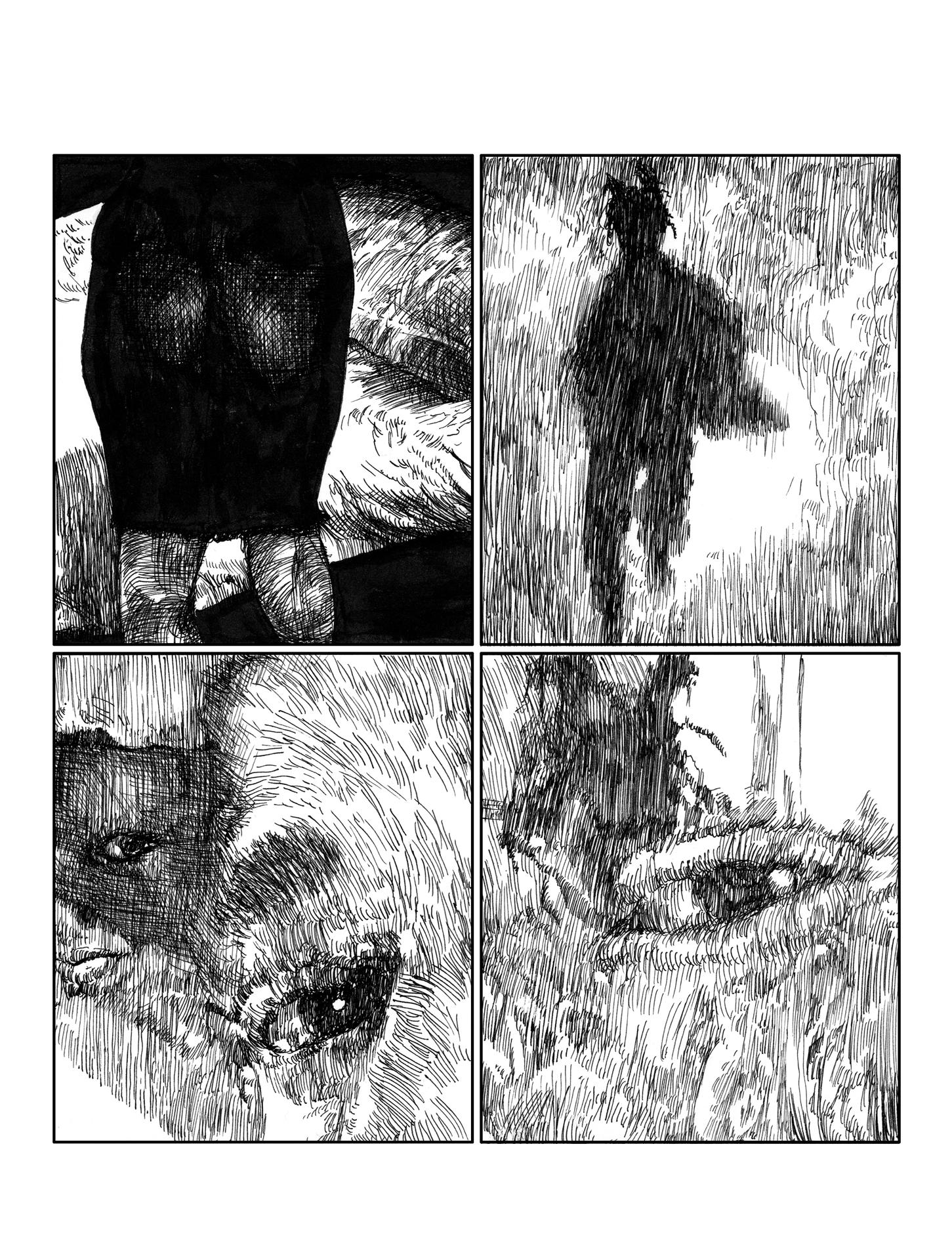
STANLEY WANY // 40
COMICS
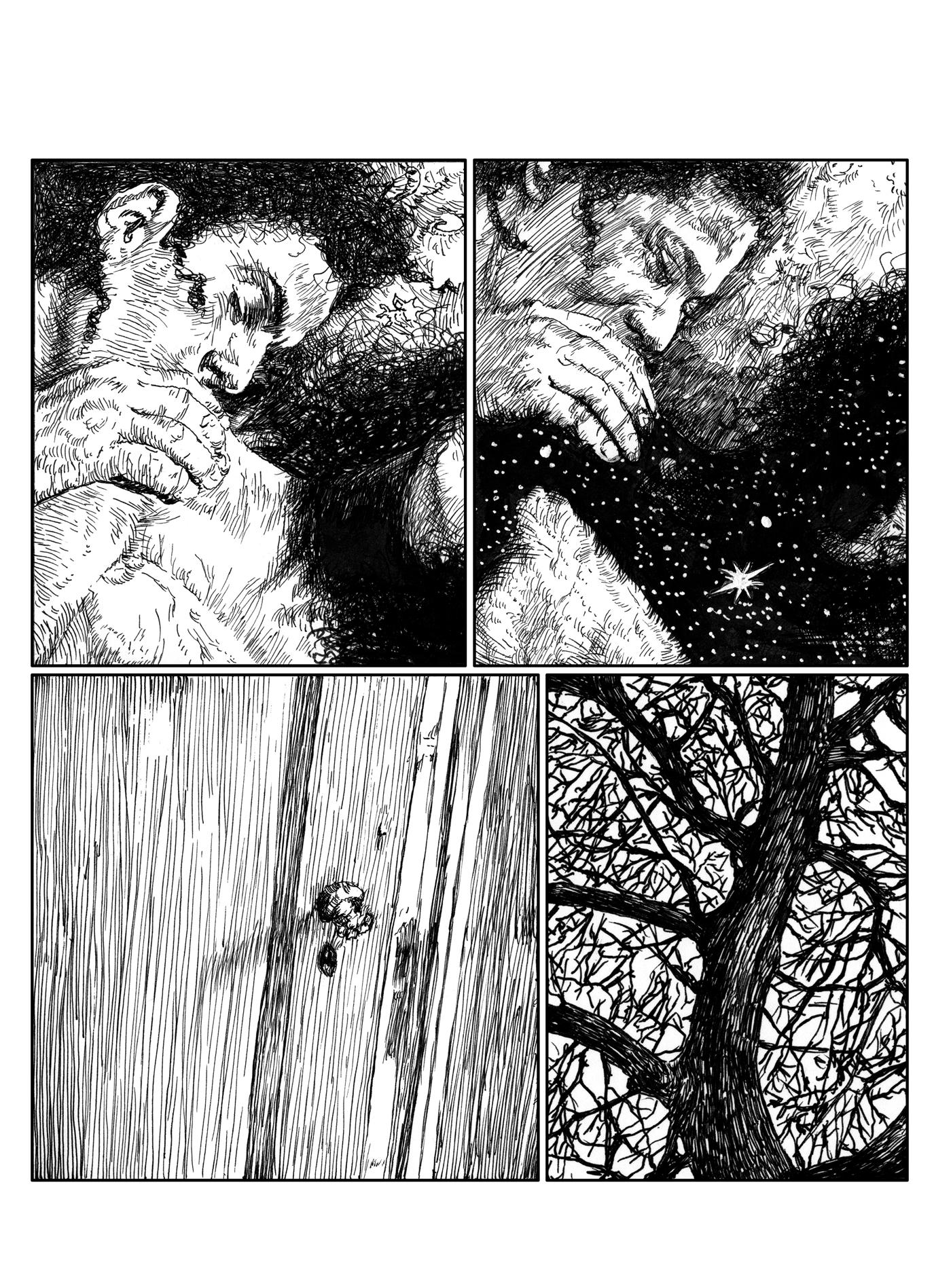
STANLEY WANY // 41 HELEM // STANLEY WANY
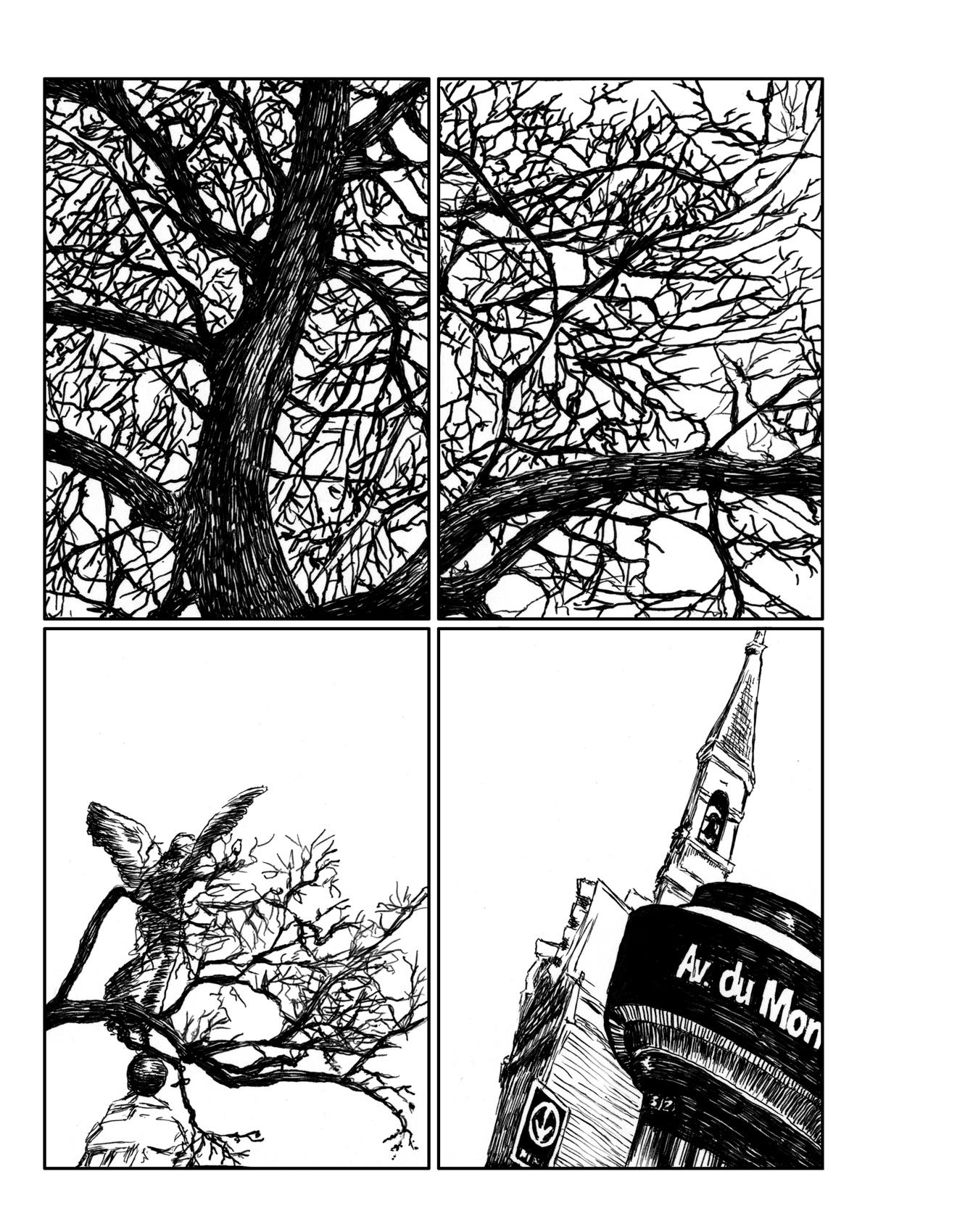
STANLEY WANY // 42
COMICS
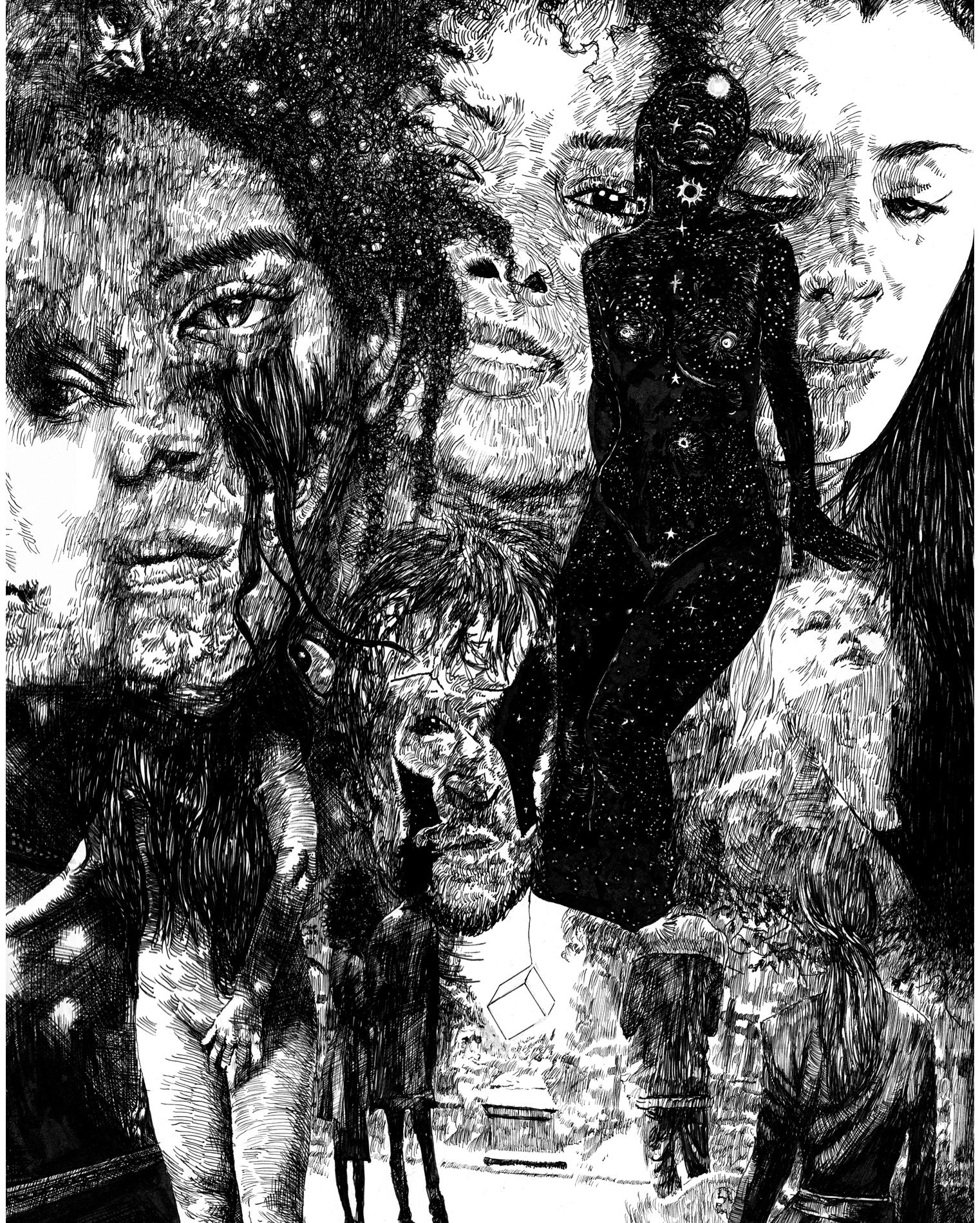
STANLEY WANY // 43 HELEM // STANLEY WANY
GARRET DWYER JOYCE
EXTRA GANG

 RIPPLE RIPPLE, 2016 | STEVEN BECKLY
Image courtesy of the artist.
RIPPLE RIPPLE, 2016 | STEVEN BECKLY
Image courtesy of the artist.

We’d come to Alberta to work in the oil industry. Two lads from Dublin with nothing to offer but enthusiasm.
“Nobody predicted the price would tank,” said Fionn, the guy at the employment centre in Calgary. He told us his mother came from Mayo. Who else would name their child Fionn?
Brendan tilted his head in my direction. “It was his idea. One-year work permit. Jobs galore.”
I felt betrayed, flashed him a frown, but he kept going.
“If we wanted to flip hamburgers, wash dishes, or deliver flyers, we could have saved the airfare.”
Fionn nodded. Round face and carrot-coloured hair. Take away the Canadian accent, the straighter teeth, and he could be someone you’d see on Grafton Street.
He rummaged through a pile of job notices and produced a sheet of paper. Canadian National Railway printed across the top. A red CN logo in the upper corner.
“How about this? Track repairs on the branch line, south of Camrose.”
“Camrose?” said Brendan. “What kind of place is that?”
Fionn smiled. “The nearest place to where you’ll be. The Extra Gang’s kind of nomadic. Minimum wage, but you’ll get free room and board.”
“More money in our pockets,” I said to Brendan. He took the sheet from Fionn and stared at it.
“Bring plenty of sunscreen,” said Fionn.
It turned out to be filthy, muscle-wrenching work, more like a prison chain gang than a job. Eight hours, six days a week. Sundays were free, but where would we go?
Stripped to the waist, we worked in unison under a sun that made the rails glisten like molten silver. Five men on each side of the single track, replacing wooden ties and shovelling gravel to hold them in place. Even with gloves, my hands became blazing torches of pain until the skin hardened. A fine dust caked my face and torso like badly applied makeup. A dryness in my throat I’d never felt in Ireland. The only moments of respite were thirty minutes for lunch, water breaks, and the occasional freight train.
Long before the snake of grain-filled hoppers emerged from the haze, we heard the wail of the horn— two honks and a brief toot, followed by a longer moan. The signal we’d soon lean on our shovels, thankful for an unscheduled rest.
There was something hypnotic about watching dozens of wagons clank slowly by, but Brendan never joined the stares. Instead, he would turn around and cast his gaze to the line where sky met land in a hazy confluence.
“Is your friend on the run from something?” asked Hepburn, the foreman, the first time he noticed. He looked older than the others, probably early fifties. The wiry body and leathery face of someone who’d spent too many days working outdoors and too many nights drinking in bars.
I wiped the sweat from my forehead. “Brendan’s never run from anything.”
Hepburn’s flinty eyes danced. “Don’t make no difference here. Drugs. Booze. Escaping the law, or just plain crazy. We’ve seen it all.”
He nodded towards the row of worn faces. All beyond youth, but with their middle-years still to live. The Five Amigos—two Cree, a Métis, and two Quebecers—who always worked together on one side of the track. On the other side—with myself, Hepburn, and Brendan—lanky Earl, his straggly grey hair pulled back in a ponytail and a ragged scar on his right cheek. On the end, sad-faced Bert, who kept his thoughts to himself.
“You never see horizons like that back home,” I said. “Makes you feel like a speck.”
“Yeah, maybe.” Hepburn shifted his wad of chewing tobacco and spat. “But that’s not what your buddy’s looking at.”
Brendan and I had been friends since we were kids and I thought I knew him. He’d always felt problems had to be faced head on, not hidden away. Now, he’d retreated to some dark place he wouldn’t share.
As days blurred into weeks, we picked our way along the track. Every Friday, a locomotive moved the five boxcars we called home to a new siding. Two furnished with metal-framed bunks. One converted to a kitchen with a four-burner propane stove and a long, Formica-topped dining table. Another, a washroom with three cubicles, four basins, and a shower fed by a plastic pipe running from a tank on the roof. The last boxcar served as a kind of lounge: canvas garden chairs, two battered card tables, an Electrohome TV and VHS tape machine that belonged in a museum. An array of Playboy centrefolds on the walls. Alcohol was banned, but the malty smell of rye often drifted in the air.
“Welcome to paradise,” said Earl the night we arrived, offering us a choice of canned Coke, Pepsi, or Mountain Dew.
As the landscape become more familiar, I began to notice its subtle changes. What first appeared as uniform flatness was full of topographical surprises. Gullies, ridges, and dry riverbeds—mute evidence of ancient surges of ice and water. Wooden grain elevators marked the towns and hamlets along the track. Up
GARRET DWYER JOYCE // 45

close, they were battered and worn, mostly abandoned. From a distance, they seemed magical, like medieval towers looming out of the shimmering heat.
“Look at that,” I said to Brendan one sweltering afternoon. “You’d think they were floating.”
No response.
Hepburn came and stood beside us. He shielded his eyes. “When I was a kid, they were the place you met your neighbours, caught up on gossip. These days, they truck the grain to the bigger towns. Won’t be long before the wooden ones are gone forever.”
Brendan’s body tensed, his eyes alert in a way I hadn’t seen for weeks.
“Like us,” he said.
Hepburn glanced at me, questions in his eyes I couldn’t answer. He patted Brendan on the shoulder. “The heat’s getting to you, young man, but we’ll fix that tonight. We’re stopping at Yellow Creek. Proper showers, cold beer, and a bed at the Pioneer Hotel. It ain’t the Ritz, but it sure beats the boxcars.”
Over the rest of the day, Yellow Creek grew mythical in my imagination—a haven of leafy streets and shade. Cool running water. In reality, it was a sorry place.
The optimistically named Main Street consisted of Frank’s General Store, a one-pump Texaco service station, Noodle Delight, and the Pioneer Hotel. A faded Canada Post sign marked the location of the post office, now boarded up. Three side streets started with promise—fenced yards, wooden houses with tarpaper roofs, and some spindly aspens—then dwindled into a dusty nothing.
“More magic for you,” said Brendan, pointing to the row of elevators strung along the track. Empty and forgotten, with the names of their former operators— Alberta Wheat Pool, Pioneer, and CO-OP—stencilled on them in barely legible white letters. Across the track was a scrapyard full of battered cars, piles of tires, twisted farm machinery, and amorphous lumps of rusting metal. There was no sign of a creek.
“Thank God the hotel has a bar,” I said. “Or should I say beer parlour?”
Brendan gave me a look. “Settled right in, haven’t you?”
After showers at the hotel—a blast of water instead of a trickle—we ate sweet and sour pork at Noodle Delight, then headed to the beer parlour.
“Don’t let the hay shakers bother you,” muttered Hepburn as we entered. He nodded towards the huddle of farmers who paused in their game of shuffleboard to eye us with suspicion. They were all dressed alike: faded grey overalls and red Alberta Wheat Pool baseball
caps. “The bartender hates us too, but we’ll drink more tonight than they will in a whole week.”
“A long way from Ryan’s,” I said to Brendan as we took in our surroundings.
I waited for him to laugh, but he just nodded.
The room was narrow, a low ceiling. The shuffleboard at one end. Six wooden tables, each with four chairs, in a row parallel to the bar. The dominant colour was brown: the paint on the walls, the tables and chairs, the scuffed boards on the floor. The only splashes of brightness came from the display of Old Dutch chips and the red, white, and blue Molson clock behind the bar.
We pushed four tables together, creating a no-man’s land of empty space from the farmers who resumed their game. The barman arrived with a metal tray loaded with heavy-bottomed, six-ounce glasses of draft.
“Just wave when you need more,” he said in a flat voice. “Pay as you go.”
Hepburn gave him a thumbs-up. Like the others, he was dressed for the Calgary Stampede—red, cream, or blue western shirts with pearly buttons, metal-buckled leather belts, blue jeans, and beige cowboy boots. The tang of cheap soap hung in the air.
It was not a scene to encourage warmth, but after a few rounds a glow of camaraderie grew. Even the Five Amigos—beside each other like on the line—broke out of their bubble and threw the occasional comment in our direction. We were a novelty. Funny accents and wide-eyed in our new surroundings.
“No decent jobs at home, so here we are.”
“And look what happened,” said Hepburn. “You found us. The jackpot.”
The others stared at him. No smiles. No laughter.
“The guy at the employment centre said this would be an adventure,” I said into the silence.
“And Declan believed him,” added Brendan.
“Fuckin’ pen-pusher, what would he know?” said Earl. Even when he was scrubbed up, that hair and scar made him look like a pirate. “Air-conditioned office. Every benefit you can think of. Fat pension at the end of it.”
“But we have a benefit you won’t find anywhere else,” said Hepburn. He finished his beer and waved at the bartender. “This is where we come to forget.”
A spark of curiosity suddenly appeared on Brendan’s face.
“Forget what?”
Hepburn ran a finger around the inside of his glass and licked the foam. “What life once promised.”
A current of tension ran through the group. An adjustment of limbs, an exchange of glances. Earl took a
GARRET DWYER JOYCE // 46

sudden interest in fastening and unfastening the snaps on his cuffs. Bert stared at the cracked ceiling, like a cat seeing something that isn’t there. As if on cue, the Five got up and trooped outside for a smoke.
“What’s with them?” I asked.
“Too much time in the slammer,” said Hepburn. Bert leaned into me. “Your pal.”
“What about him?”
Bert’s mouth came close to my ear. The sulphurous smell of tooth decay.
“Paddy Wacko.”
“His name is Brendan and there’s nothing wrong with him. He’s just having trouble adjusting.”
“Ever hear of electrotherapy? Rewires your brain.”
“I never knew you were such an expert.”
He drew back, gave me a hurt look. “Did wonders for me. All I’m sayin’.”
After another round of beers, the mood lightened. The Five had returned, bringing a fug of tobacco smoke with them. Conversation picked up: rants against the government, the monotony of eating canned stews and instant mashed potatoes, the betrayals of ex-wives and lovers.
Brendan sipped his beer without comment. In Ireland, he’d always been a great talker who got more amusing with each drink. Now he reminded me of a bitter old codger you’d see in a pub back home. Someone you learned to avoid.
After a while he said, “Declan thinks those old grain elevators look magical.”
I laughed. “Only from a distance.”
“That’s the poet in your head talking. Where you see magic, the rest of us see the truth.” He looked around. “Am I right?”
Blank stares. Hepburn looked uneasy.
Brendan stood up abruptly. “I’m going for a walk. Need some air.” And out he went.
“Don’t leave him alone,” said Hepburn, but I was already on my feet.
It was cool on Main Street, a light breeze sweeping away the dead air of daytime. A full moon softened the hard lines, bathing the town in indigo shadows like moody lighting on a stage set. Noodle Delight shuttered for the night, no cars or people. A dog barking in someone’s yard.
I walked towards the railroad and spotted Brendan in the scrapyard. Beside him was a pile of broken concrete. He bent down, picked up a chunk and aimed at a rusting Pontiac. A loud crack of glass. It faded quickly, swallowed up by the immensity of the flatlands beyond the town. He found a heavier piece and tossed it at the same windshield. This time, it shattered.
“Hey,” I whispered, but didn’t move. A chemical aftertaste from the beer rose from my stomach, burned my throat.
Brendan paused and gazed along the track. The rails gleamed in the moonlight. Two streams of metal that narrowed to an arrowhead on the horizon. He hugged his arms around his chest, as if the night had suddenly turned colder.
He turned back to the scrapyard and started throwing concrete again—denting metal, cracking windshields, smashing headlights—as if intent on making as much noise as he could. He seemed in a trance, mechanically hurling missiles in rhythmic salvoes, laughing quietly when he hit a target.
He didn’t notice me sneak up and jumped when I touched his arm.
“Enough,” I said gently. “Someone’s going to call the Mounties.”
“Let them!” He gave me a defiant look.
I reached out, took the piece he was holding. He didn’t resist, letting his arms flop loosely by his sides.
“We’ll have enough money to quit in a few weeks,” I said. “We’ll head to Vancouver, sit by the Pacific, and breathe in that good salt air. There’ll be girls. We’ll sweep them off their feet with our accents and charm.”
A smile hovered around Brendan’s mouth. “Yeah, right.”
A soft tinkling as glass fell to the ground, like slivers of ice dropping from a roof on a sunny winter’s day.
“Everything’s going to be okay,” I said.
“Easy for you to say.”
“It’d help if you opened up.” My eyes met his. “What are you looking for out there?”
“I’m not looking for anything, Declan.” He looked at me as if I was the one who was insane. “I’m listening.”
“To what?”
“Can you not hear it coming?” He grabbed my shoulders and turned me towards the prairie. “The arctic wind.” He swivelled me so I could see the elevators, clearly defined in the moonlight. “Shrouding those sagging wrecks in sheets of snow. The death of your delusions.”
He made a sound that resembled a laugh, but without the humour.
“What will you do then?”
All I could hear was the chirp of crickets, a rustling of small creatures in the wild grass, the distant cry of a nocturnal bird.
“Still sounds like summer to me,” I said and shrugged.
“Try harder,” he muttered in a voice that made me feel even more alone. “You’re supposed to be my friend.”
GARRET DWYER JOYCE // 47
///
AARON RABINOWITZ
THREE POEMS

AN ASIDE
Did you know a robin only lives two years? A season is a decade, a bite of worm is a banquet, a memory is a memoir. So then what are we to the immortal bristlecone pine but an aside, an exhale? I should go further, call up planetary bodies and singularities but I’ll stop here, only add that what you’re going through feels permanent, but leave a highway or a house unattended and nature will consume both until all that’s left are suggestions.
SHIFTS
She carries memories of countless dead, conjures up burnt-down buildings like old Ratner’s now a gas station and her childhood bulldozed for a Giant Eagle, her own mother left behind invisible paintings and bucolic scars while her father combed his blanket and hid under his moustache and her sister with her lively hair and flaxen disposition was buried in her youth, Pittsburgh becomes Tucson becomes Toronto becomes Rochester becomes so many presidents bleached and tin-pots impeached and coral reefs deposed, my mother’s mind is full of ghosts.
AFTER I WALKED YOU HOME AND STILL HAD NO COURAGE TO KISS YOU
I had this feeling that everything in my life led to you, though we had only met up twice, and I hoped you might like me too because you laughed at my jokes but I needed a larger dataset to make an accurate determination and as I was heading up Carroll Street after we said goodnight, I chanced upon a fish tank, remember? It was strewn with Harlequin paperbacks and Melissa Etheridge CDs and costume jewelry and, because your basement apartment was furnished from sidewalk offerings, I doubled back to tell you. But your bell did not ring so I crouched to knock on your window and heard you through the glass, saw you through a gap in the curtains, and that’s when I knew. Because you were playing guitar. Because what you decided to do, after our date, was sing.
AARON RABINOWITZ // 48

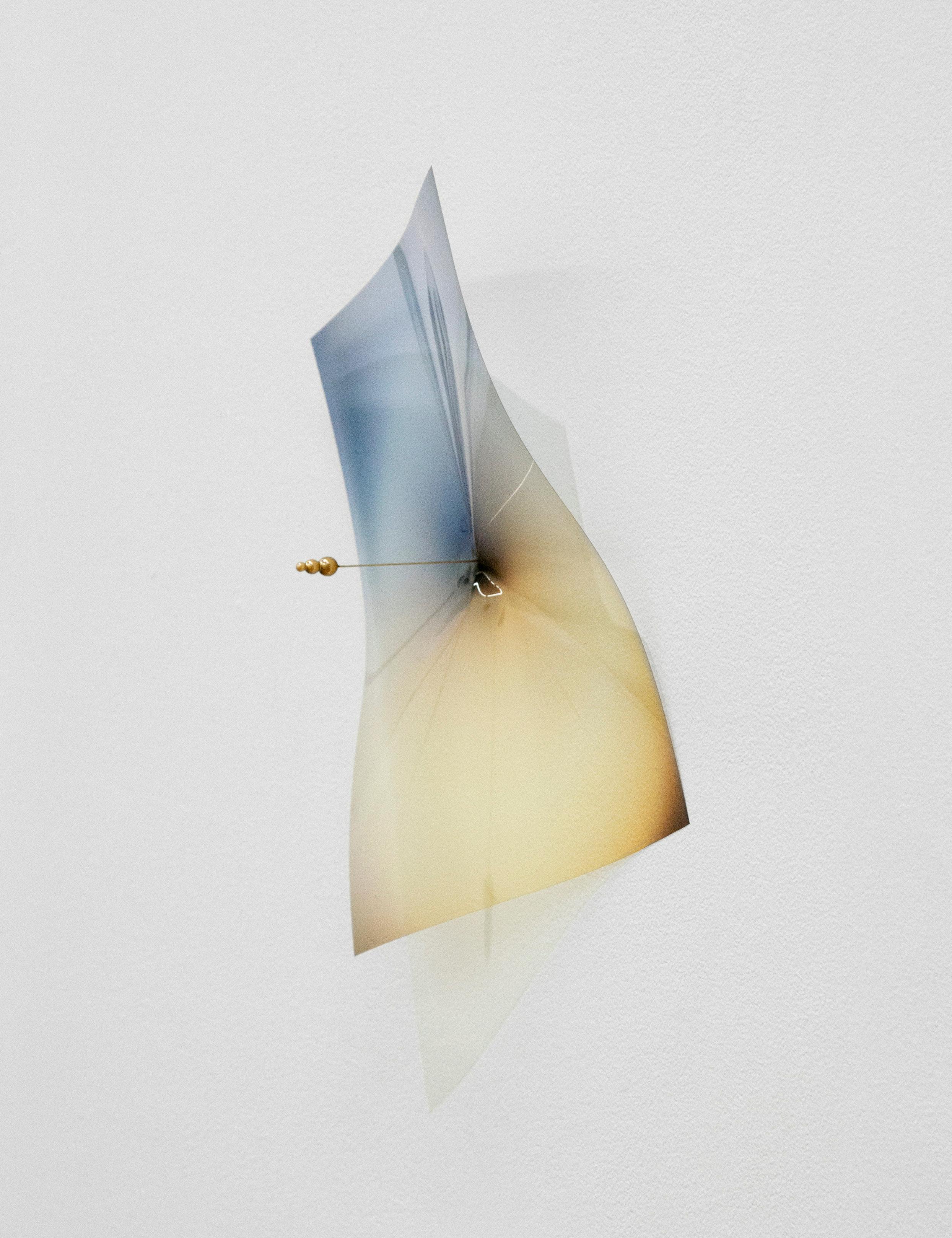 MOOD RING, 10.5” x 7” x 3.5”, BURNED TRANSPARENCY AND PEARLIZED PIN, 2017 | STEVEN BECKLY Image courtesy of the artist and Daniel Faria Gallery.
MOOD RING, 10.5” x 7” x 3.5”, BURNED TRANSPARENCY AND PEARLIZED PIN, 2017 | STEVEN BECKLY Image courtesy of the artist and Daniel Faria Gallery.

 HEADS UP, 2023 | STEVEN BECKLY
Image courtesy of the artist.
HEADS UP, 2023 | STEVEN BECKLY
Image courtesy of the artist.
LEA ARMATA

I’m six years old when I get lost on the bus.
MY NONNO
It’s my very first day of first grade—a day of many firsts, including my first time riding the school bus. Ma drops me and my little brother David off at school in the morning, drilling the same phrase into my head since I’d woken up: only get off the bus if you see Nonno, and look after your brother.
I puff out my chest to her as if I’m readying for battle. I’ve got two skills, and one of them is protecting David. I’ll bully kids five or six years older than I am if it means saving his skin. The same is true now, both of us well into adulthood. Me, the shorter and weaker one, wanting to protect the grown man from danger. Funny how that works.
I can’t remember my first day all that well. Not until my brother and I exit the front doors of the school does the picture in my mind develop like a photograph in a darkroom. Everything seems to happen in slow motion. I see the guiding hand of a teacher pushing us into a long line facing a gigantic yellow school bus. Except, there are two lines and two buses, and that’s too much choice for one little girl.
In the other line, I see my friend and notice her long brown hair pulled into two braids. She’s the only person I can recognize, so I pull David out of the line we have been shoved into and sneak into my friend’s line. We don’t live close together, but I assume the bus driver knows my grandfather’s address. I’m not the least bit worried.
The worry doesn’t settle into my stomach until my brother and I board the bus and the driver steers in the opposite direction of my grandfather’s house. My brother and I sit at the front, scared of the older kids in the back, and I watch nervously as we get farther and farther away from my grandfather’s home. As time passes, each child who’d entered the bus exits. As
the driver halts at the final stop, letting the last of the children off the bus, a realization slowly dawns on me: David and I have gotten on the wrong bus. I have failed. I am no adult; I’m a baby. And just as a baby would, I start blubbering for my ma.
The bus driver, a middle-aged, scruffy-looking man, is properly pissed. He looks at me and frowns before turning to my brother and frowning deeper somehow. My brother, four years old, is taking a nap. It has been a long day, and he must know that I am worrying enough for the both of us.
David and I have gotten on the wrong bus. I have failed. I am no adult; I’m a baby.
“Get off.” The bus driver grunts, pointing to the open doors of the bus.
I shake my head, my knee bouncing and my heart racing. Although I won’t know this phrase for a long time, I am having a panic attack.
“Get off now.” He grunts again, nodding towards the door a second time.
Through my cries, I manage to sob one single sentence: “My mom says I can’t get off the bus unless I see my Nonno.”
It’s the second skill I’m trained in: following instructions. I’ve already failed to protect my brother.
LEA ARMATA // 51

I’ve accidentally brought him halfway across the city, and I know Ma will be angry. The least I can do is follow her second instruction. I look for David’s hand and grab it tenderly as he sleeps. I am suddenly determined to stay on this bus until I see my Nonno. There’s this hint of defiance through my fear. If this bus driver touches my brother to try to move him, I’m ready to scream and fight.
Instead, the man just shrugs and turns his bus around, driving us back to school. Ma is waiting for us on the lawn in front of our school, her face full of worry. I remember the tender embrace and the smile she showed us through her tears. I don’t remember much afterward, but I do remember the first words she said to me.
Nonno was worried sick.
My Nonno—my small and quiet Nonno—was worried about us. Years later, when we retell this now-humorous story to friends and family, Ma will divulge more information. Our Nonno waited by the bus stop that afternoon, and when his two little kids didn’t get off that bus and run to him, he panicked. He boarded the bus and checked each seat for my brother and me. And when he couldn’t find us, he’d called our mom. He had been distraught, Ma said. When the principal finally got a call from a rather upset bus driver and told Ma we were safe, only then did my Nonno breathe a sigh of relief.
He boarded the bus and checked each seat for my brother and me. And when he couldn’t find us, he’d called our mom.
This is one memory I continue to come back to, no matter how old I am. My Nonno wasn’t a loud man. He liked to stay in the background, watching everyone around him and studying their conversations. He was strong and tough, working hard since he was a child. I had lived with him for a brief period while my parents saved up money for their own house, and all I remember is how helpful he was. All I remember is how much he was willing to give. If a neighbour needed their grass mowed, my Nonno was there to lend a helping hand. He fixed fences and
worked on machinery in his garage to give to others. He fed me, David, and our other brother, Adrian, milk and cookies whenever we went to his house. He slept on the smaller couch beside us as we watched Judge Judy on his television. He rode his bike in front of my school during lunch to silently check in on my brothers and me.
What I remember most of all is one singular image. It’s one I saw almost every day when I was a child. The second I got off the bus down the street from my Nonno’s home, I could see him sitting on his porch in a lawn chair, waiting for his kids to come home. I saw him sitting there almost every day, unaware there’d be a time when I’d never see him again. The image of him on the porch, watching us run to him, has been burned into my brain since his death.
But now two years have passed since his death, and that image is slipping away. I’ve become that same scared little kid on the bus, except now I’m afraid of losing the most important image of my Nonno. The image of him slumped in his seat, playing his harmonica as my siblings and I ate our cookies. I curse at myself for never taking a picture of him on that chair, although I imagine he never would’ve wanted me to. When I visit his house for the last time before it’s sold, I stare at that same lawn chair on his porch and the fuzzy image dims even more. I would gladly exchange a number of memories for a clear one of my Nonno sitting on his chair.
Now, I search for his house on Google Maps from time to time. I have forgotten what he looks like on that chair, but I promise myself that I won’t forget the house I grew up in.
One day I find myself looking at a street view of his house. I couldn’t remember the colour of the blinds and whether the horseshoe hung over the garage or the porch. As I study the house, something below the photo catches my eye. Beneath his address, three blue words are underlined: See more dates.
Instinctively, I click on the words, and underneath the latest street view of my Nonno’s house are nine other photos dating back to September 2007. He was still alive then. I look at the first photo, my eyes wide. My Nonno’s royal-blue truck is parked in the driveway. This was before his dementia left him unable to drive. Even now, every blue pickup truck I see reminds me of him.
The next photo dates back to June 2009. The blinds in his house are open. He is inside. He is still alive. This is the year I start first grade. It’s the year I worry him sick because of my mishap with the school bus.
LEA ARMATA // 52

The third photo was captured in August 2011. My Nonno’s bike is in the driveway. The same bike he would ride around the neighbourhood, passing my school to check in on us. Some kids in school even knew him as my Nonno because they saw him cycling around the block. Even as a child, I know some kids are secretly envious of my athletic Nonno. Now I manoeuvre around the neighbourhood with my mouse and see a blurry image of someone on a bike. Somehow, I know it’s him.
When I click on the next photo, my stomach drops, and my mouth hangs open. The image was captured in May of 2016. I am almost fourteen and not yet in high school. I zoom in on this old image, capturing something so important from my past. Sitting on the porch, in his lawn chair, is my Nonno. His hands are clasped together, and he leans back in his chair. He is waiting for me to come home. His face is blurry, but it’s him. Now, I finally remember how he looks. I finally remember all those afternoons racing home and watching him nap in his chair.
I remember sitting beside him in silence on the porch, watching cars drive by. I remember the white paint on his navy-blue work pants and the way his stubble scratched against my face when I kissed his cheek. I remember his calloused fingers and how I’d compare the similarities in our thumbs. I remember his smile and the gap between his two front teeth. I can hear the clang of his keys and the clump his feet made against the tile. I can hear his soft snores when he used to nap on the couch beside me. I remember the curious look on his face when he played with the small pocketknife in his hands. There is so much I remember, but so much more I forget. And that scares me. It frightens me to realize that someone so important in my life is now just a collection of memories, some forgotten and others not.
A small gasp leaves my lips as I stare at the street view of his house. He remains there, sitting on his chair and waiting patiently for me to come home. My Nonno is still alive in these moments captured by Google’s camera.
When he died, I went with my parents to clean out his home. In my Nonno’s drawer was a picture of him as a bright young man. I hung it up on the bulletin board in my room and look at it occasionally. I never met this version of my Nonno, but he lives inside that photo—young and vibrant with decades ahead of him—just like the Nonno I see on Google Maps lives there.
I’m still grieving—constantly grieving. I mourn the time I had and what more time I could have been given. I feel as though I’m running out of time. I’m so young. Too young to feel as if there is no time left. People fade in and out of our lives, and there’s no poetic way to describe life’s revolving door. So many people have already passed through my life. I loved them. I miss them. I want them to come home.
At night, I often dream that I’m lying on a lawn chair beside my Nonno, waiting for a little girl to come home from school. I don’t say anything to him. He
At night, I often dream that I’m lying on a lawn chair beside my Nonno, waiting for a little girl to come home from school.
already knows. I let the warmth of the sun wash against my face, and I feel like a child again. I feel at peace. It makes me happy to know he felt like this too.
Maybe that’s the secret, and my Nonno knew it all along. Perhaps the best thing we can do is sit in a comfortable chair under the shade and close our eyes. Perhaps all we can do is try to find peace.

LEA ARMATA // 53
///

SCOTT JOHNSON THE DEADLINERS
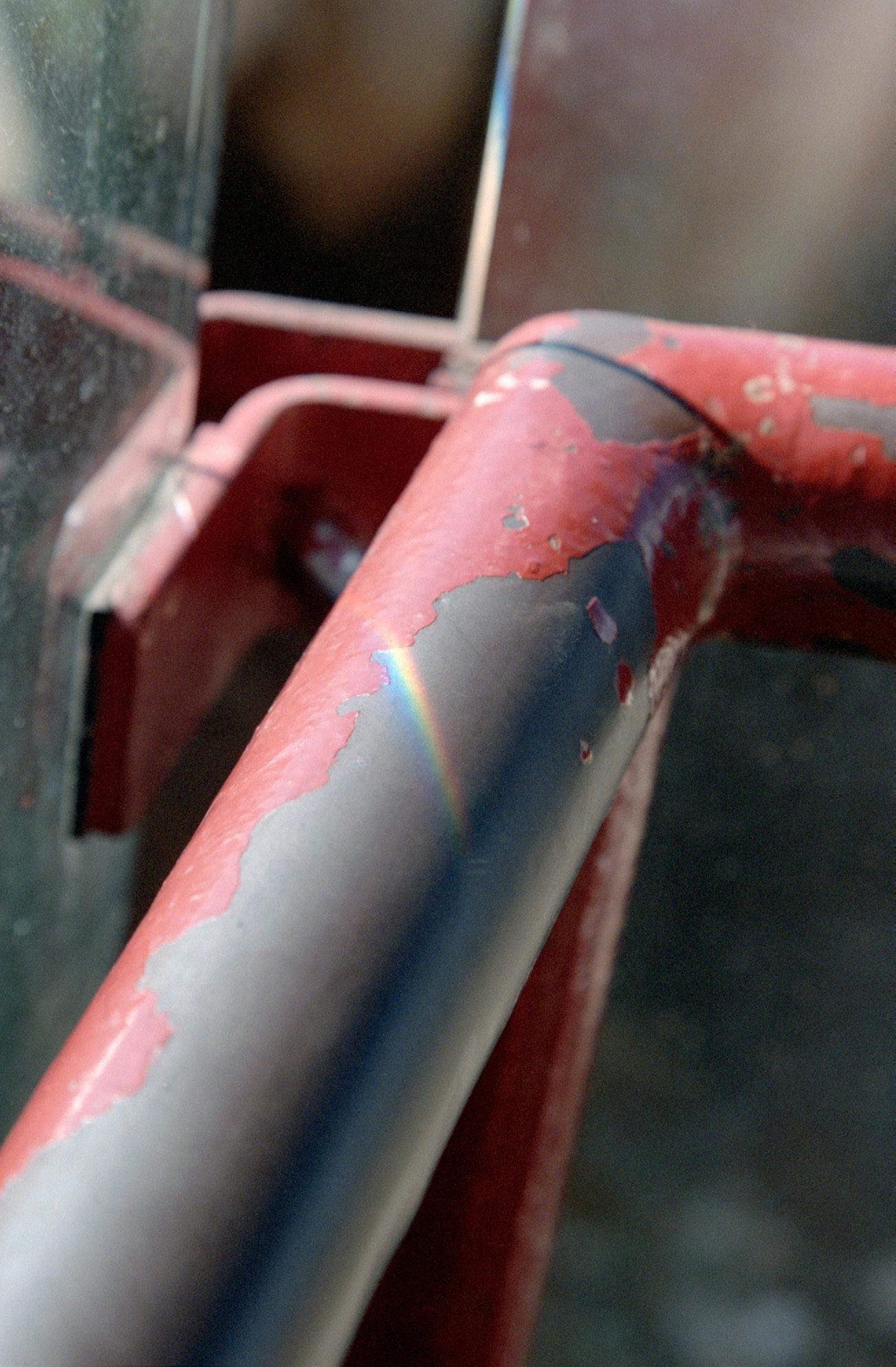
The rabid thud-thud echoed from behind some nearby street corner. Graham placed the apples he was cradling back onto the vendor’s table. “Sorry, not today.”
His radar tuned to the thunder of black running shoes with red soles, he didn’t freeze. The days of panic and grovelling were behind him.
He ran as he had been, up and down the streets of Toronto. But this time was different. He had the drop on them. His legs were strong—engine pistons slicing through the air—ripping past side streets, leaving them in a blur. He shifted and skipped and sidestepped between each e-scooter, churchgoer, street preacher, busker, and beggar with steadfast precision.
But the abrupt sprint back to his apartment began to steal his air. The all-too-familiar searing pain in his knees crawled up his thighs and threatened petrification. In his shins, it splintered down the middle like an axe blow to a log.
The backbeat of the shoes clapped the pavement behind him. He dared not look back. That would only slow him down. He rounded another corner and wheezed into his neighbourhood.
Then he succumbed to the temptation and peeped over his shoulder. Two of the men were at his heels, leading the charge. Relentless. I’m done for.
No. He remembered the third dictum: belief in defeat equals suffering. Two more blocks, and I’m home. He felt the wind at his back. He drove harder. Suddenly, he dropped and balled into a fetal position. Both men rolled over him and tumbled onto the pavement. A knee stubbed the side of his rib cage, the exact spot where one of their baseball bats connected a month and a half ago and cracked a rib.
He quickly stood, palming his bruised ribs, and kicked one of them in the kidney. “Retribution, asshole.”
The man cursed in pain, but Graham was already onto the other man, who tried to lift himself
UNLIKELY TIMING, 2020 | STEVEN BECKLY Image courtesy of the artist. // 54

up before Graham could jam a knee into his chest. Too late.
“What’s this? Fighting back for a change?” his words were throaty.
“’Dis is a moobment,” Graham parodied before he snap-punched the man in the face. “You lose.”
More black running shoes with red soles appeared down the street. Graham was back up and supersonic as he ran between startled dogs and barking pedestrians.
Made it. He entered his apartment building, passed the elevator, flung into the stairwell, and hurtled up the stairs three at a time. His rib cage throbbed sharp pulses with each breath. His calf muscles reduced to kindling—collapse was imminent.
He passed the second-floor door. The rubber soles cackled into the stairwell like deranged laughter at his apparent defeat. Five more to go. He soldiered on. Oxygen was sucked out of him as if by a vacuum.
His lungs burned battery acid as he heaved and gagged to the fifth floor.
“Graham!” a voice rang up from the floor below. A distraction tactic.
He endured half-speed to the seventh floor as his quads began to char. He palmed the cement wall as he dug out his keys in front of his door, unlocked it, stepped through, closed it, locked it and checked once—all in a trained beat.
I made it. I mean, I actually ….
Sacked. And sideways on the floor. A knee dropped on his head. Stars shone. A ringing fluttered his eardrums. He heard the door forced open, and more black running shoes marched in.
“No more. Please.”
“We aggressors take drastic measures,” voices chanted. One punted his kidney.
He tried to scream but could only manage a glottal stop. He could suck in oxygen with each gasp, but he couldn’t exhale. His chest tightened.
“Kitchen! Contraband!” shouted a woman.
“On it.” Red soles marched out of the living room.
Two men had Graham pinned on his back. He gasped desperately for breath, his chest imploding.
“Take off his shoes and socks,” said one of them as the other struggled to contain him, his limbs thrashing the air as a drowning man’s would.
“Stop it!” One pulled his arms out straight above his head. Another gently put his hand under his neck and lifted slightly.
“Breathe, Graham.” And with that, the air finally escaped from his chest. His eyes welled up in stinging tears.
“Pants!” yelled another man as he held Graham down with a knee in his chest. “Pockets first.” Hands frisked his mid-section.
“Please, not today,” whimpered Graham.
“To wait is too late,” voices recited.
“Kitchen’s clean!”
“Well, well. Simple carbs?”
“Nope.”
“No new TV either.”
“No smartphone. No new tablet,” another added.
“And why is that?”
“This is a movement,” voices responded in unison.
One pulled Graham’s shirt off, while another removed his underpants. Then he was released. The ceiling was obstructed by four men and two women staring down at his naked, twitching body. “Well, would you look at that.”
“It’s time. Get up!” another shouted. Two of them grabbed an arm each and pulled Graham to his feet.
“No.” Graham wept.
“Let’s have a look, shall we? Washroom.”
A ringing fluttered his eardrums. He heard the door forced open, and more black running shoes
marched in.
The men towed him down the hallway. His limbs dragged behind him.
“Scale,” said one and another pulled out a square floor scale from a large duffle bag and dropped it at Graham’s feet. He whimpered.
“Shut up and stand!”
Graham remained unmoved. The other thrusted her knuckles into his ribs. “Stand on it!”
“This is a movement,” voices reiterated.
Graham placed one nervous foot on the scale, followed by the other. He lowered his eyes and pushed upright. They let go of him and took a reading while Graham stood shivering. One of them punched numbers into a calculator, and another pulled out a pair of calipers from the same duffle bag and pinched Graham’s love handles.
“Well, I’ll be damned,” she said and showed it to the others. Silence suddenly invaded the small space of the bathroom until ….
SCOTT JOHNSON // 55

“Graham?”
He hoisted his heavy eyelids. The faces were smiling through the mirror’s reflection. Graham felt a gentle hand ceremoniously pat his shoulder.
“Congratulations. You made it. And two days,”— she consulted her watch—“eighteen hours, forty-two minutes, and thirty-six seconds early.”
The air whooshed out of his lungs. He dropped his hands, bloodied at the knuckles, onto the countertop. His arms quivered in sync with his legs.
“Take a minute, get dressed, and join us in the living room when you’re ready. We have one more piece of business to attend to.” One of them handed him his pants, shirt, underpants, and socks.
“Proud of you, Graham.”
They exited the washroom and closed the door behind them.
Graham stood silently in front of the washroom mirror. A Polaroid sat stuck in the wedge of the metal frame. In the image was his fat, naked, frowning body as it was five months and ninety-five pounds ago. The picture blurred, and the room faded to white.
Graham stood slim, shoulders back and chest out in front of the mirror in white boxer shorts and thin black socks as he buttoned up a white dress shirt. He remained squared with the mirror, and only his eyes crawled to the far left of the room to his bedside table clock. Nine minutes and twelve seconds remained.
With two soft knocks, the door opened.
“Hey Dad, how’re you doing in here?”
“Peanut, you look beautiful,” he said.
“Thank you.” They leaned into each other for a light embrace so as not to ruffle her wedding dress or smudge her carefully applied makeup. They stepped back, holding onto each other’s hands, and looked each other over. “And you. My god! I hardly recognize you.”
“Really? Do you think your mother will?” he asked, checking himself in the mirror.
She managed a slight nod, and a sigh escaped her lips.
“She here yet?”
“Yes, but Dad, I don’t want you to be disappointed.
“What?”
“She’s with Pete Rollins.”
“Is he the one from work?”
“Yeah.”
Graham fumbled with his bow tie. “Well, I should’ve expected as much.”
“Dad, are you okay?”
Graham slowly closed the space between them and placed his hands on her shoulders. “I am. I’m sorry. I just needed to sort myself out. But I’m fine now. Actually, I’m great.”
They hugged each other tightly this time. Dress be damned. He relished in his daughter’s embrace. For the first time ever, he felt her arms wrap completely around him and connect behind his back.
“I’ve got to get back. The girls are waiting for me.”
He tightened but was foiled by her loosening grip. “Okay, meet you at the back of the aisle.”
Alone again, Graham perched on the edge of the bed. Relief and despair competed as he reached under the bed and pulled out a white shoe box. He reached further under the bed and pulled out another shoebox. This one was red and black.
If you open the folder, you will find your fee. If you open the box and lace up, the fee will be waived, and you will be one of us.
Any questions?
He faltered then.
You have two days … eighteen hours, twelve minutes, and twenty-nine seconds to decide.
His gaze bore through the lid of the box. “It is a hefty fee.”
Two minutes and twelve seconds.
“To wait is too late,” he recited. He removed the lid with a flick of his fingers and bent to lace the shoes. He slipped them on, sat up straight, closed his eyes, and imagined his wife’s gaping smile at the sight of him walking their daughter down the aisle—giddy with pride and desire and aching, no, visibly trembling with pain and regret.
Perfect fit.
Alarm! Loud pounding reverberated from his hotel room door, sending vibrations into his rested muscles.
“We aggressors take drastic measures!” voices called out.
His legs throbbed to the loud tic-toc of the bedside table clock, but he remained silent, unmoved, and upright with eyes closed.
“This is a movement,” he whispered as his hotel room door opened.
///
SCOTT JOHNSON // 56
[INTERVIEW]

CARLEIGH BAKER: ON THE PRECIPICE OF CHANGE
HLR EDITOR D.D. MILLER SPEAKS WITH CARLEIGH BAKER ABOUT IDENTITY, THE ART OF THE GLIMPSE, ENVIRONMENTAL COLLAPSE, AND HOW IN HER SHORT STORIES, SHE’S “MOSTLY JUST RECKONING WITH HOW AFRAID [SHE] IS ABOUT THINGS.”
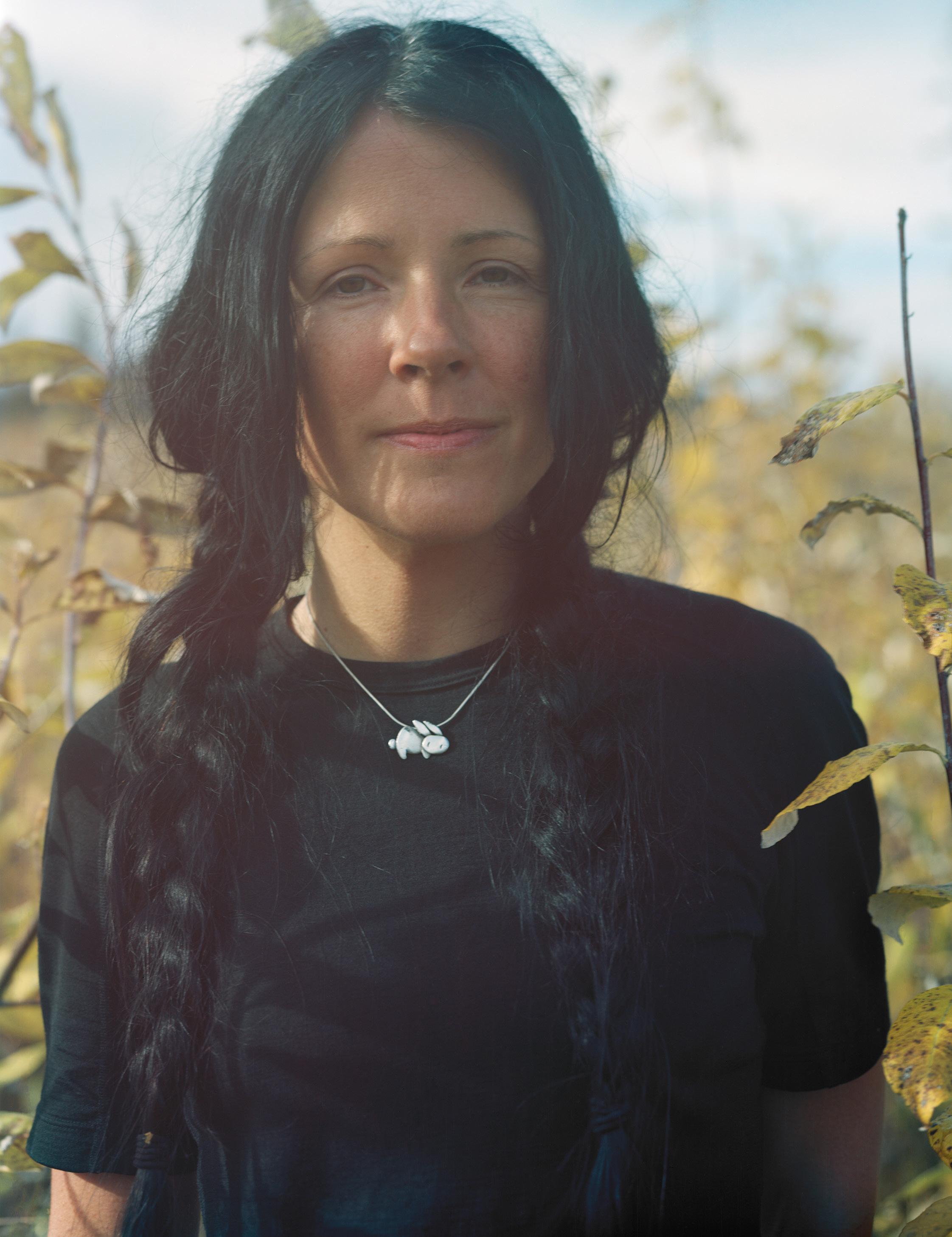 PHOTO CREDIT: CALLAN JAIDA JONES
PHOTO CREDIT: CALLAN JAIDA JONES

Carleigh Baker’s voice betrayed emotions once during our conversations, when she talked about her parents. Specifically, when she talked about the first time her parents had to be evacuated from their home in Merritt. This was during the wildfires in the heat-dome summer of 2021, at the height of the COVID-19 pandemic.
“I got a phone call at 9:00 o’clock at night, which is late for me, but absolutely unheard of for my parents,” she explains. “And I tried to call back, and I couldn’t get through, so I just checked. They live in Merritt, which most years now is circled by fires. But I knew it was bad, so I checked in for about half an hour, and every single highway out of Merritt was blocked by fire.” She tells the fraught tale of walking her seventy-year-old parents through the evacuation and encouraging them, along with her sibling, to come stay with her and her (now) husband in their one-bedroom apartment in Vancouver. The event is fictionalized and retold in the story
“I was really worked up about things, and I was aware that I didn’t want readers to feel helpless.”
away the inspiration for another story in the collection, “Displacement.”
“I have said to people, if you’re not angry, you’re not paying attention. And you know, I do pay attention, but I have to keep a handle on my anger because I’m not as good at channelling it as some people. Often, I get very angry at myself. I get angry at people who have nothing to do with the situation. I don’t do well with that. I don’t see that righteous anger, and how it pushes people to do things [that are productive], but with those two stories, I was furious.” Ever thoughtful, she pauses a moment to consider and asks, “I mean, what was I angry at?” before providing the answer herself, “I was scared, I guess. And the anger was the coping mechanism.”
Having faced a bit of writer’s block during the early stages of the pandemic, Baker found herself suddenly freed by that anger. “I decided to just go and write,” she explains. “I don’t say it very often, but there’s a viciousness in that writing for me, not towards anyone, but I wrote it with clenched teeth. I was really worked up about things, and I was aware that I didn’t want readers to feel helpless. And when I first finished the manuscript, I truly thought I had written something quite hopeful. But, of course, it wouldn’t have had any teeth if I hadn’t taken us through the terrible stuff.”
“Outraged on Your Behalf” in Baker’s new collection Last Woman. However, she’s quick to point out, “it was more uncomfortable, frankly, than what is in the story.”
Despite how harrowing the real-life version of this story is—the helpless fear of a fire so many kilometres away, the aging parents frantically driving down highways in hopes that they’d been cleared, the five adults crammed into a Vancouver apartment—that’s not what got Baker upset.
“So, on top of feeling very helpless and angry, I also felt like a bit of a failure as an adult, that I am over 45 now and didn’t have a two-bedroom house so that I could take care of them. I could give them ….” she trails off here momentarily, turning away from the computer screen. “Oh, I still get a little …. It’s going to pass,” she assures me, gathering herself. “I get emotional about it because it’s just so frustrating.”
As she pulls herself through this moment, the sadness is replaced by anger. “And then they were evacuated due to flood and were out of their house for eight months, and it infuriated me,” she explains, giving
This moment speaks clearly to the themes and relevance of this new collection of short fiction: environmental degradation, gentrification, the housing crisis, and the growing inequalities in our society that seem increasingly impossible to overcome. The hopelessness followed by the anger. The stories are also cathartic, controlled, told with a skill and insight that is comforting. There is a righteousness and an insightful dark humour to them: the reader is being spoken to, warned, scolded, and also entertained. It’s a journey, this collection, for the reader, for sure, but one can see the journey that the writer took as well.
“That felt very good to say,” Baker says, fully gathered again. “I feel like you just acted as my therapist there for a moment.”
Carleigh Baker is a Vancouver-based nêhiyaw âpihtawikosisân and Icelandic writer. Her debut short story collection, Bad Endings, was published by Anvil Press in 2017 to wide acclaim. Bad Endings won the City of Vancouver Book Award and was a finalist for the Rogers Writers’ Trust Fiction Prize and the Emerging Indigenous Voices Award for fiction. Praised for their autofictive elements, Baker’s stories are firmly rooted in the contemporary, when, even at their most ludicrous, they feel grounded in current issues that are affecting real people in real ways.
[INTERVIEW] // 58

With Last Woman, Baker claims to have moved away from the autofiction that dominated her first collection. In Bad Endings, she says, “I tried to never present anyone exactly as they [are]. I had to keep in mind that I wasn’t solving this human mystery that I was grappling with. I was just writing a fictionalized conclusion to it.” She explains that one of the important autobiographical explorations of that first collection was in exploring the idea that her “truth was not the absolute truth.”
In Last Woman, “I get into the world a little bit more,” she explains. “I get outside of my navel-gazing and into the world. I don’t think I’ve ever felt more like [my truth isn’t the absolute truth] than I have over the last little while. We’re in a post-truth situation socially, and I still regularly fall down research rabbit holes trying to learn about something that I see being discussed in the media that I don’t understand. It’s different now,” she ruminates. “I guess that it used to be people I would predominantly worry about, but now it’s social things and things to do with our health, our mental health [...] I’m more aware than ever about how little I know about the truth.”
Despite this new outward focus, the stories still feel deeply personal. In part because of the assured writing and crystalline characterization, but also because, of course, when contending with the themes and issues that Baker deals with, it’s hard to disentangle oneself from the process. The aforementioned “Displacement” and “Outraged on Your Behalf,” for example, feature elements of her life. “I keep saying I’m not writing autofiction anymore, but the essence of my parents is very heavy in those stories,” she admits, before quickly adding, with a laugh, “I’m sure my mom will be like ‘you don’t think I’m that nasty, do you?’”
Other stories contain the focused observation of lived experience as well, with good reason, it turns out. The title story of the collection, for example, feels as if it could be about Baker. “‘Last Woman’ was a nonfiction essay,” she admits. “I wrote it for a nonfiction class, and I probably tweaked a few things here and there, but that is, you know, nonfiction, too: It’s not reportage. The dark places that the character goes to were how they appeared in my head.” This piece of creative nonfiction was transformed into a short story through an invitation to supply a story to the 2017 Short Story Advent Calendar that publisher Mike Hingston has put together since 2015. “I read through [‘Last Woman’] and I was like, yeah, that’s fine. And it’s been fiction ever since.”
The opening story, “Midwives” went on a similar journey from nonfiction to fiction. Detailing two Métis women lugging a canoe through a challenging Aberdeen Canyon portage in the Yukon, the story has
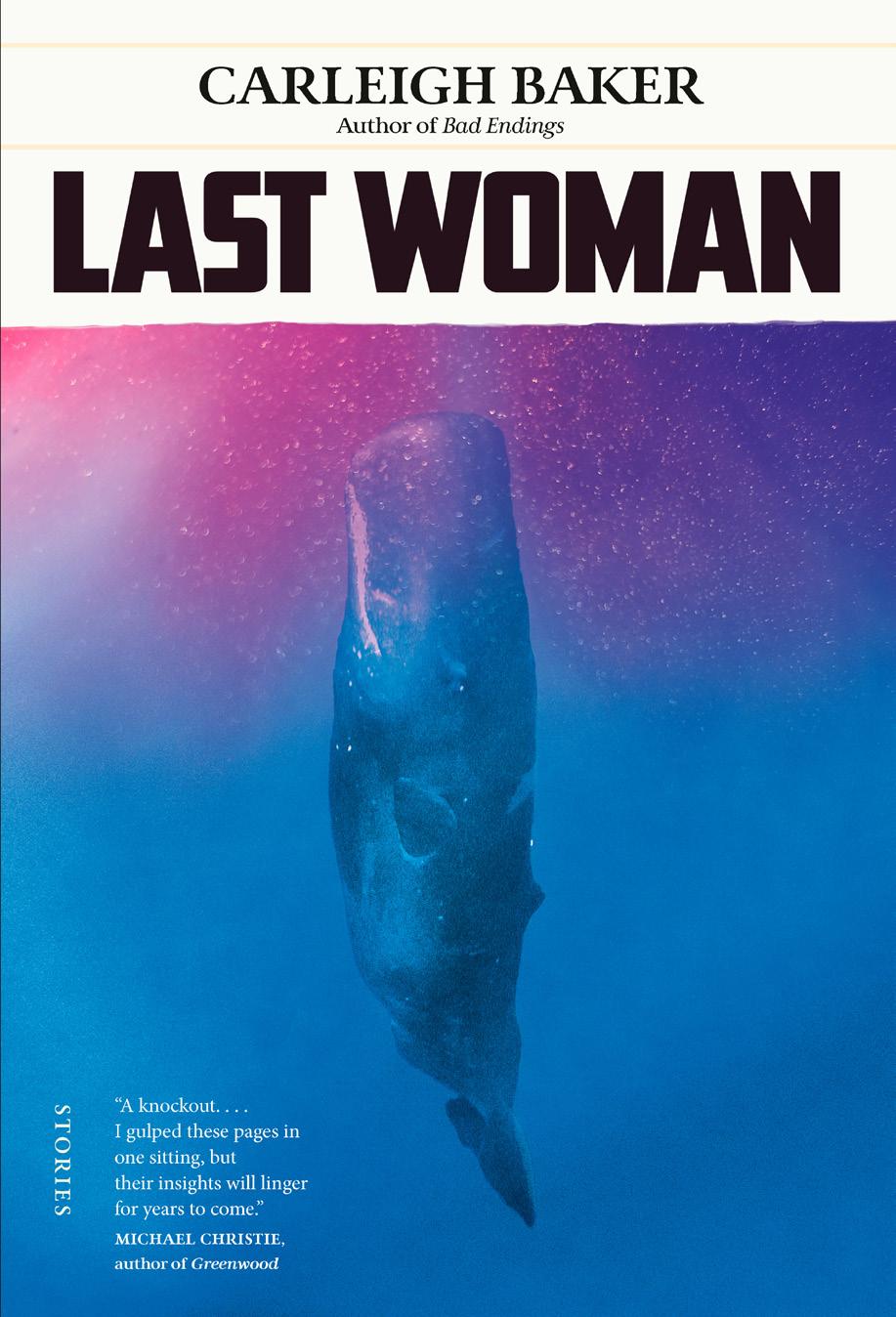
obvious echoes of Canadian and Métis history, echoes that are smartly (and humorously) acknowledged early in the story: “We should be carrying the canoe over our heads,” the narrator concedes, “but it’s too damn heavy. That’s what the guys do. That’s what the old-timey Voyageurs were doing in the artist renderings I googled before the trip.” This reckoning with the canoe and with the imagery is part of an attempt by the character to reconcile her Métis descent with the reality of her upbringing: “Convincing myself that I have some kind of blood connection to the land, even though I come from the city. Dumbass. I think the only thing I hate more than the land right now is the goddamn canoe.”
Another similarity between the two collections is this light touch when it comes to handling identity. Baker’s characters simply are who they are, defined as much by how the world responds to them as they do to it.
In the past, Baker has spoken about having a feeling of responsibility. In Maclean’s, after her 2017 nomination for the Rogers Writers’ Trust Fiction prize, when asked if she considered herself a political writer, she said, “I consider myself a writer with responsibilities.” Continuing, she defined what these responsibilities are: “It’s my responsibility to be a good community member, and to elevate the voices of Indigenous writers. To not take up too much space, be honest about who I am and
[INTERVIEW] // 59

where I come from, and to help build and maintain relationships between the two worlds I live in.”
Asked if she still feels this way, Baker doubles down. “I think that the basic idea of me being a Métis person and a white-coded person and a reconnector is that I’m still a writer with responsibilities, and I still feel that’s a part of my process.” This careful self-awareness has allowed her to clearly define what role she has and what she will and won’t do. “If someone comes to me and says, ‘Hey, we’d love to have you speak about this situation,’ and I recognize that I’m not the best person—it involves traditional knowledge or something like that—it’s then up to me to say I’m not going to take up the space at the speaking engagement, and here’s a whole bunch of other people that I know that would be great for that.”
It’s a balancing act that many people in similar situations at this particular moment in time struggle with.
“I’m starting to recognize that maybe I’ve been so afraid of doing harm that I might have frozen myself sometimes. But I think for me it’s better to do that than to just run in and [potentially] do that harm.”
While many like to think we live in a time of greater understanding, there is still an expectation foisted upon Indigenous folks, no matter where in the process of disentanglement from settler-colonial erasure and forced assimilation they may be. This expectation is a soft form of pan-Indigenization, where the complexity and diversity of modern Indigenous communities and Peoples is often overlooked, and some Indigenous folks—
“I’m feeling a little less interested in performing my identity for nonIndigenous people.”
particularly those who are mixed or Métis or who were scooped or just didn’t grow up on rez—feel a pressure to conform to a certain ideal or understanding of how Indigeneity should be expressed.
“I’m feeling a little less interested in performing my identity for non-Indigenous people,” Baker notes bluntly. “There were several years there where I got the feeling that [folks at] events really wanted a specific narrative from me, and I’m feeling less inclined.
“It’s one thing to talk to your community, you know, to identify yourself to your community members,” she continues. “Or when someone says, ‘Where are you from?’ that is such a complex question, but it’s such a gift because that’s someone saying, ‘Hey, I want to understand where you fit into things.’” Baker has also come to accept her role as a bridge-builder. “It still means a lot to me when a Métis person or reconnector comes up and says, ‘Hey, yeah, I’m going through this, too, and I’m just so worried about making a mistake’ and you get to have a talk with someone about that.”
However, she also stresses that these pressures have not come from her team or her publishers, and she knows that in that regard, she’s been lucky. “I’ve definitely spoken to other writers who have been told that their book was not ‘enough,’” she says, recounting a time when she was at the Banff Centre for the Arts and listened to a Black writer discuss experiencing this sort of pressure. The writer was asked, “Can you make this novel about a young Black woman more Black?” Baker recounts with exasperation. “I think the conversation came up because I was well into that stage where I thought a character just being who they are was enough. And I tell that to my students all the time,” she explains, remembering a South Asian student of hers asking if she should put more markers of her South Asianness into the story, like food or something. “And it’s, like, well, this is a character [who is a] South Asian woman, so it’s a South Asian story.
“I’m really lucky that no one has said anything to me from my team,” she reiterates. “I do think that my identity is important, but I’m not sure that I want to be completely focused on it.” She pauses for a moment, “I’m positive that I don’t want to be completely focused on that in my writing […] That identity is always there. It’s a part of the writing, but yeah, I wanted to move in a different direction from that.
“I’ll just say that this question of how did this thing that you wrote, how does it relate to your indigeneity? It gets harder and harder to answer those questions, and I’ve worried about that as a reconnector. But I’ve sat on a panel with a Cree writer and [we were asked], ‘Why did you write about this and is it related to your indigeneity?’ And I said no, I think I just did it. And immediately I thought, that’s not a very good answer. But then the Cree writer had the same answer: ‘I don’t know. I just do it.’ So I thought, okay, okay, maybe relating everything to our identity is not useful.” She pauses again. “I definitely don’t think it’s useful.”
It’s a question that can be exhausting as it implies a certain pressure to be representative, and not only that,
[INTERVIEW] // 60

but to be representative of a certain perception and, ultimately, to endeavour to be something other than just a writer. But as we navigate this challenging subject, it becomes apparent that the pressure is almost exclusively from the outside; it’s not something that Baker worries about when she’s around other Indigenous folks because how one should be Indigenous is not something that’s often questioned in those instances and in those spaces.
This speaks in many ways to the audience of her writing. The performance of indigeneity is not for other Indigenous readers, even those who are reconnecting or white-coded. Baker sees her own audience as one that is much broader than identity, reflecting her desire to move outside of herself in the creation of this collection to focus more on social issues.
“[The audience] might change from book to book […] but I’ve thought about people who are lonely; there are so many, and me sometimes, too, because I’m good at managing to be lonely in a room full of people.” She eventually settles on “isolation.” “I think a lot about that,” she confirms. “I’m hoping that the reader will feel some element in some story […] I was even a bit aspirational with Last Woman where I hoped that my readers would feel a bit of hope at the end, and so I thought a lot about that.
“What I hope the reader will feel when they get to the end …. And not necessarily the end of a single story, because the stories are all over the place for sure. I want to take them on a good ride, so there’s some actual tragedy in Last Woman where I was trying my hand at that, which in my view is something that is inevitably going to not have a happy ending, but [I hope] that [readers] feel satisfied with the ending. George Saunders does some brilliant writing about that: you can get away with an ending that isn’t happy if the readers find satisfaction in that, well, that’s where [the story] was going. That’s the only place that story could have gone.”
“Tragicomic” is the term Kathryn Mockler used to describe Baker’s writing on the 49th Shelf blog. “That concept rocked my world,” Baker admits about the designation. “Like, of course it is,” she says, “but I hadn’t thought of it that way before.” This may be the kind of reader she envisions: “a reader that wants to laugh and cry. My ideal reader would be someone who sees dark comedy as healthy.” She’s quick to acknowledge that this may be a generational thing and is aware that some younger readers’ opinions on dark comedy may vary, and she gets that. But ultimately, she concludes, “I’m hoping to write for people who want to let out a little bit of emotion and then want to have a good laugh. Maybe they’ll do both at the same time.”
Whoever her readers may be, they are—at least for the moment, as Baker does also have a novel on the way—readers of short stories. In a country that has produced some of the finest short story writers in the English language (Alice Munro, Mavis Gallant, Alistair Macleod, Bill Gaston), Baker’s publishing of back-toback collections is an exceedingly rare occurrence, nearly unheard of in modern publishing. (The only writer either of us could think of on the spot who seems to be focusing solely on short fiction is Danila Botha.) Realistically, it simply comes down to economics: novels sell better than short stories and so they pay better as well, which is why fantastic contemporary short story writers like Lynn Coady and Thomas King have only two collections to their names.
“I just want to write short stories forever,” Baker says with enthusiasm, but notes the difference in the advance between the short story collection and the novel, which is significant for a working writer. “I completely understand why people want to write novels now,” she admits.
“I’m hoping to write for people who want to let out a little bit of emotion and then want to have a good laugh.”
“But I’m going to keep writing collections because that is the best writing for me, that is my favourite writing.”
As it is with most short story writers in the late 20th, early 21st centuries, Baker cites Raymond Carver as a foundational influence. “That feeling of getting through a Raymond Carver story,” she begins, describing the experience of reading the revered short story writer, “and not even entirely knowing what’s going on or what just happened, but that I’m feeling something and that I want to go back and read it again and again.” It’s a feeling most of his readers will be familiar with. You can see the influence of Carver in Baker’s stories, perhaps not always in content (though sometimes in that as well), but in style and form—in the ability to turn a seemingly simple or obvious story into something profound.
This formalistic influence is perhaps most obvious in “Where Were You?” an exquisite coming-of-age story set within a where-were-you? story. Two teenage girls
[INTERVIEW] // 61

learn about climate change through the discovery of the damage done to the ozone layer. It’s a short, tight, late-’80s period piece, where the character’s maturing turns masterfully on the replacement of an aerosol can of Aqua Net hairspray with Ice Mist. Fittingly, this story comes immediately after “Longhand,” another story about young girls. Working against the more obvious placement, they come very late in the collection.
Baker worries about these stories coming across as sentimental, a trap coming-of-age stories can fall into. She describes building a collection in a way that draws readers in and entertains them before turning to more emotion-driven stories such as these. The stories “have to earn their places,” she explains. “The story might be a bit sentimental, might not be as literary, depending on how you see literary […] These are stories about young women, and I’m protective of other young women, and, as it turned out, I was protective of those stories. I put them in a spot where I was like, the readers have either put your book down, said you’re a hack, and are never coming back, or they’re on board with you.”
Jared Bland, who was the editor of the collection before Melanie Little, told her not to worry: “I don’t think it’s possible for you to write sentimental,” she recalls being reassured.
Baker cites Haisla/Heiltsuk writer Eden Robinson as another short-story influence, despite Robinson writing only one collection, her 1996 debut Traplines. “In the
“I do like to end the story at the precipice, with the character standing at the precipice looking out over the possibilities.”
Cambie and King Edward in a dying neighbourhood destined for gentrification. To get away from her abusive boyfriend, the character wanders the abandoned buildings, eventually befriending a young man, a local graffiti artist whose tags she recognizes. The layered intricacy of the story comes from the connection made to the Marpole midden, a 4000-year-old xʷməθkʷəy̓əm burial site that is now a protected historical site. “I had to stretch the neighbourhood a little bit to get into Marpole, but I knew about the Marpole midden, and so while I was thinking about it, I thought, okay, so you’ve got your characters, but also what is constructed as good and what is constructed as evil in this story, and I thought of gentrification right away.”
Gentrification modernizes and covers over historic neighbourhoods, so it matched well with the themes of death and displacement that build in the story. Baker was also careful when telling the history of the midden. “I used history that was available on websites, stuff that was essentially public domain because it’s not my story […] It’s not up to me to tell xʷməθkʷəy̓əm histories, no matter how good my intentions are, so I used material that was readily available, shared by xʷməθkʷəy̓əm people about that area.”
While the story is in first person, there is a shift in the section that describes the history. It was an intentional shift in tone and word choice. “There are sections in that story that are stilted, they sound like historical sections, and it’s not my usual conversational, chatty voice, and I did that on purpose,” she explains. “It’s about, literally, museums pulling bodies out of sacred burial grounds and selling them to various museums around the world. I was very nervous about being too sensational with that as well, so I had to keep it from being sensationalized. Another writer could have done it differently, I assume, but I had to keep this section kind of stilted to signify to the reader that we’re changing tracks a little bit in those sections.”
moments when I am writing and I’m thinking it’s pretty raw,” Baker says she thinks of Robinson. “Look at Eden now, but she’s always been brilliant. Even when she was writing those stories […] You’re still doing good work at the short story level, and there’s still a lot of complexity available to you there.”
One of the most complex stories in the collection, both formally and in terms of the use of language, is “The Midden.” Written for the collection Vancouver Noir, the first-person story is about a woman in an abusive relationship living in a crumbling home on the corner of
While “The Midden” is one of those stories that can come across as simple, rereading it reveals intricacy in story building and in that fascinating use of varying language. “I consider myself a prose stylist who’s not grasping for fancy language,” Baker says. I think I spend a lot of time with my sentences, but I’m trying to make them conversational and accessible to readers. Even though the conversational style might suggest that there’s not a lot going on here, I’m doing my best to have a lot going on in these stories.”
She acknowledges that although she employs inside jokes or Easter eggs for the literary crowd or those in academia (which gets skewered wonderfully in “Catechism”), she still wants her stories to be accessible to
[INTERVIEW] // 62

anyone so that no one goes away thinking “‘Well, isn’t this some high-falutin’ writing that I’m having to deal with!’ I want to connect.”
The ability to connect is the greatest strength in the collection as a whole. Perhaps the only stories that differ in this regard are the series of broadly satirical pieces told from the point of view of aliens dealing with billionaires who’ve launched themselves into space to escape the hellscape of their own creations on earth. In his mostly glowing review of the book, Steven Beattie writing in the Shakespearean Rag, criticized these stories as being “too broad to be effective.” While that may be true in isolation, thematically, they feel in many ways like the logical endpoint (and sometimes counterpoint) to the themes in the book: regular folks doing what they can to survive the ravages of late-stage capitalism. Their placement in the collection is key too. Just when things start to feel a little too heavy, one of the three “Billionaires” stories pops up like comic relief.
Baker cites Douglas Adams and Kurt Vonnegut as inspirations for these, and you can see that in the absurdity-with-hints-of-the-bleak that pervades them. “Where I put them [in the collection], it was intuitive,” she recalls referring to them as a “steam valve.” “You’ve got to give people an opportunity [to let off steam].”
Aside from those forays into the more fantastical, the stories are grounded in the real and the everyday. The Irish writer William Trevor famously called short story writing, “the art of the glimpse,” and that is where Baker shines, in the ability to evoke so much with so little: we only glimpse the characters’ lives and often leave them when they are on the precipice of change.
“It’s the classic stuff that we teach,” she says about this view of short story writing. “It’s a character at a moment of crisis. What I do is what lots of other short story writers do, but not all. I’ve broken the rule a little bit in that I do like to end the story at the precipice, with the character standing at the precipice looking out over the possibilities.
“I am one of those writers who thinks about the reader, and I don’t want the reader to feel dissatisfied with the end of the story, but I do hope that the reader will think about what’s next for the character, but also maybe if they see themselves in the character, what’s next for them? That there’s some time to think about that character’s position, and then in a super best-case scenario, maybe go back and read it again, because if I’ve done my work, there might be more for them to discover next time they go back and read it.”
She admits that the appreciation for the kind of mystery that a short story can evoke is a process of maturing. “These stories used to drive me nuts when
I was a younger reader; I used to be so frustrated. But I think sometimes maybe I couldn’t quite articulate [how] something had happened inside me, something emotional had happened inside me and that it’s a very Carleigh response to just say, ‘Well, I don’t understand this, so it’s garbage.’ But as time progressed, I realized that, well, that’s a cool feeling and is a sign that the story stirred something up in me and I would love for that to be what [my] readers feel,” she says.
With a new collection out and a novel on the way, Baker herself seems to be a woman poised on the precipice of change. Physiologically, she feels she is, but this idea of aging also opens up the concept of broader changes in her life. “People in my age group are talking about our parents dying; it’s very uncomfortable. I guess it’s a very uncomfortable time […] It would be easy to be very cynical about it. Or just outright depressed about it,” she says, but then shifts abruptly into the more positive, “But there’re other things too, like my general confidence and my creativity feels more confident than it ever has, and I am more inclined—even as I freak out about this book and being worried about and how it’s going to be received—I feel more like I’m about to start doing things in a way that’s going to make me proud creatively. I can’t even be any more specific than that because I’m not sure yet. But yeah, it’s an uncomfortable precipice, for sure. What comes next is a big question for me right now.”
Just as it is with this collection, as soon as things feel as if they are getting too heavy, there’s a wry turn. “And everything requires stretching now, you know?” she says in exasperation. “Just going for a little walk around the neighborhood requires stretching. Waking up requires stretching, like, Oh my God.”
CARLEIGH BAKER IS AN NÊHIYAW ÂPIHTAWIKOSISÂN / ICELANDIC WRITER WHO LIVES AS A GUEST ON THE UNCEDED TERRITORIES OF THE XʷMƏΘKʷƏY̓ƏM, SKWXWU7MESH, AND SƏL̓ILWƏTA PEOPLES. HER WORK HAS APPEARED IN BEST CANADIAN ESSAYS, THE SHORT STORY ADVENT CALENDAR, AND THE JOURNEY PRIZE STORIES SHE ALSO WRITES REVIEWS FOR THE GLOBE AND MAIL AND THE LITERARY REVIEW OF CANADA. HER DEBUT STORY COLLECTION, BAD ENDINGS (ANVIL, 2017), WON THE CITY OF VANCOUVER BOOK AWARD AND WAS ALSO A FINALIST FOR THE ROGERS WRITERS’ TRUST AWARD, THE EMERGING INDIGENOUS VOICES AWARD FOR FICTION, AND THE BC BOOK PRIZE BILL DUTHIE BOOKSELLERS’ CHOICE AWARD. ///
[INTERVIEW] // 63
REVIEWS

TOWARD AN ANTI-RACIST POETICS
By Wayde Compton (University of Alberta Press)
Reviewed by Shazia
Hafiz Ramji
Toward an Anti-Racist Poetics by Wayde Compton is a collection of the 17th annual Kreisel Lecture hosted by the Centre for Literatures in Canada (previously known as the Canadian Literature Centre) at the University of Alberta. In nine chapters, the esteemed author of several books, including The Outer Harbour: Stories and 49th Parallel Psalm, confronts quandaries in poetics such as universalism, lyric and postmodern literary camps, and the loneliness of poets of colour.
In the opening lecture, “Windows,” Compton gives powerful insights on seminal ruptures in contemporary North American poetry and poetics in the last two decades. Writing about the conceptual poet Kenneth Goldsmith whose poem “The Body of Michael Brown” presented an altered version of the autopsy report of Brown—the unarmed teenager whose murder at the hands of a white police officer sparked the Black Lives Matter movement—Compton questions, “At what cost this dialogue unfolds [and] for whom this discussion is productive.” He notes that such performances are possible because self-described “anti-racist” poets like Goldsmith and Vanessa Place do not comprehend themselves as white artists.
Compton engages with his own identity as a mixedrace man and notes that he has “never felt that [his] subjectivity is universal or outside a cultural or racial position.” He insists on the importance of positionality, a “necessary step to engage in anti-racist work” as it allows writers in the margins to “un-gaslight” themselves from the discourse of “racism-without-racists.” The somersaults involved in articulating such nuances are representative of Compton’s generous oeuvre to date.
Compton offers three “exigencies,” defined as urgent demands or needs, toward an anti-racist poetics. The first of these is “interpositionalism,” or “the
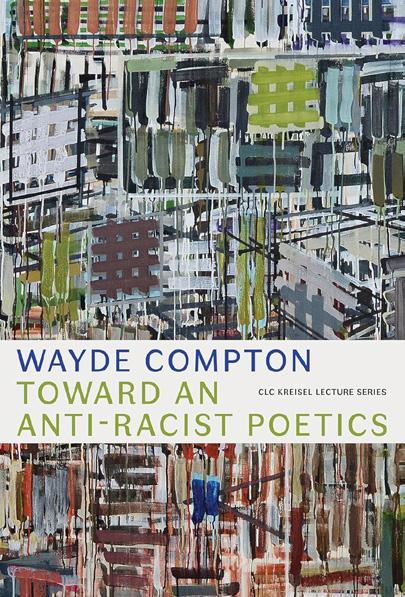
acknowledgement that there are multiple cultural positions” to avoid the fallacy that the “white cultural” is the “universal cultural.” The second is “temporal interpositionalism” to acknowledge that a chain of influence of any given work is not restricted to the chronology of Western lineages. Finally, he calls for “personally inclusive praxis,” which emphasizes the importance of positionality: “Until a reader can identify that their position is indeed a position, rather than a falsely appreciated universalism, then it is unlikely that they will be able to engage interpositionally, and will be prone to misappreciation.”
It is refreshing to have such applications toward an anti-racist poetics stated with clarity and bluntness. While academics and others may find analogies in Michel Foucault’s conception of genealogy or Pierre Bourdieu’s idea of the “field” to discuss a network of relations and influences, Compton’s contributions are grounded in the perspective of a racialized writer and mentor speaking to his communities.
Compton’s personal anecdotes, such as those discussing the racist categorizations of his adoption papers, how he felt like an autodidact in both his scholarly and creative work because of a lack of “Black-identified aesthetics,” and the feeling of being “intellectually orphaned” will resonate with many writers of colour.
The collection also delves into a sustained argument about the literary camps of the lyric vs. the postmodern or experimental, but the immensity of Compton’s work is in the words themselves. They say that once you name something, it no longer has power over you. Compton has done the unparalleled and painstaking work of detailing several longstanding complexities in poetics that robbed power from many, ultimately shaping the future as a space of possibility and reclamation.
REVIEWS // 64

THE KING OF TERRORS
By Jim Johnstone (Coach House Books)
Reviewed by Keith Garebian
The King of Terrors sometimes shimmers with dark introspection about the fear of impending death. Its author, the extremely gifted poet-editor Jim Johnstone, had faced near extinction due to a brain tumour, and his fear at the time mirrored the spreading fear induced by the COVID-19 pandemic. If the poetry was simply about death, the theme could have been handled as a simple enchantment—much in the manner of Henry Scott Holland (Professor of Divinity at Oxford prior to his appointment as Canon of St. Paul’s) who famously passed off death as a disappearing act, a slipping away “into the next room.” “Nothing has happened. Everything remains exactly as it was. I am I, and you are you, and the old life that we lived so fondly together is untouched, unchanged. Whatever we were to each other, that we are still.” Johnstone quotes Holland in an epigraph as if presaging how something can remain fixed in time and space, but his perspective is ironic because, contra Holland, death is not “nothing at all,” and even an intimation of its encroaching presence changes how we seem to others and even to ourselves.
But The King of Terrors is not really about death. Though the king of Johnstone’s terrors is disease (specifically a left frontal-lobe meningioma), other terrors exceed the body’s vulnerability by overspreading the mind with spectres and realities of incertitude and instability. As in his earlier book The Chemical Life, which dealt with violence in the natural world and the self and where mind and body were juxtaposed in disorder, The King of Terrors deals in a hauntingly stark but sometimes lyrical confessional manner with shocks of biology and mind.
The first poem “Future Ghost” incises the page with sharp images that suggest phantasmic transformations. The many trees on the other side of the lake in
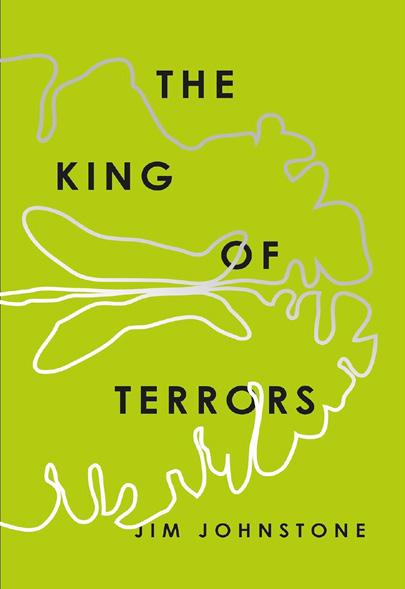
Anstruther stretch out branches as if they were glass, and the poet’s voice is haunted by instability of will as it attempts to formulate a confession or apology about a troubling personal relationship. Lake is seen as door, as glass, as “second home”; the poet-speaker feels forever vulnerable about his body and mind. The timing is ironic for it is the time of the pandemic when “the virus is perfect, hell-loving, / always an inch from death”— exactly how Johnstone feels, especially being cut off during the lockdown. His fear is a fear that becomes “first and last,” a fear that runs free, as when he mistakes his wife for a bird of prey.
Johnstone’s titles impart a sense of terrors: “Future Ghost,” “Hauntology,” “Kraken,” “Little Deaths,” False Finish,” etc. His mind magnifies phobia: “Say ‘I want’ / and the ceiling will loosen, twist / off, and disappear.” Boundaries break down in the sky and within his own vocabulary, and he is caught between action and passivity, synoecism and stasis. Dreams can be “the cyclone’s whip” as eyes open “to sheets tossed up / like mountains, / bodies peaked.” (“Hauntology”). The same poem quotes Jacques Derrida’s “alreadyalways absent present,” prompting a meditation about whether disease is the disruption of presence or an erasure signifying absence.
Johnstone’s technique is strong. It constructs tender, touching confessional poems about family (“Three Sons”) and love (“Invitation [Set To Summer Radio]”) in the midst of awesome terror. And the deft octet “Little Deaths” shows how the slightest alteration by way of a single extra syllable in the final line can make a poem crystalline:
Hovering over my body you are a river, a storm, a tent open to the sky beyond. Hovering over my body— together, again, after a day— we perform the season’s end. Hovering over my body you are a river, a storm, intent—
REVIEWS // 65


But the prevailing form is anti-lyrical, as is especially striking in “There is Nothing More Invasive Than Snow,” where the fluctuations of language and form, and the instability of the poet’s responses to imperatives of biology and love tilt towards emotional ambiguity. Victimized by pain as cruel as a guillotine, his skull virtually palmed in the manner of Yorick’s, but “Rewired, rewound,” the poet resurrected in body and will urges his lover to “Look / at me. Look away.” A contradictory urge. Is it because of guilt, shame, horror? Then then there’s what is probably the best poem in the book: “SliceSelective Excitation (Brain Scans 1–5).” Starting with a fragmented apology for not being his true self, where the splintered grammar signifies the linguistic instability caused by an afflicted brain, the poem becomes a visual construct in Part 2 via a silhouette drawing of a brain slice (filled with incomplete poetry) and in Part 4 via another outline—this one of the actual tumour (also with parts of a poem embedded within). The fifth part concludes the perilous fluctuation of language, though a reader is prone to question Part 3, a prose-poem about the “uncontrolled spread my identity, my self,” where thought and syntax are far more developed than the language in all the other sections. Perhaps it is because despite the pain (“the tumour a penny dropped from a great height,” “a planet pressing down”), he feels the freedom to rearrange thoughts into “the freedom to choose”? Perhaps, too, poetry is the final consolation for different losses. Liar at times in his life—as are we all— he is a lyrist who has emerged from an underworld of immense suffering in body and mind. His book is evidence of poetry and love’s “saving grace.”
MY EFFIN’ LIFE
By Geddy Lee (HarperCollins Canada)
Reviewed by Andrew Scott
In 1982, when I was barely twelve years old, my mother, who played what is sometimes pejoratively called “cocktail piano” in the Imperial Lounge at the old Inn on the Park hotel on Leslie Street in Toronto, used her music industry connections to snag us a coveted pair of grey seats at Maple Leaf Gardens to hear the rock group Rush.
Like most Canadian boys my age and demographic (white, urban, and hockey-crazy), I loved the band. The lunchroom at Bessborough Drive Public School was often the site of impassioned conversations about whether Jon Bonham, Stewart Copeland, or Rush’s Neil Peart was the greatest drummer of all time. The right answer, of course, was Peart. And so, when my mom surprised me that November afternoon by picking me up from school in our faux-wood panelled station wagon while clutching two tickets to the Toronto stop of the trio’s Signals tour, I was beyond thrilled. In large part because of that concert, music continues to be a meaningful part of my daily life.
Music, be it ritualistic, patriotic, escapist, cathartic, didactic, or otherwise, holds the promise of truly transformative power for many. Such was certainly the case for Gershon Eliezer Weinrib, better known as Geddy Lee, Rush’s bassist, vocalist, and front-person, who has penned a fascinating 512-page autobiography, My Effin’ Life. Growing up in the bedroom community of Willowdale, Ontario, as the son of Jewish immigrants, rock music provided an escape for Lee from what today we would call the intergenerational trauma of the Holocaust experiences of his parents. They were survivors of the Starachowice ghetto, Auschwitz, Dachau, and Bergen-Belsen. In addition to the general angst of being a self-described “nerdy kid” trying to find one’s place in the world, hearing his mother’s near-daily stories about
REVIEWS // 66

her upbringing, coupled with the premature death of his father when Lee was just twelve, proved formative. Similarly foundational was, as the eldest son, the subsequent religious pressure to appropriately mourn his father’s death by reciting the Jewish prayer for the dead (Kaddish) three times a day for eleven months while avoiding all temptations including music and dancing. Music provided an escape, offered Lee purpose, and helped reify an identity entirely different from that of his parents. As Lee repeatedly makes clear in this revelatory book, these early years were foundational to the person and musician whom he ultimately became. It was because of these formative experiences that music was elevated to a place of such import. Through the transformative power of music, Lee found camaraderie and community with childhood friends Alex Lifeson and original Rush drummer John Rutsey, jamming blues rock and writing ersatz Led Zeppelin and Bad Company tunes in his suburban family basement. Music was the social lubricant needed for Lee to meet his high school sweetheart Nancy Young, to whom he remains married to this day and who snapped the intimate cover photo that adorns the book’s first edition. And, perhaps most importantly, music provided a cathartic outlet for Lee to channel the harrowing stories of his parent’s early life into an admittedly polarizing vocal style that is part Torah incantation Bar Mitzvah boy and part banshee wail. “I was releasing all those suppressed emotions just by stepping up to the mic and screaming,” writes Lee.
There is much to like in this book. There are, of course, the predictable “war stories,” of a band both on the make and on the road in the early-to-mid 1970s. They played gigs, memorable and otherwise, trying to forge a path that ultimately led to a meaningful and lucrative career as one of the most sui generis rock bands of all time. And while such de rigueur tales are entertaining and provide enough inside-baseball minutiae to satisfy even the most ardent of Rush fans,
it is the stories of World War II and Lee’s family experiences therein that comprise the book’s earliest chapters and make My Effin’ Life such a powerful read. Thankfully, Lee has not genuflected towards the cult of Marie Kondo. As such, from what I understand to be the cluttered office of his Toronto home in which every Rush set list, ticket stub, and the various ephemeral artefacts of memory still exist, a rich panoply of stories have sprung forth, providing both insight and inspiration to Lee and co-author Daniel Richler to pen such a compelling narrative.
Although Lee’s upbringing and life story was perhaps not wholly unique, there was certainly a paucity of obvious models in the music business to illuminate a clear path forward. Accordingly, Lee, and his childhood friend, current self-described “BFF” and long-time Rush collaborator Alex Lifeson—himself a product of an immigrant “new Canadian” home—carved out their own unique career and life path. Starting out by channelling obvious blues rock influences into an eponymous 1974 album that, while satisfying, remains asymmetrical from the majority of Rush’s ultimate discography, the group soon expanded their oeuvre to include a new drummer (Peart) and an amalgamation of progressive influences that included fantastical themes, shambolic and virtuosic musical playing, and lyrics that are equal parts teenaged suburban angst, science fiction, and Ayn Rand–inspired screeds on individual responsibility. An unlikely amalgam to be sure, but for the legions of worldwide Rush fans, of which I consider myself one, an intoxicating elixir. As the proverb goes, necessity is the mother of invention, and just as Lee helped create a sound, career, and musical legacy perhaps unlike any other, My Effin’ Life is a biography unlike any other as well.
Finally, returning for a moment to the book’s early chapters, Lee recounts how he and his siblings had the opportunity to accompany their mother back to Poland and Germany, and emotionally, to the BergenBelsen camp. According to Lee, the trip provided an
REVIEWS // 67

opportunity for his mother to reflect upon all that she had accomplished post-war, and to get a sense of closure from what had happened earlier in her life.
I got the sense that with this book, the telling of his family’s story of resilience and triumph, as well as the story of Rush and the emotional journey that was the passing of Peart in 2020, My Effin’ Life provides closure for the author as he embarks upon what undoubtedly will be a new and exciting life chapter.
ELEMENTARY PARTICLES
By Sneha Madhavan-Reese (Brick Books)
Review by Amanda Earl
In Elementary Particles, Sneha Madhavan-Reese depicts science’s intimate connections with the personal and the everyday. She opens the book with the title poem, a long poem-sequence in which she eloquently describes the particles that make up the universe, connecting them to what it is to be human: imagination, grief, estrangement, parenthood, culture, love, and faith. These fundamental connections are threaded throughout the book, leading us from the cosmological to the personal.
Abstract scientific terms are made concrete through reference to “bits of torn paper” and water in a jar. In the title poem, Madhavan-Reese shows how these particles are an intimate part of us:
In the atoms of my fingertips, your hair, this chair: quarks, antiquarks, and gluons wink in and out of being.
There are numerous instances of figurative language, such as references to having “vacationed at the tip of my pinky,” in “Mapping,” and to “water […], laughing / with all its glittering faces” in “My Mother Never Speaks Her Fears” The poet provides vivid descriptions, such as her depiction of women in Kerala in “Mapping”:

In a clearing, women took nimble backward steps as they spun coir rope from the fibres of coconut husks.
Or her description of a gourd growing in a garden in “Little Song from the Kitchen Table”:
The tendrils of the bitter gourd would grip the wires of the kitchen window screen, and I uncurled their dainty fingertips
Madhavan-Reese extrapolates meanings and etymologies, connecting the Greek word “kosmos” to the concept of order in the title poem, or grammar to glamour and Alice in Wonderland in “Etymology.” There’s a playfulness to her writing, as when the speaker muses that
Words make wizards of us all—even your using a possessive before a gerund is something akin to magic.
Likewise, in “On the First Direct Detection of Gravitational Waves,” the speaker wonders:
If two black holes collide but no one hears them, do gravitational waves really exist?
By pairing the discoveries of science and its scientists, such as Archimedes, Dirac, Einstein, Newton, and others with autobiographical and metaphysical musings, Madhavan-Reese manages to make these concepts not only accessible but also playful and amusing. In “Kangaroo Conservation,” for example, a kangaroo is used to demonstrate the principles of quantum physics and then invited to jump out of the box and have tea with the speaker.
The poems are full of wonder, whether it is the dust that collapses into fiery stars in “Cosmology,” or the imprinted letters on the back of an old library catalogue
REVIEWS // 68

lending card in “Save Our Stories,” depicted as “little ghosts on the back of each typewritten card.”
It is startling how great a distance MadhavanReese can travel within one poem, from a fragile China teacup to its shattering “as it hits the spinning earth” in “Free Fall.” She connects gravity to a glass shattering and threads it through the speaker’s memories of her children’s “Parcheesi games and banana cakes,” not being able to get out of bed, and her tears falling. She succeeds in connecting disparate elements that, when gathered in her poems, make for an effective picture of a feeling, tone, or experience.
In “Frenulum Tongue,” Madhavan-Reese writes,
By now, you must know the power of small, hidden things.




















In “Frost Flowers,” she speculates,
If I could convey in words the splendour of such small things, I would not be afraid of living such a short time.
Throughout the book, Madhavan-Reese reveals “small hidden things,” such as the dung beetles that “roll their balls in straight lines” at night in “Dung Beetles.” Through these revelations and depictions, she helps us to “navigate by galaxy” because she connects these small things to the bigger picture, to science and the stars. She has done a beautiful job of conveying “the splendour of such small things.”
Elementary Particles is a wonderous and intimate book, one that I will treasure and read again, looking to it not just for philosophical musing but also comfort and joy.




///





RECORDED SESSIONS




















































































REVIEWS // 69 PRESENTED BY
ACCESS
UNTIL JUNE 30 TH WITH A VIRTUAL PASS MISSED THE FESTIVAL? NO PROBLEM... DIVERSITY FESTIVAL LITERARY THE OF APRIL 28–MAY 5, 2024 thefoldcanada.org
CONTRIBUTORS

SHAUNA ANDREWS (she/her) is a freelance writer and workshop instructor with an MFA in creative writing from the University of British Columbia. She has been longlisted for the CBC Poetry Prize and published in literary periodicals including The Malahat Review, Maisonneuve, Portal Magazine, and Incline Magazine For more on Shauna, visit www.cowgirlgrammar.com.
LEA ARMATA was born and raised in Toronto. She is completing her studies in justice at the University of Guelph-Humber and has previously been published in the HLR Spotlight. She is currently working on a collection of untitled nonfiction creative writing stories.
AMARA DHAL is a writer, artist, and social scientist from Southern Ontario. Amara writes about the strange and inexplicable: hauntings, superstitions, and the people who pass in and out of our lives. She is a graduate of Simon Fraser University’s The Writer’s Studio.
AMANDA EARL is a queer writer, visual poet, editor, and publisher who lives on Algonquin Anishinaabeg traditional territory, colonially known as Ottawa, ON. Earl is managing editor of www.bywords.ca and editor of Judith: Women Making Visual Poetry (Timglaset Editions, Sweden, 2021). Her books include Beast Body Epic (AngelHousePress, 2023), Trouble (Hem Press, 2022), and Kiki (Chaudiere Books, 2014; Invisible Publishing, Canada, 2019); A World of Yes (Devil House, 2014) and Coming Together Presents Amanda Earl (Coming Together, 2014). In 2024, a digital chapbook entitled Seasons, an excerpt from Welcome to Upper Zygonia will be published by Full House Literary. More information is available at www.amandaearl.com.
KEITH GAREBIAN has published thirty books to date, including many books on theatre, his autobiography Pieces of My Self, and ten poetry collections, including Frida: Paint Me as a Volcano (2004), Blue:
The Derek Jarman Poems (2008), Children of Ararat (2010), Poetry is Blood (2018), Against Forgetting (2019), In the Bowl of My Eye (2022), and Finger to Finger (2022). Several of his poems have been anthologized in Canada and the US, and one of his Jarman poems was set to music for choir and instruments by Gregory Spears, in the company of a poem each by Thomas Merton and Denise Levertov. Garebian has been shortlisted for the Grit/Lit, Freefall magazine, and the Gwendolyn MacEwen/Exile poetry awards, and some of his poems have been translated into French, Armenian, Hebrew, Bulgarian, and Romanian. In the fall of 2023, his eleventh poetry collection, Three-Way Renegade, was published by Frontenac House. Garebian has served on many literary juries, including those for the Gerald Lampert and Raymond Souster Awards.
SCOTT JOHNSON is an emerging Canadian writer currently living in South Korea with his wife. Other works have appeared in The Dalhousie Review and Dark Winter Magazine.
GARRET DWYER JOYCE has published stories in The Fiddlehead, Descant, and the Humber Literary Review Spotlight. In 2022, he won Third Prize in Cork-based Southword’s Flash Fiction Contest. Born and raised in Ireland, he now lives in Toronto.
RAYYAN KAMAL (he/him) is a queer writer who grew up in Bangladesh and currently lives in Tkaronto, AKA Toronto. He is an HR professional specializing in diversity, equity, and inclusion.
VIVIAN (XIAO WEN) LI (@vivianlicreates) is a queer and neurodivergent writer, musician, and interdisciplinary artist. Her writing is published in The Fiddlehead and The Massachusetts Review, among others. The author of Someday I Promise, I’ll Love You
CONTRIBUTORS // 70

(845 Press), she is the writer and director of a video poem as well as two other short films that have premiered internationally in film festivals.
AGA MAKSIMOWSKA is the author of GIANT, the 2013 Toronto Book Award–nominated coming-of-age novel about premature sexual development and the fall of communism in Eastern Europe. She came to Canada from Poland in 1988 and studied journalism at Toronto Metropolitan University (formerly Ryerson) and creative writing at the University of Guelph. Her stories and essays have been published in the anthology Polish[ed]: Poland Rooted in Canadian Fiction, Brick, The Globe and Mail, and Today’s Parent and longlisted for the CBC Short Story Prize. She lives in Toronto, where she is currently working on her third novel, a story about sex, gender, and parenting nonbinary children in a politically hyper-binary world.
SHANE NEILSON is a poet, physician, and critic who graduated from the MFA in Creative Writing at the University of Guelph at Guelph-Humber in 2013. “Blurring the Borderline” is an essay that is part of a larger manuscript of lyric nonfiction on neuroatypicality, called What to Feel, How to Feel.
AARON RABINOWITZ writes creative nonfiction, fiction, and poetry. He won PRISM international ’s Creative Nonfiction Contest, Meridian’s Short Prose Prize, and CANSCAIP’s Writing for Children Competition He has been a writer-in-residence in British Columbia, Alberta, California, and Oregon, and his work is published or forthcoming in Grain, The Malahat Review, The Masters Review, The Dalhousie Review, Queen’s Quarterly, Acta Victoriana , The Nashwaak Review, and elsewhere.
SHAZIA HAFIZ RAMJI is the author of Port of Being She received a 2023 Critic’s Desk Award from ARC
Poetry magazine and was a finalist for the 2023 Alberta Magazine Awards. Her writing has recently appeared in CV2 and C Mag, and she is at work on a novel.
OWEN SCHALK is a writer from rural Manitoba. He is a columnist at Canadian Dimension and the author of Canada in Afghanistan: A story of military, diplomatic, political and media failure, 2003–2023 (Lorimer Books, 2023).
ANDREW SCOTT lives in Toronto, Canada, in a house amongst children, antiquated technology of yesteryear, and many, many instruments. From this location, he makes music, writes letters, narrates radio dramas, composes poems, and submits journalistic pieces. He is a professor in and the program coordinator of Humber’s Bachelor of Music program.
STANLEY WANY is a multidisciplinary artist whose focus is writing and drawing graphic novels. His practice also includes experimentation in painting and pen and ink, as well as digital collage. He holds a baccalaureate of arts and design (bande dessinée) from the Université du Québec en Outaouais.
LYNDA WILLIAMS (she/her) is a graduate of the Humber School for Writers. Her work has appeared in Grain, the Humber Literary Review, and oranges journal, among others. Her debut collection of stories is forthcoming from Guernica in 2025.
ROB WINGER is the author of four books of poetry, most recently It Doesn’t Matter What We Meant (M&S, 2021). Rob lives in the hills northeast of Toronto, where he teaches English and creative writing at Trent University. ///
CONTRIBUTORS // 71

[FEATURED ARTIST]
STEVEN BECKLY

DRAWING ON A POETIC VISUAL LANGUAGE,
Steven Beckly’s photographic practice consists of evocative images, sculptural objects, and multidimensional installations. The artworks that are featured in this issue represent a part of the artist’s enduring exploration of light, materiality, and intimacy.
In Ammophila (2018), an unclothed torso reclines on a sand dune full of beach grass. The sun and the winds create sensual light and shadows on the cropped human figure. Bodily abstraction also appears in Sea Elegy (2018), in which a life-size plaster leg balances a folded photograph of foamy water. The artist’s fascination with water is also apparent in the fluid imagery of Ripple Ripple (2016), Silkscreen (2018), and Pool of Andromeda (2017).
In other images, such as Roadside Attraction (2020) and Like Old Friends (2023), Beckly captures the vastness of the sky from two different vantage points. Both examples highlight analogue film’s unique grainy texture and imperfections. Photography’s intimate connection to
light shows up as playful forms in Flicker (2020), Unlikely Timing (2020), and Heads Up (2023), in which the artist examines issues related to love, loss, and queerness.
Steven Beckly is a Chinese-Canadian artist and photographer residing in Tkaronto/Toronto. Recent solo projects include Root of the Tongue at Montgomery’s Inn Museum, Etobicoke, part of the Toronto History Museums’ Artist Mentorship Showcase: Pride; and Phantom Eye, a public art project commissioned by Capture Photography Festival in Vancouver. Beckly’s work has been featured in exhibitions at the Doris McCarthy Gallery at the University of Toronto, Scarborough; Stride Gallery, Calgary; Remai Modern, Saskatoon; the Musée d’art contemporain de Montréal; and The Museum of Fine Arts, Houston. Beckly holds a BSc in Psychology from the University of Toronto and an MFA from the University of Guelph. He is represented by Daniel Faria Gallery, Toronto.
//
PHOTO CREDIT: ETHAN MURPHY
 SEA ELEGY (DETAIL), FOLDED PHOTOGRAPH ON PLASTER LEG, 2018 | STEVEN BECKLY Image courtesy of the artist and Daniel Faria Gallery.
SEA ELEGY (DETAIL), FOLDED PHOTOGRAPH ON PLASTER LEG, 2018 | STEVEN BECKLY Image courtesy of the artist and Daniel Faria Gallery.

GARRET DWYER JOYCE // VIVIAN LI // SHAUNA ANDREWS // STEVEN BECKLY // LEA ARMATA // SCOTT JOHNSON // AGA MAKSIMOWSKA // AMARA DHAL // RAYYAN KAMAL // SHANE NEILSON // OWEN SCHALK // STANLEY WANY // LYNDA WILLIAMS // ROB WINGER // AARON RABINOWITZ
H umber L iterary R eview .com











 FLICKER, 2020 | STEVEN BECKLY
Image courtesy of the artist.
FLICKER, 2020 | STEVEN BECKLY
Image courtesy of the artist.








 ROADSIDE ATTRACTION, 2020 | STEVEN BECKLY
Image courtesy of the artist.
ROADSIDE ATTRACTION, 2020 | STEVEN BECKLY
Image courtesy of the artist.










 RIPPLE RIPPLE, 2016 | STEVEN BECKLY
Image courtesy of the artist.
RIPPLE RIPPLE, 2016 | STEVEN BECKLY
Image courtesy of the artist.
 MOOD RING, 10.5” x 7” x 3.5”, BURNED TRANSPARENCY AND PEARLIZED PIN, 2017 | STEVEN BECKLY Image courtesy of the artist and Daniel Faria Gallery.
MOOD RING, 10.5” x 7” x 3.5”, BURNED TRANSPARENCY AND PEARLIZED PIN, 2017 | STEVEN BECKLY Image courtesy of the artist and Daniel Faria Gallery.
 HEADS UP, 2023 | STEVEN BECKLY
Image courtesy of the artist.
HEADS UP, 2023 | STEVEN BECKLY
Image courtesy of the artist.


 PHOTO CREDIT: CALLAN JAIDA JONES
PHOTO CREDIT: CALLAN JAIDA JONES











































 SEA ELEGY (DETAIL), FOLDED PHOTOGRAPH ON PLASTER LEG, 2018 | STEVEN BECKLY Image courtesy of the artist and Daniel Faria Gallery.
SEA ELEGY (DETAIL), FOLDED PHOTOGRAPH ON PLASTER LEG, 2018 | STEVEN BECKLY Image courtesy of the artist and Daniel Faria Gallery.
